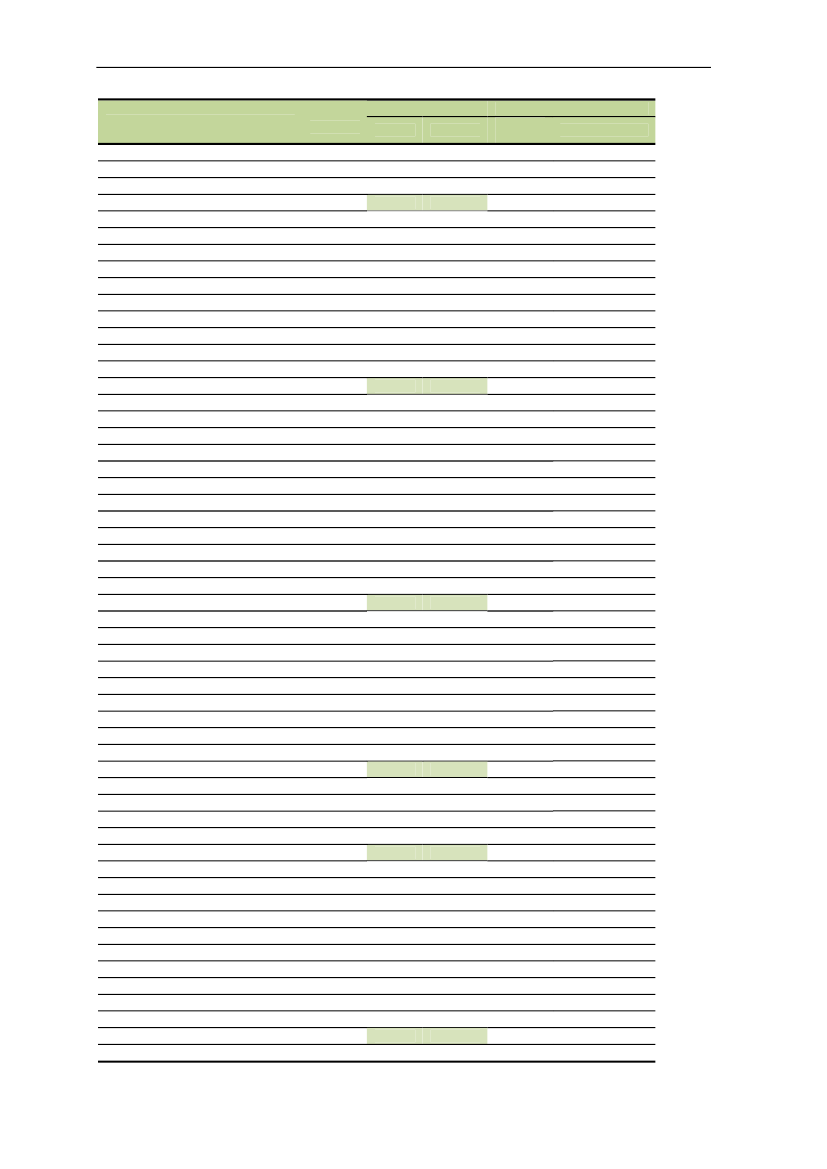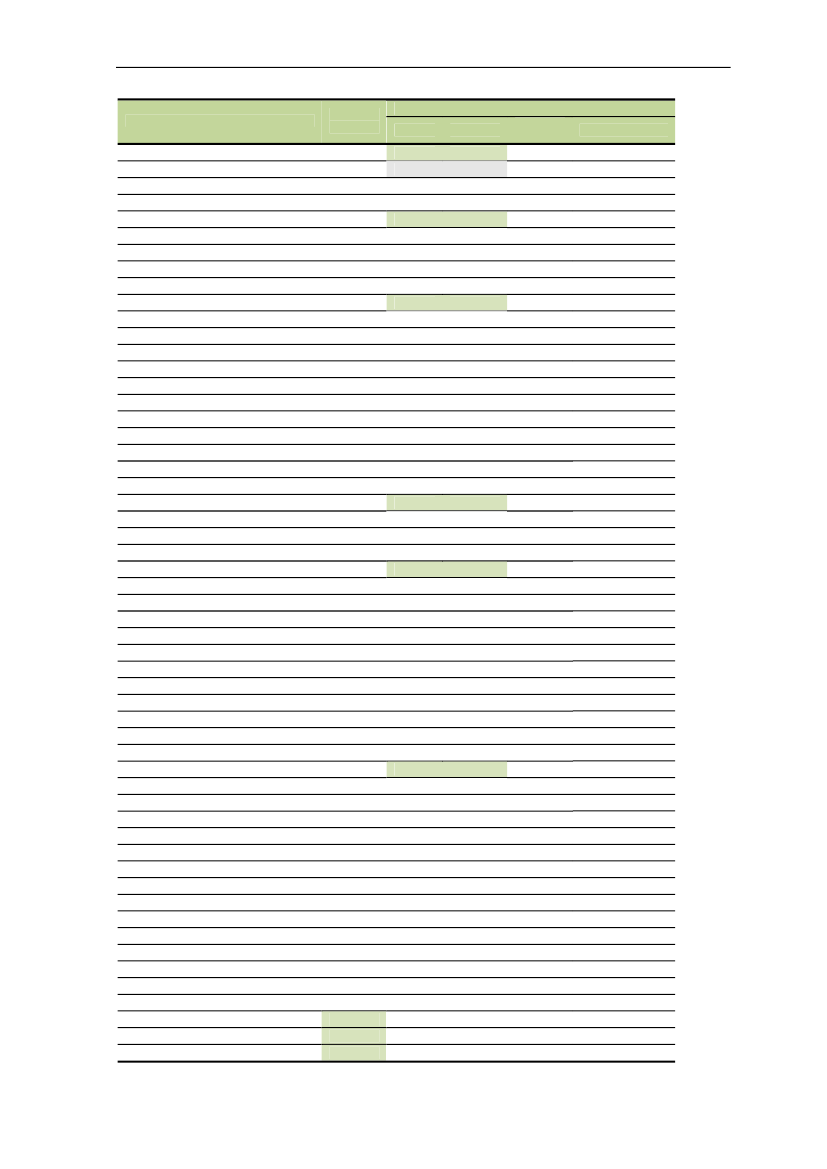Dansk Interparlamentarisk Gruppes bestyrelse 2009-10
IPU Alm.del Bilag 3
Offentligt



































































































TABLE OF CONTENTSPage(s)MEETINGS AND OTHER ACTIVITIES121stAssembly of the Inter-Parliamentary Union1. Opening of the Assembly .......................................................................................................2. Participation ..........................................................................................................................3. Choice of an emergency item ................................................................................................4. Debates and decisions of the Assembly and of the IPU Committee on United Nations Affairs ..185thSession of the Governing Council1. Membership of the Inter-Parliamentary Union ........................................................................2. Financial situation of the IPU .................................................................................................3. Programme and budget for 2010 ...........................................................................................4. Cooperation with the United Nations system .........................................................................5. Consolidation of the reform of the IPU …………………….. ...................................................6. Preparation of the 3rdWorld Conference of Speakers of Parliament..........................................7. Recent conferences and specialized meetings ........................................................................8. Reports of plenary bodies and specialized committees ...........................................................9. Future inter-parliamentary meetings ......................................................................................10. Election of the Secretary General ...........................................................................................255thSession of the Executive Committee......................................................................................Coordinating Committee of Women Parliamentarians..................................................................Subsidiary bodies and committees of the Governing Council1. Committee on the Human Rights of Parliamentarians ............................................................2. Committee on Middle East Questions ....................................................................................3. Gender Partnership Group ....................................................................................................4455
999101011111111111212131314
Inter-Parliamentary Union – 121stAssembly
Other meetings1. Panel discussion onHIV/AIDS – Universal access to prevention, treatment and care................2. Panel discussion onOur World at War: Challenges for International Humanitarian Law...........3. Panel discussion onHuman rights and the Universal Periodic Review......................................4. Review and follow-up session on action taken by parliaments and the IPUto give effect to the resolutions adopted by the IPU on the global crisis ..................................Other events1. Launch of theMissing PersonsHandbook for parliamentarians ...............................................2. IPU campaign on Violence against Women ...........................................................................ELECTIONS, APPOINTMENTS AND MEMBERSHIP OF THE INTER-PARLIAMENTARY UNIONElections and appointments1. President of the 121stAssembly of the Inter-Parliamentary Union ............................................2. Vice-Presidents of the Inter-Parliamentary Union ...................................................................3. Secretary General ..................................................................................................................4. Executive Committee ............................................................................................................5. Committee on Middle East Questions ....................................................................................6. Group of Facilitators for Cyprus ...............................................................................................7. Internal auditors for the 2010 ................................................................................................Membership of the Inter-Parliamentary Union..............................................................................AGENDA, RESOLUTIONS, VOTES AND OTHER TEXTS OFTHE 121stASSEMBLY OF THE INTER-PARLIAMENTARY UNIONAgenda...........................................................................................................................................
151515161717
1818181818181819
20
Emergency item•Results of the roll-call vote on requests for the inclusion of an emergency itemin the agenda of the Assembly ............................................................................................. 21-22•Resolution:Parliamentary action to ensure global food security.............................................23REPORTS, DECISIONS, RESOLUTIONS AND OTHER TEXTSOF THE GOVERNING COUNCIL OF THE INTER-PARLIAMENTARY UNIONReports, decisions and other texts•Statement by the President of the Assembly on the H1N1 influenza virus .............................•Statement by the President of the Assembly on the situation in Honduras ............................•Report by the IPU President on his mission to Israel .............................................................•Budget of the IPU for the year 2010 ....................................................................................•Table of contributions for the year 2010 ..............................................................................•Cooperation with the United Nations system: List of activities undertakenby the IPU between 11 April and 18 October 2009 .............................................................•Report on the sixth meeting of the IPU Advisory Group on HIV/AIDS ..................................Future meetings•Future meetings and other activities .....................................................................................•Agenda of the 122ndAssembly .............................................................................................•List of international organizations and other bodies invited to followthe work of the 122ndAssembly as observers ........................................................................
27272830333740
444849
2
Inter-Parliamentary Union – 121stAssembly
Resolutions concerning the human rights of parliamentarians•••••••••••••••Ms. Malalai Joya, of Afghanistan ...........................................................................................Mr. Shah Ams Kibria, of Bangladesh .....................................................................................Sheikh Hasina, of Bangladesh ...............................................................................................Mr. Victor Gonchar, of Belarus .............................................................................................Eight parliamentarians of Burundi .........................................................................................Mr. Pasteur Mpawenayo, Mr. Hussein Radjabu, Mr. Théophile Minyurano and Mr. GérardNkurunziza, of Burundi ........................................................................................................Ms. Mu Sochua, of Cambodia ..............................................................................................Ten parliamentarians of Colombia ........................................................................................Thirteen parliamentarians of the Democratic Republic of the Congo .....................................Mr. Jaime Ricaurte Hurtado González and Mr. Pablo Vicente Tapia Farinango, of Ecuador ...Fifty-six parliamentarians of Ecuador ....................................................................................Eleven parliamentarians of Eritrea .........................................................................................Mr. Mohammed Al-Dainy, of Iraq ........................................................................................Mr. Gibran Tueni, Mr. Walid Eido, Mr. Antoine Ghanem and Mr. Pierre Gemayel,of Lebanon ..........................................................................................................................Mr. Lantoniaina Rabenatoandro, Mr. Henri Randrianjatovo, Mr. Mamisoa Rakotomandimby,Mr. Raymond Rakotozandry, Mr. Randrianatoandro Raharinaivo and Ms. Eliane Naïka,of Madagascar .....................................................................................................................Mr. Zorig Sanjasuuren, of Mongolia ......................................................................................Twenty-two parliamentarians of Myanmar ............................................................................Mr. Marwan Barghouti, of Palestine ......................................................................................Mr. Ahmad Sa'adat, of Palestine ...........................................................................................Thirty-seven parliamentarians of Palestine ............................................................................Mr. Abdel Aziz Dweik, of Palestine ......................................................................................Mr. Saturnino Ocampo, Mr. Teodoro Casiño, Ms. Liza Maza and Mr. Rafael Mariano,of the Philippines .................................................................................................................Mr. Antonio F. Trillanes, of the Philippines ...........................................................................Mr. Leonard Hitimana, of Rwanda .......................................................................................Ten parliamentarians of Sri Lanka .........................................................................................Mr. Joseph Parararajasingham, of Sri Lanka ..........................................................................Mr. Nadarajah Raviraj, of Sri Lanka ......................................................................................Mr. Thiyagarajah Maheswaran, of Sri Lanka ..........................................................................Mr. D.M. Dassanayake, of Sri Lanka .....................................................................................Mr. Kiddinan Sivanesan, of Sri Lanka ....................................................................................Mr. Mehmet Sin§ar, of Turkey...............................................................................................Mr. Roy Bennett, Mr. Job Sikhala, Mr. Tendai Biti, Mr. Paul Madzore and Mr. Nelson Chamisa,of Zimbabwe .......................................................................................................................5153545556576063646566676870
•••••••••••••••••
717475777880838486878991929495959798
3
Inter-Parliamentary Union – 121stAssembly
121stAssembly of the Inter-Parliamentary Union1. Opening of the AssemblyThe 121stAssembly of the Inter-Parliamentary1Union opened its proceedings at the GenevaInternational Conference Centre in the morning ofMonday, 19 October 2009. The President of theIPU, Dr. Theo-Ben Gurirab, welcomed theparticipants and declared the 121stAssemblyofficially open.He was subsequently electedPresident of the Assembly and the Vice-President oftheExecutiveCommittee,Ms.ElissavetPapademetriou (Greece), was elected Vice-President.At its last sitting, the Assembly endorsed twostatements: one on the H1N1 virus and another onthe situation in Honduras (see page 27)2. ParticipationDelegations of the following 123 MemberParliaments took part in the work of the2Assembly: Afghanistan, Algeria, Andorra, Angola,Argentina, Armenia, Australia, Austria, Bahrain,Bangladesh, Belarus, Belgium, Benin, Bolivia,Bosnia and Herzegovina, Brazil, Bulgaria, BurkinaFaso, Burundi, Cambodia, Cameroon, Canada,Chile, China, Colombia, Costa Rica, Côte d'Ivoire,Croatia, Cuba, Cyprus, Czech Republic, DemocraticRepublic of the Congo, Denmark, DominicanRepublic, Ecuador, Egypt, El Salvador, Estonia,Ethiopia, Finland, France, Gabon, Germany, Ghana,Greece, Hungary, Iceland, India, Indonesia, Iran(Islamic Republic of), Iraq, Israel, Italy, Japan,Jordan, Kazakhstan, Kenya, Kuwait, Lao People'sDemocratic Republic, Latvia, Lesotho, Liberia,Liechtenstein, Lithuania, Malaysia, Maldives, Mali,Malta, Mauritania, Mexico, Monaco, Mongolia,Namibia, Nepal, Netherlands, New Zealand,Nigeria, Norway, Oman, Pakistan, Palau, Palestine,Panama, Peru, Philippines, Poland, Portugal, Qatar,Republic of Korea, Romania, Russian Federation,San Marino, Sao Tome and Principe, Saudi Arabia,Senegal, Serbia, Singapore, Slovakia, Slovenia,Somalia, South Africa, Spain, Sri Lanka, Sudan,Suriname, Sweden, Switzerland, Syrian ArabRepublic, Thailand, The former Yugoslav Republicof Macedonia, Togo, Turkey, Uganda, Ukraine,United Arab Emirates, United Kingdom, United1
Republic of Tanzania, Uruguay, Venezuela, VietNam, Yemen, Zambia and Zimbabwe.The following Associate Members also took part inthe Assembly: the East African Legislative Assembly,the Inter-Parliamentary Committee of the WestAfrican Economic and Monetary Union, the LatinAmerican Parliament and the ParliamentaryAssembly of the Council of Europe.Observers included representatives of: (i) UnitedNations system: United Nations, United NationsConferenceonTradeandDevelopment(UNCTAD), International Labour Organization(ILO), Food and Agricultural Organization of theUnited Nations (FAO), United Nations Children'sFund (UNICEF), World Health Organization(WHO); (ii) World Bank, Organization for theProhibition of Chemical Weapons (OPCW),Preparatory Commission for the ComprehensiveNuclear-Test-Ban Treaty Organization (CTBTO) andWorld Trade Organization (WTO); (iii) League ofArab States, African Parliamentary Union (APU),Arab Inter-Parliamentary Union (AIPU), AsianParliamentary Assembly (APA), Assembly of theWestern European Union (WEU), Association ofSenates, Shoora and Equivalent Councils in Africaand the Arab World (ASSECAA), Confederation ofParliaments of the Americas (COPA), Inter-Parliamentary Assembly of the Commonwealth ofIndependent States (CIS), Inter-ParliamentaryAssembly of the Eurasian Economic Community(EURASEC), Inter-Parliamentary Commission of theEconomic and Monetary Community of CentralAfrica (CEMAC), Maghreb Consultative Council,Parliamentary Assembly of the Black Sea EconomicCooperation (PABSEC), Parliamentary Assembly ofthe Mediterranean (PAM), Parliamentary Assemblyof the Union of Belarus and the Russian Federation,Parliamentary Union of the OIC Member States(PUOICM),SouthernAfricanDevelopmentCommunity(SADC)ParliamentaryForum,Transitional Arab Parliament (TAP); (iv) GenevaCentre for the Democratic Control of Armed Forces(DCAF), International Committee of the Red Cross(ICRC), International Federation of Red Cross andRed Crescent Societies (IFRC) and InternationalIDEA.Of the 1,154 delegates who attended the Assembly,519 were members of parliament.Theparliamentarians included 24 Speakers, 41 DeputySpeakers and 164 women parliamentarians (31.6%).3. Choice of an emergency item(Item 2)
2
The resolution and reports referred to in this documentand general information on the Geneva session areavailable on the IPU website (www.ipu.org).For the complete list of IPU Members, see page 19.
4
Inter-Parliamentary Union – 121stAssembly
The Assembly had before it two proposals, aconsolidated request for the inclusion of anemergency item submitted by the delegation ofAustralia and the delegation of Uganda, on behalf ofthe African Group, entitledParliamentary action toensure global food security,and a consolidatedproposal presented by the delegation of Oman, onbehalf of the Arab Group and with the support ofthe Islamic Republic of Iran, entitledThe criticalsituation in the Occupied Palestinian Territories andparticularly in Gaza.Following a vote, the proposalpresented by the delegation of Australia and thedelegation of Uganda, on behalf of the AfricanGroup, received the required two-thirds majorityand was added to the agenda as Item 5(see page 21).4. Debates and decisions of the Assembly and ofthe IPU Committee on United Nations Affairs(a) Debate on the emergency itemParliamentary action to ensure global foodsecurity(Item 5)The debate on the emergency item took place inthe afternoon of Monday, 20 October. It waschaired by the Vice-President of the Assembly,Ms. E. Papademetriou (Greece). A total of29 speakers from 28 parliamentary delegations andone observer took part.During the debate, speakers expressed theirconcern over the various factors that directlyaffectedfoodsecurity,underliningtheconsequences of land degradation resulting fromdesertification and floods, and environmentaldegradation caused by climate change. They tooknote of the importance of the forthcoming ClimateChange Conference in Copenhagen (COP15) andinvited parliamentarians to be present at the eventorganized by the IPU on that occasion.Many speakers underlined the importance ofinvestment in scientific research to supportagriculture in facing the growing food demand.Others drew attention to the danger of distortionaryagricultural policies. There was a need to help therural poor, men and women alike, to acquiretechnology, and gain access to a fair and openbanking system, including micro financing.The broad range of concerns expressed during thedebates were reflected in the draft resolutionprepared by a drafting committee, composed ofmembers of the delegations of Australia,Bangladesh, Burkina Faso, Cambodia, Germany,
India, Malaysia, Sudan, Turkey, Uganda, Uruguayand Venezuela. The drafting committee appointedMr. J.P. Winkler (Germany) as its president andMs. N. Ahmad (Malaysia) as its rapporteur.Following an amendment moved by the delegationof Venezuela, the draft resolution was adopted byconsensus by the Assembly on Wednesday,21 October (see page 23). A reservation wasentered by the delegation of India.(b) Report of the IPU Committee on United NationsAffairs (Item 4)The subject of food security was taken up onceagain in the IPU Committee on United NationsAffairs. The Committee received Mr. J. Diouf,Director-General of the Food and AgricultureOrganization (FAO) of the United Nations andheard a comprehensive presentation on the currentfood crisis and preparations for the World Summiton Food Security, scheduled to take place in Romein November. In the context of the Rome Summit,the IPU and the Italian Parliament would be holdinga parliamentary meeting on 13 November, whichmembers were encouraged to attend. TheDirector-General’s presentation was followed by aquestion-and-answer session, which includedsuggestions for possible action and cooperation byparliaments.The Committee began its work by taking stock ofthe responses received to the IPU Questionnaire onhow parliaments organize their work vis-à-vis theUnited Nations. The Survey, mandated by theCommittee following its previous session in October2008, aimed to determine the manner in whichparliaments related to the UN system, specialmeetings and major negotiating processes at theUnited Nations, and in UN country offices.To date, 65 responses had been received, and apreliminary examination had already identified aseries of good practices and recommendations thatshould be shared with the full IPU membership. AllIPU Member Parliaments were encouraged tourgently submit their responses so that the reviewcould be finalized and circulated. That evaluationwould feed into the preparatory process for the3rdWorld Conference of Speakers of Parliament.The Committee began a discussion aboutcooperation between regional parliamentaryorganizations and the United Nations. It wasrecalled that in the 2005 Declaration of Speakers ofParliaments, the IPU was invited to cooperate moreclosely with regional parliamentary associations and
5
Inter-Parliamentary Union – 121stAssembly
organizations with a view to enhancing coherenceand efficiency in global and interregionalparliamentary cooperation. Although there werevarious activities at the national and regional levels,the Committee believed that there was scope forcloser cooperation on policy with both regional andsubregional parliamentary organizations.The Committee heard a presentation on the statusof United Nations reform and the report of themission by its Advisory Group to Viet Nam earlier inthe year. Such IPU missions to pilot countriesundertaking One UN reform had enhanced the roleof parliaments in developing national strategies andhad established better mechanisms for parliamentsto engage in international assistance andcooperation. The Committee welcomed the report,underscoring the need for a more coherentapproach to aid delivery, which in turn should leadto greater effectiveness, transparency andaccountability of UN operations. The Committeeurged its Advisory Group to continue with such fieldmissions and to report on progress.The Committee heard a briefing from the DeputyExecutive Secretary of the United NationsFramework Convention on Climate Change(UNFCCC) Secretariat on the negotiations onclimate change which, it was hoped, would lead toa firm agreement at the UN Climate ChangeConference(COP15)inCopenhagen.Parliamentarians pledged to engage with theauthorities of their country to tackle remaininghurdles and join their national delegations to theCOP15. A parliamentary meeting would also beconvened by the IPU and the Danish Folketing inCopenhagen on 16 December.The Committee reviewed the implementation of theIPU’s recent resolutionon Parliamentary oversight ofState policies on foreign aid,and discussed the IPU’sinvolvement with the Development CooperationForum established by the United Nations Economicand Social Council. A senior United Nations officialand the Director of the International BudgetPartnership joined the Committee. The latterpresented the results of the recent Study on the roleof parliaments in budget transparency andaccountability.The Committee recommended that: parliamentsensure that national budgetary accounts were madepublic and follow up annual audit reports; strategicpartnerships were developed between parliaments,civil society and supreme audit institutions;parliaments should contribute to a gradual changein donor practices, with a view to incorporating
international aid in the regular budgetary exercise;and parliaments should be involved in draftingcodes of practice for greater budget transparency.The Committee welcomed recent IPU initiatives inthe area of aid effectiveness. Those included theIPU’s contribution to a regional initiative in Asia,called the Capacity Development for DevelopmentEffectiveness Facility, which aimed to buildknowledge and capacities for greater developmenteffectiveness. An expert study commissioned by theIPU to review parliamentary involvement indevelopment policies and programmes in Zambiaand the United Republic of Tanzania had alsoyielded promising results.The IPU should prepare a handbook forparliamentarians on aid effectiveness. It was alsosuggested that additional case studies, representingwider regional representation, would be useful.Moreover, the IPU should assess the needs ofparliament more systematically to measure thetraining they required in order to better analysepublic finances, budgets and developmentprogrammes.As the United Nations was approaching its65thanniversary, the Committee reiterated its strongsupport for the mission, principles and objectives ofthe United Nations, in particular the need for allMember States to ensure full compliance withinternational law.(c) Panel discussion (First Standing Committeesubject item at 122ndAssembly:Cooperation andshared responsibility in the global fight againstorganized crime, in particular drug trafficking,illegal arms sales, human trafficking andcross-border terrorism(Item 3(a)The panel discussion took place in the morning of20 October. It was chaired by Mr. T. Boa (Côted’Ivoire), President of the Standing Committee onPeace and International Security. The co-Rapporteurs, Ms. M.T. Ortuño (Mexico) and Mr. A.Wiriyachai (Thailand), presented their draft report,which focused on the current situation of organizedcrime in the world, the existing and developinginternational legal framework, the challenges ahead,and the role and responsibility of parliaments andparliamentarians. Participants also heard keynotepresentations from Mr. P. Lapaque, Chief of theOrganized Crime and Anti-Money Laundering Unitof the United Nations Office on Drugs and Crime(UNODC) and Mr. A. Steen, Chairman of the British
6
Inter-Parliamentary Union – 121stAssembly
All-Party Parliamentary Group on Trafficking ofWomen and Children.The panel was opened with a video presentation,which highlighted the sheer magnitude of organizedcrime around the world and the devastating effect ithad on hundreds of thousands of innocent victims.Moving testimonies by victims of human traffickingunderscored the extent of their suffering, but alsothe indifference with which their plight was treatedby society at large. As Mr. A. Steen pointed out,hundreds of conferences were being held to discusshuman trafficking, but few parliamentarians hadactually ever met or talked to a victim of humantrafficking. That was indicative of a certaindisconnection between the work of public officialsand lawmakers and the brutal reality on the ground.A substantive discussion followed, with some40 legislators from as many parliaments, as well asthe representative of the International Institute forDemocracy and Electoral Assistance (IDEA), takingthe floor. Participants presented their nationalexperiences in combating the various forms oforganized crime. They recognized the need formore concerted and intense action in dealing withthat growing phenomenon in practically allcountries. As one participant observed, nationallegislation and response mechanisms were movingat a snail’s pace, compared to the speed with whichnew and ever more aggressive forms of organizedcrime were being developed.Public opinion was all too often unaware of theorganized nature of human trafficking, a modern-day form of slavery. One participant drew attentionto statistics according to which there were twice asmany victims of human trafficking today than therewere slaves in shackles during the 350 years ofslavery. New or re-emerging forms of organizedcrime included piracy, abduction of children,domestic slavery and bartering, such as oil forweapons. The nexus between organized crime andpolitical life also needed to be carefully examined.Women and children tended to be the choicevictims of the various networks of organized crime.With tighter security measures in place, more andmore women were being used as shields to defendthe real perpetrators of organized crime. They werethe ones going to jail instead of the main ringleadersfor prostitution, and they were used as pawns tocarry out cross-border acts of terrorism and drugtrafficking, roles traditionally reserved for men. All ofthose facts had a devastating impact on the world’smost vulnerable sectors of society, as well as onfamilies and communities.
Victims needed to be protected, assisted andrehabilitated and under no circumstances treated ascriminals. While in many societies good laws werein place, much more needed to be done in terms ofreal and effective implementation. The experienceof the UK Parliament showed how a small group oflegislators could take very effective action,overseeing government response and demandingmore robust measures to tackle organized crime. Aregional network of parliamentary action groupsagainst human trafficking had been set up as thephenomenon knew no boundaries. The importanceof other regional initiatives, such as joint databasesand shared information and monitoring systems,could not be underestimated.Participants agreed that in order to combatorganized crime it was necessary to: (1) overcomethe widespread indifference towards the victims oforganized crime; (2) draw inspiration from the goodpractices and bold legislation that had beendeveloped by many parliaments; and develop jointaction and a strategic approach to the fight againstorganized crime.(d) Panel discussion (Second Standing Committeesubject item at 122ndAssembly:The role ofparliaments in developing South-South andTriangular Cooperation with a view toaccelerating achievement of the MillenniumDevelopment Goals (Item3(b)The panel discussion took place in the morning of20 October, with Mr. P. Martin-Lalande (France),President of the Second Standing Committee, in theChair. The co-Rapporteurs, Mr. F.-X. de Donnea(Belgium) and Mr. G. Lubinda (Zambia) presented adraft report on the item with a view to fostering amore formal debate during the 122ndIPU Assemblyin Bangkok. They pointed out that the subject ofSouth-South cooperation was so vast that anyattempt to make a comprehensive presentationwould necessarily be lengthy.That opinion was echoed by Mr. V. Yu, Coordinatorof the Global Governance for DevelopmentProgramme at the South Centre, who addressed thepanel as an invited expert. The Centre was one ofthe leading intergovernmental think tanks ofdeveloping countries, providing quality technicalanalysis based on a political message of South-Southsolidarity and justice-based ideology.Following the three introductory statements, anexchange of views took place, with a total of36 delegates taking the floor, nearly one third ofwhom were women. The delegates agreed that
7
Inter-Parliamentary Union – 121stAssembly
South-South cooperation was an essential ingredientin the new development agenda and that it offeredviable opportunities for developing countries topursue the objective of sustained economic growth.That was all the more true in the context of theglobal economic crisis, when the South was facingadditional constraints and challenges.Parliaments of both developed and developingcountries should be proactive in building supportfor the innovative North-South developmentpartnership models that had been agreed by theUnited Nations in Monterrey in 2002 andreaffirmed in Doha in 2008.Regional integration as a specific form of South-South cooperation was examined.The freemovement of goods, services, capital and peoplestimulated investment, spurred economic growthand increased South-South trade. The right mix ofregional competition and measured protection wascrucial to smooth integration into the global tradingsystem. It also helped make regional integration aneffective vehicle for growth and accelerated povertyreduction.The weaker countries especiallyencountereddifficultiesassociatedwithglobalization, which made regional integration amandatory and unavoidable approach.Both the draft report and the panel discussionserved as reminders that legislative support forSouth-South cooperation by parliaments wasindispensable for achieving the MillenniumDevelopment Goals, in particular as they related topoverty reduction.(e) Panel discussion (Third Standing Committee(subject item at 122ndAssembly:Youthparticipation in the democratic process(Item 3(c)The panel discussion took place in the afternoon of20 October with Mr. Y. Zhumabayev (Kazakhstan),First Vice-President of the Standing Committee onDemocracy and Human Rights, in the Chair. Theco-Rapporteur, Ms. M. Lugaric (Croatia), presentedher draft report and invited participants to makeproposals to enrich the final rapport and the draftresolution, which she was currently drafting. Theparticipants also heard presentations by Ms. N.Shepherd, Chief of the United Nations Programmeon Youth, Mr. A. Guerrero, Director of Partnershipsat the United Nations Children’s Fund (UNICEF)and Mr. R. Amalvy, Director of ExternalCommunication, World Scout Bureau. During thecourse of the debate, 37 delegates took the floor.
Young people had a right to participate in decision-making. One quarter of the world populationshould not be excluded from decision-makingprocesses. The challenge was not only to guaranteeyouth the right to participate but also to guaranteethe effective and efficient enjoyment of that right.Education that fostered participation was important.So were promoting a culture of inclusion from anearly age, building capacity, providing youth withthe means to take action and youth representationin executive bodies.Participation by youth in policy and decision-making and in the management of public affairsallowed them to contribute with a fresh perspectiveand make sure that their needs were taken intoaccount and that laws, policies and programmesmet those needs. Contrary to what young peopleoften heard, youth were not only the future, theywere also the present. Parliamentary action shouldcentre on both the fight against the exclusion ofyouth from political life and the apathy that theydisplayed towards the political process.While the age group that corresponded to thecategory "youth" as defined by the United Nationsran from 15 to 24 years, preparations for youthparticipation should start much earlier andparticipation extended much longer. Efforts tostrengthen youth participation in politics could drawinspiration from the policies and strategiesimplemented to strengthen women’s participationin politics. Young women faced discrimination ontwo fronts - as youth and as women.Ensuring greater participation by youth inparliament could be achieved by making sure thatthe minimum age for voting and the minimum ageof eligibility for running for office was one and thesame. If young persons were considered able tovote, they should also be considered able to take upa seat in parliament. Quotas could also be adoptedto guarantee a minimum number of young peoplein parliament.Regardingparliamentarystructures,theestablishmentandproperfunctioningofparliamentary bodies dealing with youth issues wasan important means of ensuring that their needswere taken on board. Parliaments must guaranteethe participation of youth in the work of theircommittees. A sound and modern communicationstrategy, based on new communication tools,should be adopted by parliaments with a view toinforming and consulting youth.Cooperationshould also be forged among parliaments, youthparliaments and youth associations.
8
Inter-Parliamentary Union – 185thSession of the Governing Council
The IPU was urged to incorporate youthparticipation in its activities, along the lines of themeasures that had been taken to promote women’sparticipation. It should require parliaments toinclude youth in their delegations. Moreover, itshould set up a mechanism, as had been done for
women, that would allow youth parliamentarians tomeet and make a contribution to the work of theOrganization for example by holding an alternativeAssembly of Young Parliamentarians in the wings ofstatutory IPU Assemblies.
185thSession of the Governing Council1. Membership of the IPUAt its sitting on 19 October, the Governing Councilsuspended the Parliament of Niger. It condemnedthe unconstitutional dissolution of the Parliament,deplored the persecution and arrest of its membersand requested the IPU Committee on the HumanRights of Parliamentarians to examine theirsituation.At its sitting on 21 October, the Council decidedthat unless payments were received before the endof the year, the membership of Papua New Guineaand Somalia would be automatically suspendedeffective 1 January 2010, for the accumulation ofarrears in contributions. There were no requests foraffiliation and the IPU thus currently comprised152 Member Parliaments.At its second sitting, the Governing Council, seekingto dispel uncertainties about the representation atthe Assembly of the Parliament of Palestine,endorsed a statement by the President that pendingany major developments in the OccupiedTerritories, the Palestine National Council would betreated on a par with any other IPU Member in allmatters relating to its status as representative ofPalestine at the IPU.The Governing Council agreed that the Secretariatshould write to all those observers which had rarelyor never participated in IPU meetings to gauge theirinterest in remaining observers.2. Financial situation of the IPUThe Governing Council was presented with acomprehensive written report on the financialsituation of the IPU and a list of unpaidcontributions as at 30 June 2009. Four Membershad significant arrears and were subject tosanctions. The Secretary General projected anoperating surplus of CHF 432,000, mostly due tovacant posts, savings in the areas of transportation,translation, editing and publishing for the120thAssembly, as well as to a favourable exchangerate with the US dollar.On the recommendation of the ExecutiveCommittee, the Council agreed that the followingactivities be carried out within the approved budgetceiling for a total amount of CHF 150,000:(a) for the Human Rights Programme, theorganization of a seminar in Bogotá, Colombia,to contribute to solving the conflict between theColombian Congress and other State powers,and a mission to Madagascar to help solve thecases of certain parliamentarians;(b) for the Gender Equality in Politics andChildren's Rights programmes, the organizationof a regional seminar on violence againstwomen and migration in Europe, a nationalseminar in Rwanda on CEDAW, the productionof a document contributing to the Beijing + 15appraisal to take place early in 2010, theassistance of a senior Canadian judge for thegender equality programme for a period ofthree months, and the organization of a meetingon violence against children.3. Programme and budget for 2010The Council received the budget proposal for 2010and a summary of planned activities andrequirements for 2010-2012.The SecretaryGeneral, reporting on the discussions of theExecutive Committee, which had unanimouslyendorsed the document, noted that the budget wasessentially a zero-growth budget considering theincreases in expenditures the organization was toincur during 2010 in relation to the organization ofthe 3rdWorld Conference of Speakers of Parliamentand the increased security measures required forthe Geneva Assembly.Council members commented on the need to carryout a more realistic budgeting, particularly inrelation to activities funded through voluntary
9
Inter-Parliamentary Union - 185thSession of the Governing Council
contributions. They also made several suggestionsfor greater savings in IPU operations and requestedmore detailed spending estimates.The Governing Council also heard therecommendations of the Executive Committeefollowing the re-convening of the Working Groupon Assessed Contributions1,which had beenmandated to undertake a mid-term review of theIPU scale of contributions to ensure its alignmentwith the UN scale and to examine steps that couldbe taken to reduce the burden of the parliaments ofleast developed countries and small islanddeveloping States (SIDS).The new scale of contributions presented to theCouncil included the immediate implementation ofthe contribution targets approved by the Council for2012 for least developed countries and the weakestSIDS, thereby substantively reducing the level oftheir contributions. The cost of implementing thatdecision was to be borne by the Working CapitalFund. The contributions for the remaining Membersreflected percentages which had been approvedpreviously by the Council for 2010. The WorkingGroup was to reconvene in 2011 in order to reviewthe scale of contributions for the period 2011-2012.At the end of the debate, on the recommendationof the Executive Committee, the Governing Councilapproved the new scale of contributions and the2010 budget as submitted by the Secretary General.It approved gross operating expenses ofCHF 18,692,300, which required an overallincrease of 2 per cent in assessed contributions, andcapital expenditures of CHF 100,000.As inprevious years, the Council authorized the offsettingof carbon emissions related to heating and stafftravel and noted that the Secretary General hadsubmitted a proposal in October 2009 to the IPU'smain donors to offset carbon emissions fromactivities funded through voluntary funds.The approved budget and scale of contributions for2010 are presented on pages 30 and 33.4. Cooperation with the United Nations SystemThe Governing Council took stock of recentdevelopments in IPU-United Nations cooperation,and was informed of a variety of activities carried
out in collaboration with or in support of the UnitedNations (see page 37).The Council received a presentation on the workand objectives of a recent UN initiative, the Allianceof Civilizations, which aimed to improveunderstanding across cultures and religions and helpcounter polarization and extremism. The Councilapproved the proposal for the IPU to strengthen itscooperation with the Alliance of Civilizations, whichinter alia invited legislators to attend the 2010Forum of the Alliance of Civilizations in Brazil(28-29 May 2010) and convene a parliamentarysession during the Forum.The Council was informed of the status of the IPUQuestionnaire on how parliaments organized theirwork vis-à-vis the United Nations. All MemberParliaments were urged to submit their response assoon as possible so that a comprehensive reportcould be presented to the 3rdWorld Conference ofSpeakers of Parliament and the 2010 debate at theUnited Nations on cooperation between the UnitedNations, national parliaments and the IPU.All Member Parliaments were encouraged to attendthe 2009 Joint Parliamentary Hearing at the UnitedNations, to be held on 19 and 20 November at UNHeadquarters in New York, under the chairmanshipof the President of the IPU and the President of theUN General Assembly. The Hearing would examinethe topicThe Way Forward - Building politicalsupport and implementing effective responses to theglobal economic crisis.The Council was also informed of forthcomingparliamentary meetings, held in cooperation withthe United Nations or in the context of major UNevents : the World e-Parliament Conference(Washington,D.C.,3-5November),theParliamentary Meeting on the occasion of theWorld Summit on Food Security (Rome,13 November), and the Parliamentary Meeting onthe occasion of the 15thsession of the Conferenceof the Parties to the United Nations FrameworkConvention on Climate Change (Copenhagen,16 December).5. Consolidation of the reform of the IPUThe Governing Council heard reports from thegeopolitical groups on their deliberations regardingthe reforms carried out at the IPU.Severalsuggestions were made on improving the secondAssembly of the year. Members also proposedmeasures to make the discussions more interactive.
1
Composed of representatives of the Parliaments ofBangladesh, Benin, Brazil, Egypt, France, Iran (IslamicRepublic of), Ireland, Japan, Kenya, Mali, Mexico,Mongolia, New Zealand, Thailand, Uganda, Ukraine,United Kingdom, Uruguay and Zambia.
10
Inter-Parliamentary Union – 185thSession of the Governing Council
Several of the members commented on theCommittee on United Nations Affairs. While somefelt that it was too soon to draw any conclusions,others suggested that the work of the Committeecould be carried out better by its Advisory Group.The full set of recommendations submitted duringthe discussions would be considered by theExecutive Committee, which would report back tothe Governing Council at its next session.6. Preparation of the 3rdWorld Conference ofSpeakers of ParliamentThe Governing Council was informed that thePresident of the IPU had established a PreparatoryCommittee of some twenty Speakers of Parliamentto assist in organizing the 3rdWorld Conference ofSpeakers of Parliament.The PreparatoryCommittee had held its first meeting at IPUHeadquarters in Geneva on 16 and 17 July.The Preparatory Committee had decided that the3rdWorld Conference of Speakers of Parliamentwould take place at the United Nations Office inGeneva from 19 to 21 July 2010. The theme of theConference would beParliaments in a world ofcrisis: securing global democratic accountability forthe common good.The next meeting of the Preparatory Committeewas scheduled to take place at UN Headquarters inNew York from 16 to 17 November, just prior tothe Parliamentary Hearing at the United Nations.7. Recent conferences and specialized meetingsThe Governing Council took note of the results ofthe regional meeting for Twelve Plus parliaments onthe rights of persons with disabilities (seethehttp://www.ipu.org/splz-e/disabilities09.htm),Parliamentary Conference on the Global EconomicCrisis(seehttp://www.ipu.org/splz-e/finance09.htm),the Fifth Meeting of WomenSpeakersofParliament(seethehttp://www.ipu.org/splz-e/mws09.htm),Regional Seminar for Latin American countries onThe role of parliaments in confronting violenceagainst children(seehttp://www.ipu.org/splz-e/costarica09.htm),the Regional Conference on thecontribution of parliament to the nationalreconciliation and institutional reform agenda (seeCL/185/10(c)-R.1), the Parliamentary Conference on
Democracy in Africa (seehttp://www.ipu.org/splz-e/gaborone09.htm),the Fourth Conference formembers of parliamentary committees on the statusof women and other committees dealing withgender equality (seehttp://www.ipu.org/splz-e/gender09.htm),and the Parliamentary Panelwithin the framework of the Annual WTO PublicForum(seehttp://www.ipu.org/splz-e/wto-forum09.htm).8. Reports of plenary bodies and specializedcommitteesAt its sitting on 21 October, the Governing Counciltook note of the reports on the activities of theCoordinatingCommitteeofWomenParliamentarians, the Committee on the HumanRights of Parliamentarians, the Committee onMiddle East Questions, the Gender PartnershipGroup (see pages 12 to 14), and the AdvisoryGroup on HIV/AIDS (see page 40).9. Future inter-parliamentary meetingsThe Governing Council approved the venues for thetwo Assemblies of 2012, which, in a break withusual practice, would both be held away fromGeneva. The April Assembly would be held inKampala, Uganda, and the October Assembly inQuebec City, Canada.In addition to meetings already approved, theGoverning Council approved the future meetingslisted on pages 44 to 47, for which approval hadbeen pending.10. Election of the Secretary GeneralOn the recommendation of the ExecutiveCommittee, the Governing Council decided througha secret ballot to reappoint the incumbent SecretaryGeneral, Anders B. Johnsson, for a fourth mandatefrom 1 July 2010 to 30 June 2014. See page 18 fordetails of the vote.The Governing Council also took note of theproposal of the Executive Committee to prepare anamendment to the Rules spelling out the procedurefor electing the Secretary General of the Inter-Parliamentary Union. The amendment would besubmitted to the Council at its next session.
11
Inter-Parliamentary Union – 255thSession of the Executive Committee
255thSession of the Executive CommitteeThe Executive Committee held its 255thsession inGeneva on 16, 17 and 20 October 2009. ThePresident chaired the meetings. The following titularand substitute members took part in the session:Ms. E. Papademetriou, Vice-President of theCommittee (Greece), Ms. Z. Drif Bitat (Algeria),Mr. G. Versnick (Belgium), Ms. J. Fotso (Cameroon),Mr. M. Nago (Benin), Mr. J.A. Coloma (Chile),Mr. R. del Picchia (France), Mr. A. Alonso Díaz-Caneja(Mexico),Ms. M.Mensah-Williams(Namibia) substituting for Ms. P. Cayetano(Philippines), Mr. Chin Young (Republic of Korea),Mr. A. Kozlovskiy (Russian Federation), Mr. R.M.K.Al Shariqi (United Arab Emirates) and Mr. N. QuangXuan (Viet Nam) replacing Mr. Ngo Anh Dzung,who had been given a diplomatic appointment. Mr.T. Toga (Ethiopia) was absent.The Executive Committee discussed and maderecommendations on agenda items to be addressedby the Governing Council. The other mattersconsidered by the Committee are summarizedbelow.The Executive Committee discussed the currentstatus of the IPU and the direction it needed to taketo improve that status. The Committee considereda proposal to give the IPU a more lasting legalfoundation in international law not only tostrengthen the organization, but also to set itsrelationship with the United Nations on a firmerfooting. The Committee fully endorsed the thrust ofthe proposal while acknowledging that its fulfilmentwould take considerable time and effort. Itinstructed the Secretary General to set out a morewidely researched proposal based on the opinionsof legal experts.The Committee heard a report on the fiscalsituation of certain staff members residing in France.It noted that negotiations on the problemcontinued. It was informed of changes in theSecretariat, including the recruitment of a newDirector of Support Services and a DevelopmentOfficer.The Committee was informed of the imminentsigning with the Swiss authorities, after protractednegotiations, of a lease for the land on which theIPU Headquarters stood, which would serve as amodel for other organizations in Geneva. Itestablished a small working group composed ofMr. G. Versnick, Mr. M. Nago and Mr. R. delPicchia, who studied and endorsed the document.
Coordinating Committee of Women ParliamentariansThe Coordinating Committee ofWomenParliamentarians met on 18 October 2009. Thesitting was chaired by Ms. P. Cayetano (Philippines),President of the Committee. The meeting served tofollow up the previous Meeting of WomenParliamentarians and to prepare the work of theforthcoming session. The Coordinating Committeealso discussed women's contribution to the work ofthe 121stIPU Assembly.The Committee was briefed on the work andrecommendations of the Gender Partnership Groupand lauded the fact that almost 32 per cent ofdelegates at the Assembly were women, the highestproportion ever reached. It also praised theinclusion of information on gender-specificallocations and objectives in the 2010 budget.A report was presented on follow-up of theFourteenth Meeting of Women Parliamentariansheld in Addis Ababa relating to climate change,sustainable development and women’s economicempowerment. The Committee went on to discussits contribution to the 121stAssembly. It discussedthe draft reports to be debated by each of theAssembly’s three Standing Committee paneldiscussions, highlighting gender-related concernswhich the respective Rapporteurs might wish to takeinto account.Preparations for the Fifteenth Meeting of WomenParliamentarians were also discussed.TheCommittee decided that it would debate thesubject item chosen by the First StandingCommittee for debate at the 122ndAssembly,Cooperation and shared responsibility in the globalfight against organized crime, in particular drugtrafficking, illegal arms sales, human trafficking andcross-border terrorism.It also decided that theMeeting’s afternoon dialogue session between menand women MPs would focus on combating
12
Inter-Parliamentary Union – Subsidiary bodies and committees of the Governing Council
violence against women, with a particular focus onwomen in prisons and immigration detentioncentres.Following a presentation by the representative ofthe United Nations Children’s Fund (UNICEF), theCommittee proposed that the panel discussion forthe 122ndAssembly consider the role of parliamentsin implementing Convention on the Rights of theChild 20 years after its adoption.The Committee was briefed on the IPU’sforthcoming activities related to gender issues,including the IPU campaignParliaments Take Actionon Violence against Women.The members heardabout the different components of the campaignand called on parliaments to mark the InternationalDay for the Elimination of Violence against Women(25 November) by organizing activities such asseminars, conferences and parliamentary hearings.The meeting was informed of the new project ongender-sensitive parliaments. The project sought toexamine ways in which parliaments could bestbecome gender-sensitive institutions and effectively
mainstream gender into their work. Data would becollected through questionnaires, which parliamentsand their members were strongly urged tocomplete.Activities related to maternal health and Countdownto 2015 were highlighted.They included aconference in Uganda in November 2009 and IPU-Partnership for Maternal and Newborn Healthcooperation to document case studies on goodparliamentary practices regarding MillenniumDevelopment Goals 4 and 5. Members were briefedabout the imminent launch of the Arabic version ofthe iKNOWPolitics website, scheduled to take placein Amman on 27 and 28 October 2009 on thethemeThe role of the media and informationtechnology in increasing the number andeffectiveness of women in politics.Lastly, membersheard about activities to provide technical supportto parliaments, in particular a recently completedtwo-year project for women parliamentarians inBurundi, and assistance to the Jordanian Parliamentwith a view to eliminating discriminatory provisionsin the country’s laws.
Subsidiary bodies and committees of the Governing Council1. Committee onParliamentarianstheHumanRightsof2. Committee on Middle East QuestionsThe Committee on Middle East Questions met on19 October 2009. The meeting was chaired by theCommittee President, Ms. A. Clwyd, (UnitedKingdom). Titular members present were Mr. F.-X. de Donnea (Belgium), Mr. H. Raidel (Germany),Mr. L.H. Ishaaq (Indonesia), and Mr. P. Tanbanjong(Thailand),replacingMr. A. Ponlaboot.Thesubstitute members in attendance were Mr. S.Janquin (France), and Mr. H. Alir (Turkey), replacingMr. M. Sahin.The Committee received the IPU President, whodelivered a report on his recent visit to Israel. ThePresident had visited the town of Sderot, which wasfrequently targeted in rocket attacks from the GazaStrip. He had held meetings with a number ofsenior officials, including Speaker Rivlin andPresident Peres. He reported on the warmth withwhich he had been received in Israel. His missionserved to complete the tour of the region he hadbegun in March with visits to the West Bank andGaza and neighbouring Arab countries. (For thereport see page 28).The Committee received two representatives fromthe Humanitarian Dialogue Centre (Geneva) with aview to sharing their experience on matters relating
The Committee on the Human Rights ofParliamentarians held its 127thsession from 17 to20 October 2009. Ms. Z. Benarous (Algeria), Ms. S.Carstairs (Canada), Ms. R. Green (Mexico), Mr. P.Mahoux (Belgium) and Mr. A. Pimentel (Philippines)attended in their capacity as titular members, whileMs. A. Boumediene-Thiery (France) and Mr. K. Jalali(Iran, Islamic Republic of) participated in theircapacity as substitute members.During the session, the Committee examined56 casesin29countriesconcerning250 parliamentarians. It held six meetings withofficial delegations. The Committee also met thevictims or their representatives in six of those cases.The resolutions it presented to the GoverningCouncil for approval concerned the cases of214 parliamentarians in 20 countries. Two of thosecases were submitted for the first time, including thecase from Madagascar. Following the presentationof the draft resolutions to the Council by theCommittee President, Ms. S. Carstairs, Ms. E. Naika,a Malagasy senator, was invited to the podium torecount her personal experience since the coupd’état that had occurred in March in Madagascar.
13
Inter-Parliamentary Union – Subsidiary bodies and committees of the Governing Council
to international mediation. Mr. M. Griffiths, Directorof the Centre, outlined some of the mediation workdone by his institution in different countries, addingthat the political context in countries in conflict wasdifficult for mediators to address, which implied anopportunity for parliamentarians.The greatadvantage for parliamentarians was that they didnot confer recognition on their counterparts; at thesame time, they were people who had force andsignificance. Mr. T. Guldimann, a Middle Eastexpert, elaborated on those themes. The objectiveshould be to work with components of societies inthe region that were ready to push for greaterdemocracy. The Committee agreed that the bestapproach in the first instance would be to try tospeak to the different parties separately aboutsubjects where a common understanding might bepossible. It reiterated its intention to convene themeetings in Geneva rather than elsewhere andinstructed the Committee Secretary to liaise withthe representatives of the Humanitarian DialogueCentre to work out a specific proposal for a meetingin late 2009 or in January 2010.3. Gender Partnership GroupThe Gender Partnership Group held its 24thsessionon 17 October 2009. The participants were Ms. P.Cayetano (Philippines), Mr. R. del Picchia (France),Ms. Z. Drif Bitat (Algeria) and Mr. Ngo Quang Xuan(Viet Nam). Mr. del Picchia acted as moderator.The Group welcomed the fact that 31.6 per cent ofdelegates attending the 121stAssembly werewomen. That was the highest number of womendelegates ever recorded at an Assembly.Ofthe123delegationsattendingthest121 Assembly, 119 were composed of twodelegates or more. Of those, 15 (12.6 per cent)were all-male delegations. Those delegations werefrom the Parliaments of Brazil, El Salvador,Indonesia, Liberia, Malta, Palau, Panama, Poland,Qatar, Republic of Korea, Romania, San Marino,Saudi Arabia, Somalia and Suriname. In addition,there was one all-female delegation from Slovenia.The delegations from the following countries weresanctioned at the Assembly, as they had beenrepresented by a single sex for the third consecutivetime: Malta, Palau, Qatar and Saudi Arabia. TheGroup also recalled the statutory requirement of aminimum of three women members in theExecutive Committee, as five new members wouldbe elected to the Executive Committee during theAssembly.The Group discussed the IPU's budget, which it hadbeen examining from the point of view of genderparity since 2004. It noted that the 2010 budget
contained a strong gender component. The budgetof the Gender Partnership Programme was fundedby a core contribution and extrabudgetary funds.Thanks to the latter, IPU activities on gender issueshad expanded over the years. The extrabudgetaryfunding would be in place until the end of 2010,when it would become essential to ensure sustainedfunding so that Programme activities couldcontinue. Regarding staffing at the IPU Secretariat,the Group was pleased to note that 50 per cent ofthe staff in the professional category was female,including in managerial positions. Overall, 60 percent of the staff in the General Services categorywas female.The Group then considered the status ofparliaments that did not have women members. Sixparliaments had no women members, mainly in thePacific Islands and the Gulf Cooperation CouncilStates. The Group noted the results of the May2009 elections in Kuwait and welcomed theelection of four women members to the parliament,two of whom participated in the Kuwaiti delegationto the Geneva Assembly. The Group underscoredthe importance of keeping track of developments inparliaments with no women members and workingwith geopolitical groups to exert pressure.The Group highlighted two major IPU initiatives.The first was the campaignParliaments Take Actionon Violence against Women.The Group called onall parliaments to mark the International Day for theElimination of Violence against Women -25 November - by organizing activities such asseminars, conferences and hearings in parliament.Parliaments were invited to inform the IPU aboutinitiatives taken so that they could be posted on theIPU website.Relevant documents had beendistributed widely to parliaments and were availableat:www.ipu.org/vaw.The second was the newSurvey on Gender-Sensitive Parliaments. The aim ofthat new research project was to gather primaryinformation on ways in which parliaments couldbest become gender-sensitive institutions andeffectively mainstream gender into their work. Datawould be collected through survey questionnaires,which parliaments and their members were stronglyurged to complete. The questionnaires wereavailable at:www.gender-parliaments.org.On Tuesday, 20 October, the Group held adialogue session with the delegation from Palau tolearn more about the situation of and challengesfacing women in politics. The Group welcomed therecent election of two women to the Senate, andhoped that one of them would be able to attend thenext IPU Assembly.
14
Inter-Parliamentary Union – Other meetings
Other meetings1. Panel discussion onHIV/AIDS - Universalaccess to prevention, treatment and careThe panel discussion provided an opportunity formembers of parliament to discuss the challengesthey faced in achieving universal access to HIVprevention, treatment and care. The DeputyExecutive Director of UNAIDS, Mr. P. De Lay,presented the latest global epidemiological trendsand shared his views on ways in whichparliamentary action could help efforts to containHIV. The report by the UK All-Party ParliamentaryGroup on AIDS -The Treatment Timebomb- waspresented by the Group Chair, Mr. D. Borrow, whotalked about the role of pharmaceuticalmanufacturers and the daunting challenges awaitingthe legislator in the gradual shift from first- tosecond-line drugs.Under the chairmanship of Mr. W. Madzimure(Zimbabwe), the parliamentarians discussedproblems associated with the provision of HIV drugsin their countries, with a particular focus on fundingand distribution challenges in countries with poorinfrastructure. Some warned of rising infection ratesin their countries despite prevention programmes.The need for improved testing services was singledout. The participants agreed that political will wascrucial to achieving universal access and appealedto the IPU to continue to provide opportunities forparliamentarians to exchange share experiences,learn about best practices and support each other.On the issue of HIV, see also the report of the IPUAdvisory Group on HIV/AIDS (page 40).2. Panel discussion onOur world at war:Challenges for international humanitarian lawThe year 2009 marked the 60thanniversary of theGeneva Conventions, which were at the core ofinternational humanitarian law (IHL). The paneldiscussion onOur world at war: Challenges forinternational humanitarian lawwas jointly organizedby the IPU’s Committee to Promote Respect forInternational Humanitarian Law and the ICRC. Itaimed to take stock of achievements regardingrespect for IHL and highlight challenges for nationalimplementation.The debate was moderated by Ms. R. Green(Mexico) and presentations were made byMs. C. Beerli, Vice-President of the ICRC, Ms. B.Gadient, a Swiss MP and President of the IPU’sCommittee to Promote Respect for InternationalHumanitarian Law and Mr. C. Jennings, a WarCorrespondent. Discussions focused on the role ofmembers of parliament in ensuring properenforcement and respect for IHL through theadoption of appropriate legislation, policies andprogrammes and adequate budgets. The need tosensitize parliaments to IHL and engage them inmore widespread communication efforts with civilsociety and constituents in general was raised.In addition to the panel discussion, celebrations forthe 60thanniversary of the anniversary of theGeneva Conventions included the organization ofICRC photo exhibition entitledOur World - At War,which provided an overview of the effects of war onpopulations around the world.3. Panel discussion on human rights and theUniversal Periodic ReviewSome 30 parliamentarians participated in the paneldiscussion on the Universal Periodic Review of theUnited Nations Human Rights Council, which tookplace in the afternoon of 21 October.In March 2006, following increasing criticism of theUnited Nations Commission on Human Rights, theUN General Assembly decided to establish theHuman Rights Council. It was precisely to avoidsuch criticism that the newly established Councilhad been entrusted with the task of undertaking auniversal periodic review of each State’s compliancewith its human rights obligations and commitmentswith a view to ensuring universal coverage andequal treatment of all States. The modalities for thatreview - known as the Universal Periodic Review(UPR) - were adopted by the 47 Council membersin June 2007.The panel discussion provided an opportunity formembers of parliament to familiarize themselveswith the modalities of the UPR and encourageparliamentary involvement in the process. Theywere also able to take stock of the UPR and thecontribution that parliaments had made to it thusfar.The panel discussion was led by Ms. J. de Rivero,Geneva Advocacy Director of Human Rights Watch.Ms. M. Tebourbi, Human Rights ProgrammeOfficer, Universal Periodic Review Section, Officeof the United Nations High Commissioner forHuman Rights, provided a historical background tothe creation of the UPR and explained how it
15
Inter-Parliamentary Union – Other meetings
functioned. Mr. M. Traoré, former Speaker of theNational Assembly of Burkina Faso and Deputy-Chair of the Inter-Parliamentary Committee of theWest African Economic and Monetary Union (IPC-WAEMU), elaborated on ways in which parliamentcould contribute to making the UPR a success,gauged by the extent to which human rights hadimproved at the domestic level. He highlighted thecrucial contributions that parliaments could make atdifferent stages of the process. First, parliamentshould discuss national country reports before theywere submitted to the Human Rights Council.Second, parliamentarians should be part of thedelegation that presented the report to the Councilin Geneva. Third, parliament's role was critical inensuring that the UPR recommendations werefollowed up at the national level. The last twopanellists provided insights and lessons learnedregarding the examination of their own countriesunder the UPR process. Mr. A. Neve, SecretaryGeneral, Amnesty International, Canadian Section,stressed the need for broad national consultations tobe held with all stakeholders in the UPR processand the strong participation of parliament. Mr. J.J.Mwiimbu, a member of the Zambian Parliament,elaborated on the content of Zambia's nationalreport and the recommendations adopted by theHuman Rights Council.4. Review and follow-up session on action takenby parliaments and the IPU to give effect tothe resolutions adopted by the IPU on theglobal crisisThe session, the first of its kind held within theframework of an IPU Assembly, was designed to
review implementation of the two emergencyresolutions on the global financial crisis, adoptedrespectively at the 119thand 120thIPU Assemblies. Itwas also an opportunity to take stock of measurestaken to follow up the Parliamentary Conference onthe Global Economic Crisis, held in Geneva on 7 and8 May 2009 under the auspices of the IPU.
The session was chaired by Mr. P. Martin-Lalande(France), President of the IPU’s Second StandingCommittee on Sustainable Development, Financeand Trade. At his request, the Committee Secretaryenumerated the multiple initiatives taken by the IPUin connection with the global economic crisis. Adetailed analysis of current trends in the field ofemployment was then presented by Mr. R. Torres,Director of the International Institute for LabourStudies, a centre established by the InternationalLabour Office (ILO). His presentation focused onthe Global Jobs Pact launched by the ILO as part ofits campaign to mitigate the effects of the crisis.Adiscussion followed, during which the ILOrepresentative fielded questions from theaudience, providing detailed explanations on theexpected long-term consequences of the crisis, inparticular for labour markets.
The participants agreed that the IPU shouldmaintain its focus on the manifold economic andsocial effects of the current crisis, working in closecooperation with the United Nations system, inparticular with the ILO and the United NationsConference on Trade and Development(UNCTAD).
16
Inter-Parliamentary Union – Other events
Other events1. Launch of theMissing PersonsHandbook forparliamentariansThe IPU and the ICRC launched their latest jointproduct: a handbook for parliamentarians onMissing Persons. The Handbook was presented tomembers of parliament by the Vice-President of theICRC, Ms. C. Beerli, and the IPU President,Dr. T.-B. Gurirab.The Handbook represented the culmination of aprocess initiated by the IPU and the ICRC in 2005,which had led to the adoption in 2006, by the115thIPU Assembly, of a resolution on missingpersons. Since then, both organizations had workedto support parliaments in taking action to preventdisappearances, elucidating cases of missing personsand providing assistance to families of missingpersons. The Handbook was one element of thecommon IPU-ICRC strategy to assist parliaments inthat field. Delegates were invited to make use ofthe practical tool, translate it into their nationallanguages disseminate it and transform itsrecommendations into concrete initiatives thatwould make a difference to missing persons andtheir families. The Handbook is available in Englishand French and can be downloaded from the IPUwebsite at: www.ipu.org/english/pblctns.htm.2. IPU campaign on violence against womenAn information stand was set up during theAssembly to showcase the IPU’s campaignParliaments take action on violence against women.Members of parliament were able to obtaininformation and campaign material to support theirown actions aimed at putting an end to that type ofviolence. Video images were shown of Speakersand Deputy Speakers of Parliament talking abouttheir efforts to implement measures to eliminate ascourge that spared no culture, region or country.The IPU’s campaign places the onus on men andwomen parliamentarians and counts on the supportof parliaments and political leaders to drive change.It also aims to heighten awareness about thecontribution of parliaments to the United NationsSecretary-General’s campaignUNite to End Violenceagainst Women.The Assembly urged IPU Members to mark the10thanniversary of the International Day for theElimination of Violence against Women, on25 November 2009, by organizing a special eventin parliament on that day with a view to making theissue a national priority. For further information,see:www.ipu.org/vaw.
17
Inter-Parliamentary Union - Elections and appointments
Elections and appointments1. President of the 121stAssembly of the Inter-Parliamentary UnionDr. T.-B. Gurirab, President of the Inter-Parliamentary Union, was elected President of theAssembly2. Vice-Presidents of the Inter-ParliamentaryUnionAfrican Group:Mr. M. Nago (Benin)Group of Latin America and the Caribbean:Mr. A. Alonso Díaz-Caneja (Mexico)Arab Group:Mr. Al Shariqi (United Arab Emirates)Asia-Pacific Group:Mr. Chin Young (Republic of Korea)Twelve Plus Group:Mr. G. Versnick (Belgium)Eurasia Group:Mr. M. Vardanyan (Armenia)3. Secretary General of the Inter-ParliamentaryUnionThe Council decided, with 177 votes in favour,45 against and six abstentions cast in a secret ballot,to reappoint the incumbent Secretary General,Mr. Anders B. Johnsson, for a fourth mandate from1 July 2010 to 30 June 2014.4. Executive CommitteeThe Governing Council elected Mr. Ngo QuangXuan (Viet Nam) until October 2011 (when theterm of office of his predecessor from the samecountry expires), and Mr. Nhem Thavy (Cambodia),Mr. K. Örnfjäder (Sweden), Ms. D. Stump(Switzerland) and Mr. M. Vardanyan (Armenia) asmembers of the Executive Committee untilOctober 2013.5. Committee on Middle East QuestionsThe Governing Council elected Mr. S. Janquin(France) as a titular member of the Committee untilOctober 2013.The Governing Council elected Mr. H. Alir (Turkey)until April 2012 (when the term of office of hispredecessor from the same country expires) andMr. J.P. Winkler (Germany), Mr. F. Gutzwiller(Switzerland), Ms. E. Papademetriou (Greece) andMs. M. Armani (Malaysia) as substitute members ofthe Committee until October 2013.6. Group pf Facilitators for CyprusThe Governing Council elected Mr. M. Sheetrit(Israel) as a Facilitator until 2013.7. Internal Auditors for the 2010 accountsThe Governing Council appointed Mr. W. Beke(Belgium) and Mr. M. Sheetrit (Israel) as InternalAuditors for the 2010 accounts.
18
Inter-Parliamentary Union – Membership
Membership of the Inter-Parliamentary Union*
Members (152)
Afghanistan, Albania, Algeria, Andorra, Angola, Argentina, Armenia, Australia, Austria, Azerbaijan,Bahrain, Bangladesh, Belarus, Belgium, Benin, Bolivia, Bosnia and Herzegovina, Botswana, Brazil,Bulgaria, Burkina Faso, Burundi, Cambodia, Cameroon, Canada, Cape Verde, Chile, China, Colombia,Comoros, Congo, Costa Rica, Côte d'Ivoire, Croatia, Cuba, Cyprus, Czech Republic, DemocraticPeople's Republic of Korea, Democratic Republic of the Congo, Denmark, Dominican Republic,Ecuador, Egypt, El Salvador, Estonia, Ethiopia, Finland, France, Gabon, Gambia, Georgia, Germany,Ghana, Greece, Guatemala, Hungary, Iceland, India, Indonesia, Iran (Islamic Republic of), Iraq, Ireland,Israel, Italy, Japan, Jordan, Kazakhstan, Kenya, Kuwait, Kyrgyzstan, Lao People's Democratic Republic,Latvia, Lebanon, Lesotho, Liberia, Libyan Arab Jamahiriya, Liechtenstein, Lithuania, Luxembourg,Malaysia, Maldives, Mali, Malta, Mauritania, Mauritius, Mexico, Monaco, Mongolia, Montenegro,Morocco, Mozambique, Namibia, Nepal, Netherlands, New Zealand, Nicaragua, Nigeria, Norway,Oman, Pakistan, Palau, Palestine, Panama, Papua New Guinea, Paraguay, Peru, Philippines, Poland,Portugal, Qatar, Republic of Korea, Republic of Moldova, Romania, Russian Federation, Rwanda,Samoa, San Marino, Sao Tome and Principe, Saudi Arabia, Senegal, Serbia, Sierra Leone, Singapore,Slovakia, Slovenia, Somalia, South Africa, Spain, Sri Lanka, Sudan, Suriname, Sweden, Switzerland,Syrian Arab Republic, Tajikistan, Thailand, The former Yugoslav Republic of Macedonia, Timor-Leste,Togo, Tunisia, Turkey, Uganda, Ukraine, United Arab Emirates, United Kingdom, United Republic ofTanzania, Uruguay, Venezuela, Viet Nam, Yemen, Zambia and ZimbabweAssociate Members (8)
Andean Parliament, Central American Parliament, East African Legislative Assembly, EuropeanParliament, Inter-Parliamentary Committee of the West African Economic and Monetary Union, LatinAmerican Parliament, Parliament of the Economic Community of West African States, and theParliamentary Assembly of the Council of Europe
*
At the closure of the 121stAssembly
19
Inter-Parliamentary Union – Agenda, Resolutions, Votes and other texts of the 121stAssembly
Agenda, Resolutions, Votes and other texts of the121stAssembly of the Inter-Parliamentary Union
1.2.3.
Election of the President and Vice-Presidents of the 121stAssemblyConsideration of possible requests for the inclusion of an emergency item in the Assembly agendaPanel discussions on the subject items chosen for debate during the 122ndAssembly(Bangkok, 27 March - 1stApril 2010):(a)Cooperation and shared responsibility in the global fight against organized crime, inparticular drug trafficking, illegal arms sales, human trafficking and cross-border terrorism(First Standing Committee on Peace and International Security)The role of parliaments in developing South-South and Triangular Cooperation with a view toaccelerating achievement of the Millennium Development Goals(Second Standing Committee on Sustainable Development, Finance and Trade)Youth participation in the democratic process(Third Standing Committee on Democracy and Human Rights)
(b)
(c)4.5.
Report of the IPU Committee on United Nations AffairsParliamentary action to ensure global food security
20
Inter-Parliamentary Union – Agenda, Resolutions, Votes and other texts of the 121stAssembly
Results of roll-call vote on the request of the delegation of Australia and thedelegation of Uganda (on behalf of the African Group) for the inclusion ofan emergency item entitled
"PARLIAMENTARY ACTION TO ENSURE GLOBAL FOOD SECURITY"ResultsAffirmative votes...................................... 1197 Total of affirmative and negative votes .. 1443Negative votes......................................... 246 Two-thirds majority .............................. 962Abstentions .............................................34CountryAfghanistanAlgeriaAndorraAngolaArgentinaArmeniaAustraliaAustriaBahrainBangladeshBelarusBelgiumBeninBoliviaBosniaandHerzegovinaBrazilBulgariaBurkina FasoBurundiCambodiaCameroonCanadaChileChinaColombiaCosta RicaCôte d'IvoireCroatiaCubaCyprusCzech RepublicDR of the CongoDenmarkDominican Rep.EcuadorEgyptEl SalvadorEstoniaEthiopiaFinlandFranceGabonYes141012101114121020131212absent112010131213131513231410131110absent131710absent1318Absent1118121711No Abst.15CountryGermanyGhanaGreeceHungaryIcelandIndiaIndonesiaIran(IslamicRepublic of)IraqIsraelItalyJapanJordanKazakhstanKenyaKuwaitLao People's Dem.RepublicLatviaLesothoLiechtensteinLithuaniaMalaysiaMaldivesMaliMaltaMauritaniaMexicoMonacoMongoliaNamibiaNepalNetherlandsNew ZealandNigeriaNorwayOmanPakistanPalauPalestinePanamaPeruYes1013No Abst.CountryPhilippinesPolandPortugalQatarRepublic of KoreaRomaniaRussian FederationSan MarinoSaoTomeandPrincipeSaudi ArabiaSenegalSerbiaSingaporeSlovakiaSloveniaSouth AfricaSpainSri LankaSudanSurinameSwedenSwitzerlandSyrian Arab Rep.ThailandThefYRofMacedoniaTogoTurkeyUgandaUkraineUnitedArabEmiratesUnited KingdomUnited Republic ofTanzaniaUruguayVenezuelaViet NamYemenZambiaZimbabweYes18151316141010101112121112111615absent1510121213181112181317111815111318131313No Abst.
10absent1023101814121720128141112111110111410128absent2010absent11141311201011218111014
8
10
N.B. This list does not include delegations present at the session which were not entitled to vote pursuant to theprovisions of Article 5.2 of the Statutes.
21
Inter-Parliamentary Union – Agenda, Resolutions, Votes and other texts of the 121stAssembly
Results of roll-call vote on the request of the delegations of Islamic Republic of Iranand Oman for the inclusion of an emergency item entitled
"THE SITUATION IN THE OCCUPIED PALESTINIAN TERRITORIES ANDPARTICULARLY IN GAZA"ResultsAffirmative votes.....................................538 Total of affirmative and negative votes .Negative votes ........................................757 Two-thirds majority..............................Abstentions.............................................177CountryAfghanistanAlgeriaAndorraAngolaArgentinaArmeniaAustraliaAustriaBahrainBangladeshBelarusBelgiumBeninBoliviaBosniaandHerzegovinaBrazilBulgariaBurkina FasoBurundiCambodiaCameroonCanadaChileChinaColombiaCosta RicaCôte d'IvoireCroatiaCubaCyprusCzech RepublicDR of the CongoDenmarkDominican Rep.EcuadorEgyptEl SalvadorEstoniaEthiopiaFinlandFranceGabonYes14155No Abst.CountryGermanyGhanaGreeceHungaryIcelandIndiaIndonesiaIran(IslamicRepublic of)IraqIsraelItalyJapanJordanKazakhstanKenyaKuwaitLao People's Dem.RepublicLatviaLesothoLiechtensteinLithuaniaMalaysiaMaldivesMaliMaltaMauritaniaMexicoMonacoMongoliaNamibiaNepalNetherlandsNew ZealandNigeriaNorwayOmanPakistanPalauPalestinePanamaPeruYesNo Abst.1013Absent523201814121755CountryPhilippinesPolandPortugalQatarRepublic of KoreaRomaniaRussian FederationSan MarinoSaoTomeandPrincipeSaudi ArabiaSenegalSerbiaSingaporeSlovakiaSloveniaSouth AfricaSpainSri LankaSudanSurinameSwedenSwitzerlandSyrian Arab Rep.ThailandThefYRofMacedoniaTogoTurkeyUgandaUkraineUnitedArabEmiratesUnited KingdomUnited Republic ofTanzaniaUruguayVenezuelaViet NamYemenZambiaZimbabwe1295863
Yes
512101412
10
No Abst.1815131614
8
11
105101112
5
1020131212absent112010131213131513231410131110absent131710absent1318absent1118121711
15125118
121112111615absent1581212131811121813171161215111318131313
144111110111410128Absent2010Absent11141311201011218111014
N.B. This list does not include delegations present at the session which were not entitled to vote pursuant to theprovisions of Article 5.2 of the Statutes.
22
Inter-Parliamentary Union – Agenda, Resolutions, Votes and other texts of the 121stAssembly
PARLIAMENTARY ACTION TO ENSURE GLOBAL FOOD SECURITYResolution adopted by consensus * by the 121stIPU Assembly(Geneva, 21 October 2009)The 121stAssembly of the Inter-Parliamentary Union,Recallingthat under Article 25(1) of the Universal Declaration of Human Rights (1948),"Everyone has the right to a standard of living adequate for the health and well-being of himself and of hisfamily, including food …",Also recallingArticle 11 of the International Covenant on Economic, Social and Cultural Rights(1966), in which the fundamental right of every person to be free from hunger is recognized,Further recalling thecommitment made by parliamentarians under the United NationsConvention to Combat Desertification (UNCCD) to establish, under the auspices of the IPU, a parliamentarynetwork on the UNCCD to promote information and interaction aimed at increasing parliamentaryinvolvement and efficiency in combating desertification, soil erosion and land degradation,Taking into considerationthe cooperation agreement of 24 July 1996 (A/51/402) between theUnited Nations and the IPU, which laid the foundation for cooperation between the two organizations,Noting,in that regard, United Nations General Assembly Resolution 63/24 of 22 January 2009on cooperation between the United Nations and the Inter-Parliamentary Union,Welcomingthe IPU’s contribution to shaping the agenda and work of the DevelopmentCooperation Forum (DCF), recently established by the United Nations Economic and Social Council,Taking noteof the resolution adopted by the 96thInter-Parliamentary Conference in Beijing(China) on 20 September 1996 on "Policies and strategies to ensure the right to food in this time ofglobalization of the economy and trade liberalization",Also taking noteof the 1996 Rome Declaration on World Food Security and the World FoodSummit Plan of Action, which pledged to reduce the proportion of undernourished people to half their 1996level by no later than 2015,Further taking notethat under Millennium Development Goal (MDG) 1, Target 3 aims to halve,between 1990 and 2015, the proportion of people who suffer from hunger,RecallingArticles 61, 62 and 65 of the United Nations Convention on the Law of the Sea(1982), which deal with aspects of overfishing,Recallingthe recommendations of the 17thSession of the UN Commission on SustainableDevelopment, adopted in May 2009, on the importance of promoting agriculture and development in asustainable way,Welcomingthe establishment by the UN Secretary-General of the UN High-Level Taskforce onthe Global Food Security Crisis and the Task Force’s Comprehensive Framework for Action, released in July2008,Bearing in mindthe June 2008 Declaration of the FAO High-Level Conference on World FoodSecurity, which called for greater international efforts to address the challenge of global food security,
*
The delegation of India expressed a reservation on operative paragraph 21.
23
Inter-Parliamentary Union – Agenda, Resolutions, Votes and other texts of the 121stAssembly
Welcomingthe G8 Statement on Global Food Security, adopted at the G8 Outreach Session onFood Security in L’Aquila, Italy, in July 2009, in which the leaders of 40 countries and internationalorganizations emphasized five basic principles to govern cooperation related to food security and agreed toact;also welcomingall multilateral and regional commitments to tackle the issue of food security,food security,Realizingthat climate change will affect developing countries the most and will pose a threat to
Recognizingthat the world is experiencing various natural and man-made disasters, rangingfrom drought, famine and floods to locust invasions, which have had either a direct or indirect impact onagricultural productivity and consequently on the macroeconomic status of countries, particularly developingones, and which have led in the long run to low agricultural productivity, starvation and even death in somecases,Realizingthat severe weather patterns, droughts and floods have become so common globallythat they have led inter alia to the loss of life and property and the destruction of farmlands and transportinfrastructure,Reaffirmingthat although each country has the primary responsibility for its own sustainabledevelopment and poverty eradication, concerted and concrete measures are required at all levels to enabledeveloping countries to achieve their sustainable development goals as they relate to the internationallyagreed poverty-related targets and goals, including those that arise out of the relevant UN conferences andthe United Nations Millennium Declaration,Deeply concernedthat despite the progress made by the international community in recentyears towards eradicating hunger, the number of malnourished people in developing countries has increasedto more than one billion,Alsoconcerned that the global economic crisis is leading to increased poverty, thereby furtherreducing the food security of the poor, and is widening the gap between rich and poor,Furtherconcerned that while food prices have fallen from their recent peaks, they remainvolatile, due among other things to speculative trade in the futures markets in food grains, and are expectedto remain relatively high in the foreseeable future,Remaining concernedat situations of armed conflict, which cause a steep decline ofsocioeconomic conditions, particularly on food security,Concernedthat the international community’s capacity to respond to the growing demand forfood is constrained by increasing urbanization, water scarcity, the decline in investment in agriculturalresearch and development, distortions in global food markets, increasing energy prices, environmentaldegradation and climate change,Recognizingthat appropriate, affordable and sustainable investment in research and scientificadvancements to boost agricultural productivity and combat drought-induced famine, severe weatherpatterns and floods can play an important role in helping States alleviate poverty and eradicate hunger,Notingthe importance of sufficient food storage facilities and an adequate transportinfrastructure to facilitate both the storage of food and its transportation to markets,Recognizingthat food security and poverty are fundamentally interrelated and must beaddressed within a broad framework that encompasses social concerns and economic growth,Alsorecognizingthe negative effects that distortionary agricultural policies have on agriculturalproduction, investment, trade and food security,Acknowledgingthe importance of fair and efficient markets and trade flows in promotingeconomic growth and food security,
24
Inter-Parliamentary Union – Agenda, Resolutions, Votes and other texts of the 121stAssembly
Also acknowledgingthe importance of sustainable development and real progress in tacklingenvironmental challenges, such as the increase in greenhouse gas emissions, to achieving global food security,Believingthat the fulfilment of the right to food requires the adoption of economic,environmental and social policies aimed at increasing both the availability and the accessibility of food,Recognizingthe importance of global action to address inadequate food security and the needfor a timely process for reporting on progress,Believingthat agriculture can be a part of the solution in combating climate change andcallingonthe international community to put agriculture on the agenda at the UN Climate Change ConferenceCopenhagen 2009 (COP15),1.2.3.4.Calls onparliaments to take urgent and decisive action to achieve the Millennium DevelopmentGoal of halving the number of people suffering from hunger by 2015;Stressesthe critical need for increased investment in rural development in developing countriesin order to improve food security;Urgesdonor countries to honour their commitments and mobilize additional resources to helpachieve global food security;UrgesStates, parliaments and relevant UN agencies to make greater efforts to promoteinvestment in research and scientific progress in order to boost agricultural productivity andcombat drought-induced famine, floods, coastal erosion and other natural disasters under fair,transparent and mutually agreed terms;Calls uponparliaments to promote investment in research and scientific progress on issues suchas tree planting, wetland and dryland conservation, afforestation and deforestation that willreverse the effects of climate change, which in turn affect other interventions in this area;Urgesall parliaments to make greater efforts to stop the continuous overfishing of many marinespecies that has occurred in recent years in several regions of the globe, and which affects thefood security of many countries;Calls forsupport for national efforts to foster the effective use of local know-how and technologyand promote agricultural research and technologies to enable poor rural men and women toincrease agricultural productivity and enhance food security;EncouragesStates to make knowledge and know-how in the field of agricultural technology andagricultural innovation systems more accessible, in particular to the poor, subject to appropriatearrangements;Urgesthe relevant bodies of the United Nations system to support the efforts of States, inparticular developing countries, to take full advantage of new knowledge in agriculturaltechnology, innovation, research and development with a view to achieving the relevant MDGs,in particular the eradication of poverty and hunger;Recognizesthe important role of the private sector in the development of modern and efficientagricultural and food systems, whilestressingthe need for proper regulations to limit potentialabuses by the private sector;Calls forthe empowerment of farmers’ organizations in the decision-making process;
5.
6.
7.
8.
9.
10.
11.
25
Inter-Parliamentary Union – Agenda, Resolutions, Votes and other texts of the 121stAssembly
12.
Urgesparliaments, relevant UN agencies, non-governmental organizations and donors to investin improved transport infrastructure, including road and rail networks, as well as adequate foodstorage facilities, all of which have an important role to play in bringing available foodproduction to markets and areas of immediate need;Calls uponpublic and private institutions to further develop improved crop varieties that aresuitable to various regions, especially those challenged by environmental factors, includingclimate change, and to develop and manage these crops in a sustainable manner;calls forfurther efforts by all stakeholders to ensure that improved crop varieties are made available andaffordable to small farmers, especially those in developing countries, in a manner consistent withnational regulations and the relevant international agreements;Encouragesparliaments to exchange information on technological development andinternational cooperation in the area of agricultural productivity;Stressesthe need for greater coordination between parliaments, international and regionalorganizations, non-governmental organizations and farmers’ and fishermen’s associations in theirefforts to improve global food security;Calls forthe implementation of national and regional agricultural strategies to improve foodsecurity through country-led coordination processes, as called for in the ComprehensiveFramework for Action developed by the UN High-Level Task Force on Global Food Security;Encouragesparliaments to expand national social protection systems in order to shield the poorin developing countries from future food price rises and crises and loss of livelihood;Stressesthe critical need for affected populations to have free access to food and other essentialsin areas of armed conflict in order to alleviate the humanitarian situation and improve foodsecurity;Urgesparliaments to take measures, in addition to actions to improve global food security, toadapt to and mitigate climate change as well as strengthen the sustainable management ofwater, land, soil and other natural resources, including the protection of biodiversity;Calls ongovernments to show renewed commitment to a balanced outcome of the Doha Roundof multilateral trade negotiations under the World Trade Organization, and to conclude thenegotiations by the end of 2010;Urgesgovernments to refrain from erecting barriers to trade and investment in agriculture and totake measures to foster a well-functioning banking system, including microfinance schemes thatgive access to women and guarantee them a minimum of 50 per cent of available funds;Encouragesworld leaders to agree effective measures to tackle food security at the forthcomingWorld Summit on Food Security;Calls ondeveloped countries to make a renewed commitment to cut greenhouse gas emissionsduring the COP15 meeting so as to reduce the adverse effects of climate change on foodsupply;Calls onall parliaments to submit an annual report to the IPU Secretariat on national progress inaddressing the food crisis andcalls onthe IPU to explore the possibility of creating a permanentmechanism to address the subject of food security.
13.
14.15.
16.
17.18.
19.
20.
21.
22.23.
24.
26
Inter-Parliamentary Union – Reports, Decisions, Resolutions and other texts of the Governing Council
Reports, Decisions, Resolutions and other texts of theGoverning Council of the Inter-Parliamentary UnionSTATEMENT BY THE PRESIDENT OF THE ASSEMBLY ON THE H1N1 INFLUENZA VIRUSENDORSED BY THE 121stASSEMBLYThe 121stAssembly of the Inter-Parliamentary Union, meeting in Geneva in October 2009, wishes todraw attention to the alarming spread of the H1N1 influenza virus, which has now been classified by theWorld Health Organization as a pandemic.Our parliaments agree that they should fully exercise their legislative and supervisory duties to helpcombat the spread of the H1N1 virus. They must use their oversight powers to ensure that theirgovernments’ response to the pandemic is built on sound public health grounds.In some countries, the health systems are stretched to their limit and even overwhelmed by the crisis.We call upon our parliaments to avail themselves fully of their budgetary powers to make sure thatnational health systems are sufficiently well-resourced to ensure efficient detection, confirmation andtreatment of cases. This includes establishing systems for triage where priority is given to high-riskpopulations.We will continue to require our governments to report to us regularly on what they have done to protectcitizens and provide early treatment for infected persons. More broadly, our parliaments must alsoscrutinize the efforts of their governments in containing the economic and social impacts of the disease.The regional parliamentary organizations are urged to take steps to ensure that regional parliamentaryefforts to limit the economic and social risks of the H1N1 virus are coordinated across the world.The international financial institutions and the G20 are encouraged to provide urgent financial assistanceto developing countries to enable their health systems to cope with the effects of the pandemic and limitits spread.We also urge the media to assist in raising public awareness of how to avoid contracting the virus andserving as a channel for medical instructions and advice.
STATEMENT BY THE PRESIDENT OF THE ASSEMBLY ON THE SITUATION IN HONDURASENDORSED BY THE 121stIPU ASSEMBLYOn 28 June 2009, a military coup occurred in Honduras.On the following day, I declared, in my capacity as President of the IPU, that any act designed tooverturn a government by unconstitutional means is completely unacceptable. I am well aware that inso doing, I had your full support.Since then, much has been done by bodies such as the Organization of American States to set up adialogue between the representation of the constitutional President, Mr. Manuel Zelaya, and the defacto President, Mr. Roberto Micheletti. Unfortunately, these attempts have not borne fruit and thedialogue remains at a standstill.I am sure this Assembly will join me in calling for the immediate restoration of the rule of law inHonduras. By the same token, we call for the reinstatement of the constitutionally elected President ofHonduras, Mr. Manuel Zelaya.
27
Inter-Parliamentary Union – Reports, Decisions, Resolutions and other texts of the Governing Council
REPORT BY THE IPU PRESIDENT ON HIS MISSION TO ISRAELNoted by the IPU Governing Council at its 185thsession(Geneva, 21 October 2009)I went to the Middle East in March of this year to learn what the IPU can do in the aftermath ofthe military operation that Israel carried out in Gaza during 22 days over the New Year. At the time,Israel had just held general elections and the political parties were busy forming a new government. Itwas therefore decided to postpone that part of the visit until the new Israeli Government had takenoffice and a Speaker had been elected.During my two days in Israel, I met with the President, the Speaker of the Knesset and leadingmembers of parliament, including the leader of the opposition, the Deputy Prime Minister, the DeputyForeign Minister and other senior officials.I briefly visited the south of the country. I spoke with officials in Sderot, a city located on theedge of the north-eastern border between Israel and the Gaza Strip which has been subjected to rocketattacks from within the Gaza Strip. I received an extensive briefing on the damage caused to the cityand its inhabitants. Because of this incessant bombardment, I was told, the Israeli authorities decided tolaunch the military operation in December 2008.Although it was not the purpose of my visit, the report published by the United Nations Fact-Finding Mission on the Gaza Conflict figured prominently in my discussions in Israel. The Mission,established by the United Nations Human Rights Council, had issued a report that was highly critical ofthe Israeli authorities and of Hamas.Everyone I spoke with refuted the Mission’s findings. They found the report biased and unfair. Itsconclusions undermined the country’s legitimate right to self-defence, they stated, while grantingterrorists the right to kill civilians indiscriminately. They also told me that the report would underminethe peace process.Throughout my visit I repeated the same message that I had delivered during the first visit to theregion in March. It is imperative to end the vicious cycle of violence and suffering and start seriousnegotiations. Exclusion, condemnations and boycotts are not likely to end the conflict; only an inclusiveprocess will achieve that objective.I invited everybody I met to share with me their suggestions on what the IPU could do to behelpful. I was particularly interested in hearing their thoughts on the recommendations contained in myfirst report. I will not give you an account of who said what. Instead I will try to summarize some of themore salient points, suggestions and conclusions that I draw from this visit.I think the IPU can do much to facilitate dialogue between Israeli and Palestinian members ofparliament. I was pleased to note that this sentiment is shared by my Israeli hosts. There are manylawmakers in the Israeli and Palestinian parliaments who are committed to finding a negotiated solutionto the conflict. My hosts in Israel agree that the IPU can offer a venue where these lawmakers can meetto exchange views, learn from each other’s experiences, understand each other better, and start buildingon the things that they share. I urge the IPU Committee on Middle East Questions to make plans forsuch a dialogue.I noted the wish of my hosts in Israel to be able to establish contact with parliamentarians fromother countries in the region, including those with which Israel does not yet have formal relations. Ihave promised to do my best to facilitate such contacts. I do so out of my - and the IPU’s - absoluteconviction that it is only through dialogue that we will be able to advance towards peace.
28
Inter-Parliamentary Union – Reports, Decisions, Resolutions and other texts of the Governing Council
I have said before that the IPU should also assist the Palestinian Parliament. While thatParliament is unable to function today, the IPU can provide much-needed technical assistance andcapacity-building to help lay the groundwork for the day when it can resume its work. Since we met inAddis Ababa six months ago we have advanced in this direction and the IPU is on the verge of signing anagreement to provide technical support to the Parliament in Ramallah. I would like your parliaments tojoin us in this effort.At a technical level we can all contribute to the strengthening of parliaments in the Middle Eastregion and beyond. I was encouraged by the expression of interest and support I heard from theKnesset for these kinds of activities and the IPU welcomes the possibility to draw on Israeli expertise inthis field.The IPU will continue the important work being carried out by its Committee on the HumanRights of Parliamentarians. You will hear a report from the Committee later this week on the situation ofthe many members of the Palestinian Parliament who have been imprisoned by the Israeli authorities. Iam pleased to note that several have been released since our last meeting in Addis Ababa, including theSpeaker of the Palestinian Legislative Council. Others, however, remain in detention and I continue toask the Knesset to intercede with the appropriate authorities in support of the work of the IPUCommittee.Everybody is different. That is the reality that we live with. We should cherish our diversity. Yetwe would do well to build on those things we share, the common aspirations that unite us, while we putin place mechanisms to help us manage our disagreements. That is why inclusive and fullyrepresentative parliaments are so important, for it is in parliament that every country’s policies and plansneed to be subjected to political debate and scrutiny by the full spectrum of society and the necessaryagreements forged.This conviction, which I think we all share, is what should motivate us at the IPU and in allparliaments to closely follow and lend support to the peace process in the Middle East. I hope that thisconviction can also be reflected in our debates. Thank you.
29
Inter-Parliamentary Union – Reports, Decisions, Resolutions and other texts of the Governing Council
BUDGET OF THE INTER-PARLIAMENTARY UNION FOR THE YEAR 2010Approved by the IPU Governing Council at its 185thsession(Geneva, 21 October 2009)Approved 2010 operating budget (gross amount before eliminations)2008 actual(CHF)2009approved(CHF)2010 budget(CHF)(TonnesCO2e)
REVENUESMembership FeesStaff AssessmentInterestOther RevenuesVoluntary ContributionsProgram Support CostsTOTAL REVENUEEXPENSESExecutive Office-- Voluntary FundsAssembly AffairsPromotion of Democracy-- Voluntary FundsExternal RelationsSupport ServicesGrants and Reserve ContributionsTOTAL EXPENSES
11,507,7551,176,48475,23710,2671,852,34239,41714,651,235
11,756,0001,205,100136,00010,0005,251,900139,00018,498,000
12,046,1001,283,800110,00014,0005,238,400140,00018,832,300
1,220,8072,784,4563,487,7511,736,9912,314,8282,371,870152,38414,069,087
1,429,000521,1002,888,9003,807,7004,730,8002,410,3002,363,200347,00018,498,000
1,620,900409,1002,985,8003,928,4004,829,3002,412,4002,344,400302,00018,8328,300
1561363212058737812001,889
Approved 2010 capital budget2008 actual(CHF)2009approved(CHF)2010 budget(CHF)
CAPITAL EXPENDITURESInformation technologyAccess for Disabled PersonsImproved Conference FacilitiesFurnishingsVehicleTotal Capital Expenditures
41,818--6,23039,48087,528
35,00030,00020,00015,000-100,000
35,00050,00015,000100,000
30
Inter-Parliamentary Union – Reports, Decisions, Resolutions and other texts of the Governing Council
SPENDING ESTIMATES BY OBJECT OF EXPENDITUREFOR REGULAR FUNDS (CHF) FOR 2010EXPENDITURE ITEMRegular staff salariesBenefitsStaff overheadsOvertime paymentsTemporary staffInterpretersTranslations and editingOther purchased servicesWeb site technical maintenanceOnline databasesHonorariumsDuty travel - transportationDuty travel - allowancesDuty travel - incidentalsRentHeatingElectricityWaterBuildings and groundsInsuranceOffice vehiclesOffice furniture and equipmentEquipment maintenanceEquipment rental/leasingConference venue servicesStationeryMiscellaneous office suppliesSundry expensesTelephone/TelefaxPostageCourrier servicesFreightInternet connectionComputer hardware maintenanceComputer software/supplies/servicePublishingLibrary acquisitionsInformation activitiesOfficial hospitalityBank chargesAudit costsGrantsAmortizationAllowance for Doubtful AccountsReservesTOTAL EXPENSES2008ACTUAL6,179,0621,883,01943,94299,713313,459627,320254,424150,6271,35054,00030,000670,692191,1412,016138,23034,28638,2881,18456,29740,85714,1051,3174,08256,95295,32353,86018,15813,90361,671170,18216,43625,21636,5678,45716,966190,54818,25420,51987,878139,0743,18698,079316,456055,00012,273,1952009APPROVED6,470,2001,927,50070,50080,600300,700706,600273,100271,80064,20040,00045,900800,600267,8004,200145,00028,50038,4002,40032,80042,3009,8005,30016,50063,80098,40054,80026,1005,50075,600137,10018,90024,70033,60010,00032,800219,40014,7006,200115,20017,4004,60055,000329,800152,800105,00013,246,1002010PROPOSED6,683,8002,049,50051,80092,000367,200829,000271,400302,4007,50030,00050,900750,100279,2003,500148,70030,90038,8002,20047,20042,60010,7003,90014,30065,300105,20054,40035,2004,60071,300139,70013,30024,50033,60010,00047,200165,80014,6009,600151,10020,9004,60055,000247,900157,50055,00013,593,900
31
Inter-Parliamentary Union – Reports, Decisions, Resolutions and other texts of the Governing Council
SPENDING ESTIMATES BY OBJECT OF EXPENDITUREFOR VOLUNTARY FUNDS (CHF) FOR 2010EXPENDITURE ITEMRegular staff salariesBenefitsStaff overheadsOvertime paymentsTemporary and contract employeesInterpretersTranslations and editingOther purchased servicesProgram Support CostsHonorariumsDuty travel - transportationDuty travel - allowancesDuty travel - incidentalsRentOffice vehiclesOffice furniture and equipmentConference venue servicesMiscellaneous office suppliesSundry expensesTelephone/TelefaxPostageCourrier servicesFreightPublishingLibrary acquisitionsInformation activitiesOfficial hospitalityBank chargesRecoveries/GrantsTOTAL EXPENSES2008 ACTUAL218,94666,9077,6784,58133,96297,37092,746112,289115,351822581,828275,5805,1926,2952,72433,1538,33225,2239,18819,983109,9293,70923,78851,402309-54,9451,852,3422009APPROVED966,600279,80050,5003,500126,000299,400280,6001,031,600139,0000977,100405,50032,7002010PROPOSED625,700188,70026,400426,200265,000247,800940,700140,0005,0001,156,600405,80033,3004,000
137,9007,900
18,0007,10011,100283,00093,00041,60060,0005,251,900
163,20011,5004,70080015,00013,80010,100422,100109,60022,400
5,238,400
32
Inter-Parliamentary Union – Reports, Decisions, Resolutions and other texts of the Governing Council
APPROVED PROGRAMME AND BUDGET FOR 2010TABLE OF CONTRIBUTIONS TO THE BUDGET OF THEINTER-PARLIAMENTARY UNION FOR THE YEAR2010
Approved by the IPU Governing Council at its 185thsession(Geneva, 21 October 2009)UNScale0.001%0.006%0.085%0.008%0.003%0.325%0.002%1.787%0.887%0.005%0.033%0.010%0.020%1.102%0.001%0.006%0.006%0.014%0.876%0.020%0.002%0.001%0.001%0.009%2.977%0.001%0.161%2.667%0.105%0.001%0.001%0.032%0.009%0.050%0.054%0.044%0.281%0.007%0.003%0.739%0.024%0.021%0.088%0.020%0.016%0.003%0.200.200.200.290.270.210.500.230.200.750.220.220.250.200.250.200.22%0.22%0.22%0.32%0.30%0.23%0.55%0.25%0.22%0.83%0.24%0.24%0.28%0.22%0.28%0.22%0.200.330.200.200.690.261.500.840.350.220.200.481.110.200.200.230.201.570.300.200.200.200.202.890.200.260.860.300.22%0.37%0.22%0.22%0.76%0.29%1.66%0.93%0.39%0.24%0.22%0.53%1.23%0.22%0.22%0.25%0.22%1.74%0.33%0.22%0.22%0.22%0.22%3.20%0.22%0.29%0.95%0.33%Old Scale (2006)PointsPer centProposed Scale (2010)PerCHFcent0.100%0.158%0.328%0.155%0.100%0.661%0.171%2.030%1.162%0.214%0.170%0.100%0.296%1.420%0.100%0.154%0.173%0.169%1.690%0.226%0.100%0.100%0.100%0.162%3.264%0.100%0.397%2.424%0.340%0.100%0.100%0.196%0.162%0.278%0.220%0.215%0.596%0.167%0.100%1.032%0.180%0.198%0.285%0.179%0.204%0.100%CHF 12,000CHF 19,000CHF 39,500CHF 18,700CHF 12,000CHF 79,600CHF 20,600CHF 244,500CHF 140,000CHF 25,800CHF 20,500CHF 12,000CHF 35,700CHF 171,100CHF 12,000CHF 18,600CHF 20,800CHF 20,400CHF 203,600CHF 27,200CHF 12,000CHF 12,000CHF 12,000CHF 19,500CHF 393,200CHF 12,000CHF 47,800CHF 292,000CHF 41,000CHF 12,000CHF 12,000CHF 23,600CHF 19,500CHF 33,500CHF 26,500CHF 25,900CHF 71,800CHF 20,100CHF 12,000CHF 124,300CHF 21,700CHF 23,900CHF 34,300CHF 21,600CHF 24,600CHF 12,000
Member or Associate MemberAfghanistanAlbaniaAlgeriaAndorraAngolaArgentinaArmeniaAustraliaAustriaAzerbaijanBahrainBangladeshBelarusBelgiumBeninBoliviaBosnia and HerzegovinaBotswanaBrazilBulgariaBurkina FasoBurundiCambodiaCameroonCanadaCape VerdeChileChinaColombiaComorosCongoCosta RicaCôte d'IvoireCroatiaCubaCyprusCzech RepublicDemocratic PR of KoreaDemocratic Republic of the CongoDenmarkDominican RepublicEcuadorEgyptEl SalvadorEstoniaEthiopia
33
Inter-Parliamentary Union – Reports, Decisions, Resolutions and other texts of the Governing Council
Member or Associate MemberFinlandFranceGabonGambiaGeorgiaGermanyGhanaGreeceGuatemalaHungaryIcelandIndiaIndonesiaIran (Islamic Republic of)IraqIrelandIsraelItalyJapanJordanKazakhstanKenyaKuwaitKyrgyzstanLao People's Democratic RepublicLatviaLebanonLesothoLiberiaLibyan Arab JamahiriyaLiechtensteinLithuaniaLuxembourgMalaysiaMaldivesMaliMaltaMauritaniaMauritiusMexicoMonacoMongoliaMontenegroMoroccoMozambiqueNamibiaNepalNetherlandsNew ZealandNicaraguaNigerNigeriaNorwayOmanPakistan
UNScale0.564%6.301%0.008%0.001%0.003%8.577%0.004%0.596%0.032%0.244%0.037%0.450%0.161%0.180%0.015%0.445%0.419%5.079%16.624%0.012%0.029%0.010%0.182%0.001%0.001%0.018%0.034%0.001%0.001%0.062%0.010%0.031%0.085%0.190%0.001%0.001%0.017%0.001%0.011%2.257%0.003%0.001%0.001%0.042%0.001%0.006%0.003%1.873%0.256%0.002%0.001%0.048%0.782%0.073%0.059%
Old Scale (2006)Points0.695.390.200.297.930.200.490.210.350.220.500.330.860.350.393.9110.550.200.450.200.410.220.200.280.200.200.400.200.300.240.300.200.200.200.200.950.200.200.220.200.200.201.490.400.200.200.300.670.24Per cent0.76%5.97%0.22%0.32%8.79%0.22%0.54%0.23%0.39%0.24%0.55%0.37%0.95%0.39%0.43%4.33%11.69%0.22%0.50%0.22%0.45%0.24%0.22%0.31%0.22%0.22%0.44%0.22%0.33%0.27%0.33%0.22%0.22%0.22%0.22%1.05%0.22%0.22%0.24%0.22%0.22%0.22%1.65%0.44%0.22%0.22%0.33%0.74%0.27%
Proposed Scale (2010)PerCHFcent0.878%5.886%0.162%0.100%0.182%7.859%0.151%0.861%0.196%0.497%0.213%0.745%0.425%0.629%0.174%0.674%0.629%4.697%11.650%0.169%0.309%0.162%0.474%0.148%0.100%0.216%0.200%0.100%0.100%0.340%0.162%0.250%0.278%0.435%0.100%0.100%0.172%0.100%0.120%2.102%0.148%0.142%0.145%0.223%0.100%0.158%0.100%2.074%0.515%0.148%0.100%0.271%1.069%0.276%0.257%CHF 105,800CHF 709,000CHF 19,500CHF 12,000CHF 21,900CHF 946,700CHF 18,200CHF 103,700CHF 23,600CHF 59,900CHF 25,700CHF 89,700CHF 51,200CHF 75,800CHF 21,000CHF 81,200CHF 75,800CHF 565,800CHF 1,403,400CHF 20,400CHF 37,200CHF 19,500CHF 57,100CHF 17,800CHF 12,000CHF 26,000CHF 24,100CHF 12,000CHF 12,000CHF 41,000CHF 19,500CHF 30,100CHF 33,500CHF 52,400CHF 12,000CHF 12,000CHF 20,700CHF 12,000CHF 14,500CHF 253,200CHF 17,800CHF 17,100CHF 17,500CHF 26,900CHF 12,000CHF 19,000CHF 12,000CHF 249,800CHF 62,000CHF 17,800CHF 12,000CHF 32,600CHF 128,800CHF 33,200CHF 31,000
34
Inter-Parliamentary Union – Reports, Decisions, Resolutions and other texts of the Governing Council
Member or Associate MemberPalauPalestinePanamaPapua New GuineaParaguayPeruPhilippinesPolandPortugalQatarRepublic of KoreaRepublic of MoldovaRomaniaRussian FederationRwandaSamoaSan MarinoSao Tome & PrincipeSaudi ArabiaSenegalSerbiaSierra LeoneSingaporeSlovakiaSloveniaSomaliaSouth AfricaSpainSri LankaSudanSurinameSwedenSwitzerlandSyrian Arab RepublicTajikistanThailandThe FYR of MacedoniaTimor-LesteTogoTunisiaTurkeyUgandaUkraineUnited Arab EmiratesUnited KingdomUnited Republic of TanzaniaUruguayVenezuelaViet NamYemenZambiaZimbabweAndean ParliamentCentral American ParliamentEast African Legislative Assembly
UNScale0.001%0.001%0.023%0.002%0.005%0.078%0.078%0.501%0.527%0.085%2.173%0.001%0.070%1.200%0.001%0.001%0.003%0.001%0.748%0.004%0.021%0.001%0.347%0.063%0.096%0.001%0.290%2.968%0.016%0.010%0.001%1.071%1.216%0.016%0.001%0.186%0.005%0.001%0.001%0.031%0.381%0.003%0.045%0.302%6.642%0.006%0.027%0.200%0.024%0.007%0.001%0.008%
Old Scale (2006)PointsPer cent
Proposed Scale (2010)PerCHFcent0.100%0.141%CHF 12,000CHF 17,000CHF 21,900CHF 12,000CHF 18,200CHF 33,100CHF 33,600CHF 110,600CHF 86,300CHF 35,400CHF 239,600CHF 21,600CHF 41,700CHF 388,400CHF 12,000CHF 12,000CHF 17,800CHF 12,000CHF 140,800CHF 12,000CHF 28,500CHF 12,000CHF 68,700CHF 36,600CHF 36,400CHF 12,000CHF 75,800CHF 347,900CHF 21,100CHF 12,000CHF 13,300CHF 170,900CHF 182,000CHF 22,900CHF 17,500CHF 49,300CHF 18,200CHF 12,000CHF 12,000CHF 24,500CHF 87,200CHF 12,000CHF 45,900CHF 69,100CHF 697,500CHF 12,000CHF 24,100CHF 70,800CHF 22,800CHF 12,000CHF 12,000CHF 18,700CHF 1,200CHF 1,200CHF 1,200
0.200.200.240.250.600.360.790.300.345.500.200.200.200.201.020.200.330.300.280.270.541.910.200.200.201.151.200.230.210.290.200.200.220.430.200.600.374.540.200.230.620.200.200.200.200.020.010.01
0.22%0.22%0.27%0.28%0.66%0.40%0.88%0.33%0.38%6.10%0.22%0.22%0.22%0.22%1.13%0.22%0.37%0.33%0.31%0.30%0.60%2.12%0.22%0.22%0.22%1.27%1.33%0.25%0.23%0.32%0.22%0.22%0.24%0.48%0.22%0.66%0.41%5.03%0.22%0.25%0.69%0.22%0.22%0.22%0.22%0.02%0.01%0.01%
0.182%0.100%0.151%0.275%0.279%0.918%0.716%0.294%1.989%0.179%0.346%3.224%0.100%0.100%0.148%0.100%1.169%0.100%0.237%0.100%0.570%0.304%0.302%0.100%0.629%2.888%0.175%0.100%0.110%1.419%1.511%0.190%0.145%0.409%0.151%0.100%0.100%0.203%0.724%0.100%0.381%0.574%5.790%0.100%0.200%0.588%0.189%0.100%0.100%0.155%0.01%0.01%0.01%
35
Inter-Parliamentary Union – Reports, Decisions, Resolutions and other texts of the Governing Council
Member or Associate MemberEuropean ParliamentLatin American ParliamentParliamentary Assembly of theCouncil of EuropeWAEMUECOWASTOTAL
UNScale
Old Scale (2006)Points0.100.020.06Per cent0.11%0.02%0.07%
Proposed Scale (2010)PerCHFcent0.08%0.02%0.06%0.01%CHF 9,600CHF 2,400CHF 7,200CHF 1,200CHF 1,200CHF 11 913 700
0.01
0.01%
0.01%98.904%
36
Inter-Parliamentary Union – Reports, Decisions, Resolutions and other texts of the Governing Council
COOPERATION WITH THE UNITED NATIONS SYSTEMList of activities undertaken by the IPU between 11 April and 18 October 2009Noted by the IPU Governing Council at its 185thSession(Geneva, 21 October 2009)
United Nations•
The IPU held a Parliamentary Conference on the Global Economic Crisis at the United Nations inGeneva on 7 and 8 May to assemble the parliamentary community in the response to the crisis and helpdevelop a parliamentary submission to the United Nations’ own conference the following month. TheConference was informed of the work of a special commission of the President of the General Assemblychaired by Prof. J. Stiglitz.The IPU participated in the United Nations Conference on the Financial Crisis and its impact onDevelopment on 20-26 June and in its preparatory process. The Outcome Document of the UNconference encouraged the IPU "to continue to contribute to the development of global responses to thecrisis".A preparatory committee for the third World Conference of Speakers of Parliament in July 2010 met atIPU headquarters on 17-18 July. The 25 Speakers on the committee decided inter alia that theparliamentary Summit would look at ways of further strengthening the UN-IPU partnership and that itsoutcome would be presented to the United Nations 2010 Summit in September of the same year.On 24 September, the IPU held a briefing in New York for members of parliament attending the GeneralDebate at the opening of the 64thsession of the United Nations General Assembly. The office of theincoming President of the General Assembly, Mr. A. Abdussalam Treki (Libya), assisted in outlining themost important issues on the agenda of the General Assembly in the coming months. The briefing alsohighlighted recent developments in the relationship between the IPU and the UN.The IPU worked with the United Nations Department of Economic and Social Affairs to help design thepreparatory process for the 2010 Development Cooperation Forum. This will consist of three multi-stakeholder symposia (on mutual accountability, aid policy coherence, and South-South cooperationrespectively) preceded by substantive studies on the same topics. Earlier, the IPU finalized two casestudies on parliament and aid effectiveness concerning Zambia and Tanzania which were intended inpart as input to the DCF process. It will participate in all events planned with the help of a specializedgroup of MPs.A thematic debate on energy efficiency, energy conservation and new and renewable sources of energy,one of several meetings to help maintain the political momentum for a new climate change agreement atthe end of December (COP15), took place at the United Nations in New York on 18 June. The IPUcontributed to the organization and arranged for the Chair of the Environment Committee of the DanishParliament to join the panel. The IPU is working on the parliamentary meeting that will take place at theCOP15 in Copenhagen on 16 December.Preparations got under way for the 2009 Parliamentary Hearing at the United Nations (19-20 November)entitled "TheWay Forward - Building political support and implementing effective responses to the globaleconomic crisis".The hearing proposes to build on the outcome of the June conference of the UnitedNations on the global crisis.The results of the IPU survey on parliaments’ involvement in United Nations affairs was compiled into areport, based on some 50 responses received (representing about one-third of the IPU membership). Thereport will help inform decisions on the relationship between the two organizations.
•
•
•
•
•
•
•
37
Inter-Parliamentary Union – Reports, Decisions, Resolutions and other texts of the Governing Council
•
On 15 September, designated by the United Nations as International Day of Democracy (IDD), the IPUcommemorated the second annual day with a variety of activities centred around the theme of PoliticalTolerance.The IPU held a Parliamentary Conference on Democracy in Africa (Gaborone, 14-16 September) todiscuss the state of democracy on the African continent and how best to strengthen parliaments inAfrican countries. The IPU released a global public opinion survey on political tolerance, the centraltheme of the conference. The survey was also launched at a press conference at United Nationsheadquarters in New York. All parliaments were invited to celebrate the international day and to work toremedy the shortcomings revealed in the global survey.In support of the UN Peacebuilding Commission (PBC), the IPU continued its engagement in Burundiand Sierra Leone. In Burundi, the IPU organized a second retreat with the parliamentary leadership thatfocused on the electoral law and ensuring that parties can play an effective part in the work ofparliament. In Sierra Leone, the IPU held a seminar in April which led to the adoption of a parliamentaryaction plan for national reconciliation. The parliamentary side of the peacebuilding process in these twocountries was reflected in the report of the UN Secretary-General.In September, the resolutions of the 120thIPU Assembly were distributed in the UN General Assembly.The IPU addressed the United Nations in several significant debates, such as the annual plenary meetingon HIV/AIDS.A two-year project in support of women MPs in Burundi was completed in June 2009. The project wasled by the IPU and the Parliament of Burundi and funded by the United Nations Democracy Fund. Itspurpose was to support parliamentary action on women’s rights and gender equality. Activities wereheld to inform parliamentarians about regional and international conventions, pinpoint discriminatorylaws and devise parliamentary action. A survey was conducted on the legislative priorities of women MPsand its results discussed with civil society organizations. The project ended with the discussion of a planof action for the Burundian Parliament.
•
•
•
•
OHRLLS•Preparations began for the 4thUnited Nations Conference on the Least Developed Countries in 2011. Asa member of the inter-agency team headed by the Office of the High Representatives for the LeastDeveloped Countries (OHRLLS), the IPU worked to ensure that the parliaments of the 49 LDCs would beactively involved in the national consultations that are the first building block for the 2011 conference.
UNDP•
In order to better reflect the level of cooperation between the IPU and UNDP, the Secretary General andthe UNDP Administrator began talks on reviewing and updating the Memorandum of Understandingsigned by the two organizations in 2007.The IPU began a new field engagement with UNDP and other partners through the CapacityDevelopment for Development Effectiveness facility (CDDE) in the Asia-Pacific region. The CDDE is partof a global plan by UNDP to help countries implement the Paris Declaration on aid effectiveness and itssuccessor Accra Agenda for Action. The IPU has developed a joint work plan with the UNDP-hostedCDDE Secretariat in Bangkok, Thailand, which starts with the development of a practicalGuidance Notefor Parliamentarians on Aid Effectivenessthat should be finalized in November of this year.The IPU and UNDP Jordan have signed a Memorandum of Understanding aiming to support the Houseof Representatives of Jordan to promote women in parliament and respect for women’s rights. As part ofthe activities included in the joint programme of cooperation, a seminar on budget and equality was heldin July. It discussed the objectives set by the budget, the measures taken recently in Jordan to develop aresults-based budget and the road to a gender-sensitive budget. The programme also helped establish aworking group to review and eliminate discriminatory provisions in Jordanian laws to comply with the
•
•
38
Inter-Parliamentary Union – Reports, Decisions, Resolutions and other texts of the Governing Council
provisions of the Convention on the Elimination of All Forms of Discrimination against Women (CEDAW)- in particular the Social Security Act, the Criminal Code and the Taxation Act. The working group willalso be involved in drawing up Jordan's fifth country report on the status of implementation of theConvention.
UNICEF•A joint IPU-UNICEF regional seminar was held in San José on 26-28 August, at the invitation of theLegislative Assembly of Costa Rica. The fourth in a series of joint regional seminars, the event forparliaments of Latin America and regional inter-parliamentary organizations focused on the role ofparliaments in preventing and responding to violence against children and adolescents. Special attentionwas paid to the specific mechanisms at the disposal of parliaments to help develop a protectiveframework for children.
UNAIDS•The IPU Secretary General and UNAIDS Executive Director agreed to consolidate the relationshipbetween the two organizations and in the form of a strategic partnership around the priority areas thatare critical to parliamentary involvement in AIDS response. The aim of the partnership is to changepunitive discriminatory laws, strengthen leadership on HIV and AIDS and maintain the funding for HIVand AIDS at the necessary levels.
UN CEDAW Committee•The IPU contributed to the session of the CEDAW Committee meeting in July in New York. It presenteda report on parliaments’ involvement in the CEDAW reporting process and data on women in politics inthe different States under consideration by the Committee.
World Trade Organization (WTO)•The IPU and the European Parliament held a Parliamentary Panel at the WTO Public Forum 2009 inGeneva from 28 and 30 September, under the overall themeGlobal Problems, Global Solutions: TowardsBetter Global Governance.Entitled "Canprotectionism protect trade? The legislator's perspective",theparliamentary panel examined the protectionist measures that countries are taking to buttress theirnational economies as a result of the global crisis and how these measures may contravene currentmultilateral trade rules.On 1 October, the IPU hosted the 19thsession of the Steering Committee of the ParliamentaryConference on the WTO. Members of the Committee were briefed by the current Chairman of theWTO General Council, Ambassador Mario Matus (Chile), on the state of preparations for the 7thWTOMinisterial Conference, to be held in Geneva from 30 November to 2 December 2009.
•
39
Inter-Parliamentary Union – Reports, Decisions, Resolutions and other texts of the Governing Council
REPORT ON THE SIXTH MEETING OF THE IPU ADVISORY GROUP ON HIV/AIDS(Geneva, 24 and 25 September 2009)Noted by the IPU Governing Council at its 185thSession(Geneva, 21 October 2009)Members present: Ms. H. Bogopane-Zulu (South Africa), Chair; Mr. M. El-Hazmi (Saudi Arabia), DeputyChair; Ms. K. Hull (Australia); Ms. M. Temmerman (Belgium); Mr. J. Seelam (India); Ms. L. Mafuru Mng’ong’o(United Republic of Tanzania)Members absent: Ms. M. Xavier (Uruguay); Mr. F. Gutzwiller (Switzerland); Mr. E. Tumwesigye (Uganda)International organizations: UNAIDS; Global Fund to fight AIDS, Tuberculosis and MalariaIPU Secretariat: Mr. J. Jennings; Mrs. A. BlagojevicItem 1: Reports by Advisory Group members on their activitiesThe Advisory Group members reported on their activities since the last meeting of the Advisory Groupin South Africa in January 2009.Mr. El-Hazmifocused on the HIV education and awareness programs that the Saudi Arabia Ministry ofHealth started in the 1980’s that had now been extended, along with free health care, to foreigners residingin the country. The country implemented premarital compulsory testing on genetic disorders and somediseases, including HIV.Mr. Seelamsaid that the Indian Parliamentary Forum on HIV/AIDS was in the process of registering asan independent NGO in order to retain the active members who lost their parliamentary seats. Mr. O.Fernandez, former Minister of Labour and Employment, currently chaired the Forum. Mr. Seelam added thatthe latest reports indicated the further spread of HIV into rural areas and a more noticeable feminization ofthe epidemic in India.Ms. Mafurureported that she had been appointed chair of the standing committee on HIV/AIDSAffairs, which was established after the adoption of the HIV/AIDS law in 2008. The committee had 26members from all parliamentary factions. The committee would focus its work on reducing stigma associatedwith HIV and AIDS until elections scheduled for October 2010.Ms. Hullinformed the Group that Australia’s sixth five-year strategy on HIV and AIDS was currentlybeing implemented. The parliamentary liaison group, of which she was deputy chair, worked to bring moreflexibilities to the strategy so that it could respond better to new trends and challenges. Issues high on theagenda were criminalization and the epidemiological trends in the Asia-Pacific region, especially in PapuaNew Guinea, Fiji and East Timor, which were seriously off track in efforts to reach the targets of MDG 6.Ms. Bogopane-Zulusaid that in terms of HIV policy, South Africa was in the process of reviewing themid-term effects of the national HIV strategy. Policy on circumcision as a tool for prevention was beingfinalized and the parliament has recently started debating decriminalization of sex work. The governmentwas struggling to ensure sufficient funding for HIV programs.Speaking from the chair, Ms. Bogopane-Zulu reported that a follow-up workshop to the IPU seminaron access to treatment and the SADC PF Model Law on HIV was due to be held in South Africa. Shecontinued her work to explain the work of the Group to interested parties and possible partner organizations,including UNAIDS, DFID and VSO.
40
Inter-Parliamentary Union – Reports, Decisions, Resolutions and other texts of the Governing Council
Item 2: Status Report by IPUThe Advisory Group Secretary reported on activities during the previous eight months. Preparations forthe European Regional Seminar and Advisory Group activities in Greece had been going very well until thesudden dissolution of the Hellenic Parliament after the Prime Minister had called for early elections, leadingto cancellation of the event.During the reporting period, the IPU Secretary General and UNAIDS Executive Director had agreed toform a partnership with the primary objectives of helping to change punitive and discriminatory laws,strengthen leadership on HIV/AIDS and maintain the financial support for HIV programs. The IPU hadparticipated in the UNAIDS International Task Team on HIV-related Travel Restrictions and the IPUGoverning Bodies had approved the Task Team’s general recommendations at the previous IPU Assembly.IPU statements had been delivered during the HIV/AIDS debate at the UN General Assembly and at the UNECOSOC session in July in Geneva.Preparations were under way for a panel discussion on Universal Access that would take place at the121 IPU Assembly in Geneva. Moreover, in cooperation with the World AIDS Campaign, the IPU wasstarting a campaign to alert parliaments about World AIDS Day.st
Item 3: Future activities of the Advisory GroupThe Group heard presentations from UNAIDS and the Global Fund on their respective activities withparliaments.Ms. S. Timberlake(UNAIDS)presented the nine priority areas defined in the UNAIDS OutcomeFramework 2009-2011. For each area, she outlined how parliaments could lend their weight to theiraccomplishment. Within the overall AIDS response, the part played by legislation was poorly developed, andthere was a need for continual education of parliamentarians and other partners. A high-level commission onthe impact of law on the AIDS response was being formed at UNAIDS. In order to support those activities,the Norwegian Government had approved funding for operational research on the impact of criminalization,which was to begin in early 2010.After further discussion, the Advisory Group endorsed the nine UNAIDS objectives as a suitableframework within which they would pursue their own activities. The proposal to strengthen partnershipbetween UNAIDS and IPU should therefore include all nine priority areas. The document should be writtenfrom a parliamentary standpoint and allow for creativity in finding solutions tailored to local problems, settingout the responsibilities of the IPU as a partner assisting UNAIDS from parliamentary perspective.On that basis, the two Organizations should develop a parliamentary program with a focus on pre-emption. Initially, therefore, its aim would be to provide parliamentarians with information that could serveto inform planned legislation on HIV-related issues; it would, for example, help parliamentarians understandthe difference between decriminalization and legalization, and advance debate on questions such asnotification. The Group would thus try to intervene pre-emptively in the interests of sound legislation, withindividual Group members travelling to countries in the regions for talks with the relevant parliamentarianswhere necessary.Mr. S. Robinson(TheGlobal Fund)gave a presentation to the Advisory Group members. The Fundpolicy was moving away from solely health care issues towards encouraging broader health systemstrengthening, and issues connected with gender, identity and sexual orientation. The Fund recognized theneed involve parliamentarians more actively in its Country Coordinating Mechanisms (CCMs). There were anumber of areas for possible collaboration with IPU.The Advisory Group members agreed that the Global Fund - often perceived to be working in isolationfrom national authorities, including parliaments - should be supported in the development of a parliamentaryprogram. An increased focus on the dignity and security aspects of the HIV epidemic as well as monitoring ofhuman rights commitments clearly required strong parliamentary engagement. The Global Fund programsshould help educate law makers and enforcers; provide some rudiments of legal literacy to populationsaffected by HIV; and support activities to fight stigma and discrimination. These and other opportunities for
41
Inter-Parliamentary Union – Reports, Decisions, Resolutions and other texts of the Governing Council
cooperation between IPU and the Global Fund might be discussed in greater detail by the IPU SecretaryGeneral and the Global Fund Executive Director.The Advisory Group agreed that the Global Fund objective to maintain adequate funding for HIVprograms at the country level at a time of economic difficulty tallied with the goals agreed by the IPU andUNAIDS. The Global Fund should therefore be included as partner in this area and the IPU proposal shouldspecify the objectives of the Fund’s involvement.XVIII International AIDS Conference (AIDS 2010)The Secretariat distributed a briefing note on participation in AIDS 2010 (see below). The theme of theconference would be human rights. The Group proposed that IPU engaged directly with Ms. Robin Gorna,the new Executive Director of the International AIDS Society, to discuss ways to get parliamentarians involvedin the main conference activities. UNAIDS offered to facilitate contacts, if necessary. It was also suggestedthat the submission of abstracts by the members of the Group could also facilitate eventual participation.Meanwhile, a separate parliamentary event would be held in conjunction with the AustrianParliament.High-level Review Meeting of the General Assembly on HIV/AIDSUNAIDS told the Group that the preparations for the UNGASS reporting process were commencingand that the deadline for the submission of country progress reports was 15 March 2010. The Advisory Groupmembers urged UNAIDS to officially include members of parliament in the reporting process.Item 4: Membership and organizational issuesThe Group decided that it wished to include members from Eastern Europe and Central Asia, and fromthe Caribbean. These places could be filled by natural attrition and while geographic and gender criteria wereimportant, the candidates should be judged primarily on their HIV-related work. IPU and UNAIDS wouldpresent a list of possible members to the Group at its next meeting. The size of the Group should remain thesame.The Group decided that the Global Fund should become a permanent member alongside UNAIDS,UNDP and the World AIDS Campaign.Item 5: Any other businessThe Advisory Group agreed that the agendas for future meetings should allow for more interactiveengagement among the members and should last at least two full days. When held in Geneva they shouldinclude consultations with different United Nations agencies and bodies.*****XVIII INTERNATIONAL AIDS CONFERENCE2010 (AIDS2010)
Vienna, 18 - 23 July 2010Briefing note on IPU activitiesInvolvement of parliamentarians in the organizing committee1.The topics for AIDS 2010 are being decided within its three Programs - Leadership, Community andScientific. The vision of each Program is determined by the Program Committee, which consists of up to threeco-chairs and some 10 members.
42
Inter-Parliamentary Union – Reports, Decisions, Resolutions and other texts of the Governing Council
2.The IPU nominated Senator M. Temmerman of Belgium for the position of Track F Co-Chair of theScientific Committee, covering policy, law, human rights and political science. After the organizers failed toselect her as co-chair, Senator Temmerman was nominated for the Track membership. The selection for thispost was made in February. Despite repeated requests, the IPU was not informed of the outcome.3.Ms. P. Bayr, MP from Austria and member of AWEPA, has been selected as co-chair of the LeadershipCommittee.IPU events at AIDS 20104.The IPU and the Austrian Parliament have agreed to organize a parliamentary event outside the officialprogram for AIDS 2010. It will take the form of either a briefing or a more comprehensive skill buildingseminar for members of parliament attending AIDS 2010. The IPU and the Austrian Parliament are in theprocess of drafting the budget for this event and will approach possible partners to assist with theorganization. The partners in the Austrian Parliament see a need to emphasise awareness-raising in Centraland Eastern Europe. The IPU agrees that this could be part of the programme but not to the detriment of amore global outlook.5.Broadly speaking, the IPU believes that more political attention should be drawn to AIDS 2010 andthat members of parliament should be more extensively involved in the events coordinated by the organizers.Given the increased focus on the ways in which punitive and discriminatory laws impede the AIDS response,participants to AIDS 2010 would benefit from a session focusing on the latest issues in HIV policy andlegislation in which members of parliament would take the key role. The IPU is also well positioned to ensureparliamentary involvement in a variety of other conference events. Unfortunately, without an IPU voice onthe organizing committee, this is difficult to achieve.6.The views of the IPU Advisory Group are therefore sought before reverting to the Austrian Parliamentwith more detailed proposals.
43
Inter-Parliamentary Union – Reports, Decisions, Resolutions and other texts of the Governing Council
Future meetings and other activitiesApproved by the IPU Governing Council at its 185thsession(Geneva, 21 October 2009)Regional Conference and iKNOW Politics Arabic site launchTherole of Media and Information Technology in Increasing thenumber and effectiveness of women in PoliticsWorld e-Parliament ConferenceParliamentary Meeting on the occasion of the World Summit onFood SecuritySecond meeting of the Preparatory Committee of the 3rdWorldConference of Speakers of ParliamentJoint IPU/UN Parliamentary Hearing at the United NationsConference on MDG5 (Maternal Health), organized jointly bythe IPU and WHOEnlarged session of the Steering Committee of the ParliamentaryConference on the WTORegional Seminar on parliaments’ contribution to long-termpeace and security in the Great Lakes regionConference of Women Parliamentarians and Women inDecision-making Positions in the GCC StatesRegional Seminar for the Twelve Plus on Violence Against Womenand MigrationRegional Seminar on HIV/AIDSAMMAN (Jordan)27-28 October 2009
WASHINGTON, D.C.3-5 November 2009ROME (Italy)13 November 2009NEW YORK16-17 November 2009NEW YORK19-20 November 2009KAMPALA (Uganda)23-25 November 2009GENEVA1stDecember 2009NAIROBI (Kenya)6-8 December 2009MANAMA (Bahrain)9-10 December 2009PARIS (France)10-11 December 2009HANOI (Viet Nam)10-12 December 2009COPENHAGEN (Denmark)16 December 2009GENEVA18-21 January 2010Venue to be decidedEarly 2010
Parliamentary meeting on the occasion of COP15128thsession of the Committee on the Human Rights ofParliamentarians20thsession of the Steering Committee of the ParliamentaryConference on the WTO
44
Inter-Parliamentary Union – Reports, Decisions, Resolutions and other texts of the Governing Council
Regional Seminar on the role of parliament in combatingtrafficking in persons, especially children, organized jointly by theIPU, Sahel and West Africa Club (SWAC-OECD) and APURegional Seminar for European parliaments on human traffickingRegional Seminar on Violence against Women – Latin AmericancountriesParliamentary Conference on ICT and the global economic crisisParliamentary Day on the occasion of the CSW
Venue to be decided (in WestAfrica) mid-February 2010
LONDON (United Kingdom)February 2010EcuadorFebruary 2010GENEVAEnd February 2010NEW YORKEarly March 2010Venue to be decidedMarch 2010BANGKOK (Thailand)27 March - 1stApril 2010NEW YORK6 May 2010RIO DE JANEIRO (Brazil)28-29 May 2010GENEVAMay/June 2010NEW YORKJune 2010GENEVAJune 2010Venue to be decided (Asia)June 2010GENEVAJune/July 2010VIENNA20-21 July 2010Oxfordshire (United Kingdom)24-25 July 2010GENEVA19-21 July 2010First half of 2010
Regional Seminar on HIV/AIDS122ndAssembly and related meetingsParliamentary meeting on the occasion of the UN Non-Proliferation Treaty (NPT) Review Conference (3-28 May)Parliamentary meeting on the occasion of the 2010 Forum of theAlliance of CivilizationsFifth Seminar for members of parliamentary human rights bodiesParliamentary meeting to be held during the UN GeneralAssembly Special Session on HIV and AIDSInformation Seminar on the structure and functioning of theInter-Parliamentary Union (for French-speaking participants)Regional Conference on tolerance, dialogue and inclusivedecision-making in parliament130thsession of the Committee on the Human Rights ofParliamentariansParliamentary event to be held during the XVIII InternationalAIDS ConferenceNinth Workshop of Parliamentary Scholars and Parliamentarians3rdWorld Conference of Speakers of Parliament
Regional Seminar on Violence against Women and women’srights (francophone Africa)
45
Inter-Parliamentary Union – Reports, Decisions, Resolutions and other texts of the Governing Council
Sixth Meeting of Women Speakers of ParliamentRegional parliamentary conference on the occasion of theInternational Day of DemocracyBriefing for members of parliament attending the High-LevelSegment and World Summit at the United Nations GeneralAssembly123rdAssembly and related meetingsSeminar on United Nations Human Rights Treaty BodiesJoint Conference with the Association of Secretaries General ofParliamentParliamentary Seminar on CEDAWAnnual Parliamentary Hearing at the United NationsParliamentary Meeting on the occasion of the SeventhInternational Conference of New or Restored DemocraciesRegional Seminar on security challenges and parliamentaryoversightRegional Seminar on HIV/AIDSInternational Conference on the representation of minorities andindigenous peoples in parliamentWorld e-parliament Conference 2010Regional Seminar on the contribution of French-speaking AfricanParliaments to national reconciliationRegional Seminar on parliamentary oversight and accountabilityAnnual Session of the Parliamentary Conference on the WTOFifth meeting of women parliamentarians and women indecision-making positions of the GCC StatesRegional Seminar on women in politics in the Pacific IslandsRegional Seminar on children’s rights for African Parliaments
First half of 2010Venue to be decided13-15 September 2010NEW YORKSeptember 2010
GENEVA4-6 October 2010GENEVA7 October 2010GENEVA7 October 2010GENEVA7 October 2010NEW YORKNovember 2010Venezuela(subject to UNGAconfirmation)Venue to be decidedSecond half of 2010Venue to be decidedSecond half of 2010Venue to be decidedSecond half of 2010Venue to be decidedSecond half of 2010Venue to be decidedSecond half of 2010Venue to be decided (Africa)Second half of 2010Venue to be decidedSecond half of 2010Venue to be decidedSecond half of 2010Venue to be decidedSecond half of 2010Venue to be decidedSecond half of 2010
46
Inter-Parliamentary Union – Reports, Decisions, Resolutions and other texts of the Governing Council
Fifth Conference for members of parliamentarycommittees dealing with gender issues124thAssembly and related meetings125thAssembly and related meetings126thAssembly and related meetings127thAssembly and related meetings
Venue to be decidedSecond half of 2010PANAMA CITY (Panama)16-21 April 2011SwitzerlandOctober 2011KAMPALA (Uganda)March-April 2012QUEBEC CITY (Canada)2012
47
Inter-Parliamentary Union – Reports, Decisions, Resolutions and other texts of the Governing Council
AGENDA OF THE 122ndASSEMBLY(Bangkok, Thailand, 27 March - 1stApril 2010)Approved by the 121stIPU Assembly(Geneva, 21 October 2009)
1.2.3.
Election of the President and Vice-Presidents of the 122ndAssemblyConsideration of possible requests for the inclusion of an emergency item in the Assembly agendaCooperation and shared responsibility in the global fight against organized crime, in particular drugtrafficking, illegal arms sales, human trafficking and cross-border terrorism(First Standing Committee on Peace and International Security)The role of parliaments in developing South-South and Triangular Cooperation with a view toaccelerating achievement of the Millennium Development Goals(Second Standing Committee on Sustainable Development, Finance and Trade)Youth participation in the democratic process(Third Standing Committee on Democracy and Human Rights)Approval of the subject items for the 124thAssembly and appointment of the Rapporteurs
4.
5.6.
48
Inter-Parliamentary Union – Reports, Decisions, Resolutions and other texts of the Governing Council
LIST OF INTERNATIONAL ORGANIZATIONS AND OTHER BODIES INVITEDTO FOLLOW THE WORK OF THE 122ndASSEMBLY AS OBSERVERSApproved by the IPU Governing Council at its 185thsession(Geneva, 21 October 2009)
United NationsUnited Nations Conference on Trade and Development (UNCTAD)International Labour Organization (ILO)Food and Agriculture Organization of the United Nations (FAO)United Nations Educational, Scientific and Cultural Organization (UNESCO)World Health Organization (WHO)World BankInternational Monetary Fund (IMF)International Fund for Agricultural Development (IFAD)Organisation for the Prohibition of Chemical Weapons (OPCW)Preparatory Commission for the Comprehensive Nuclear-Test-Ban Treaty Organization (CTBTO)World Trade Organization (WTO)African Union (AU)Council of EuropeInternational Organization for Migration (IOM)Latin American Economic System (LAES)League of Arab StatesOrganization of American States (OAS)ACP-EU Joint Parliamentary AssemblyAfrican Parliamentary Union (APU)AMANI Forum - The Great Lakes Parliamentary Forum on PeaceAmazonian ParliamentArab Inter-Parliamentary UnionASEAN Inter-Parliamentary Assembly (AIPA)Asian Parliamentary Assembly (APA)Assemblée parlementaire de la FrancophonieAssembly of the Western European Union (WEU)Association of Senates, Shoora and Equivalent Councils in Africa and the Arab World (ASSECAA)Baltic AssemblyCommonwealth Parliamentary Association (CPA)Confederation of Parliaments of the Americas (COPA)European Parliamentarians for Africa (AWEPA)Indigenous Parliament of the AmericasInter-Parliamentary Assembly of the Commonwealth of Independent StatesInter-Parliamentary Assembly of the Eurasian Economic Community (EURASEC)Interparliamentary Assembly on Orthodoxy (IAO)Inter-Parliamentary Commission of the Economic and Monetary Community of Central Africa(CEMAC)Inter-Parliamentary Council against AntisemitismMaghreb Consultative CouncilNordic CouncilPan-African Parliament (PAP)Parliamentary Assembly of the Black Sea Economic Co-operation (PABSEC)Parliamentary Assembly of the Mediterranean (PAM)Parliamentary Assembly of the Organization of the Collective Security Treaty (OCST)
49
Inter-Parliamentary Union – Reports, Decisions, Resolutions and other texts of the Governing Council
Parliamentary Assembly of the Organization for Security and Co-operation in Europe (OSCE)Parliamentary Assembly of the Union of Belarus and the Russian FederationParliamentary Association for Euro-Arab Co-operation (PAEAC)Parliamentary Union of the Organization of the Islamic Conference Member States (PUOICM)Southern African Development Community (SADC) Parliamentary ForumTransitional Arab Parliament (TAP)Centrist Democrat International (CDI)International SocialistAmnesty InternationalGeneva Centre for the Democratic Control of Armed Forces (DCAF)Human Rights WatchInternational Committee of the Red Cross (ICRC)International Institute for Democracy and Electoral Assistance (International IDEA)International Federation of Red Cross and Red Crescent Societies (IFRC)World Federation of United Nations Associations (WFUNA)
Organization invited to follow the work of the 122ndAssembly in the light of its agenda:Partnership for Maternal, Newborn and Child Health
50
Inter-Parliamentary Union – Reports, Decisions, Resolutions and other texts of the Governing Council
Resolutions Concerning the Human Rights of ParliamentariansCASE No. AFG/01 - MALALAI JOYA - AFGHANISTANResolution adopted unanimously by the IPU Governing Council at its 185thsession(Geneva, 21 October 2009)The Governing Council of the Inter-Parliamentary Union,Referringto the case of Ms. Malalai Joya, a member of the House of Representatives ofAfghanistan, as outlined in the report of the Committee on the Human Rights of Parliamentarians(CL/185/11(b)-R.1), and to the resolution adopted at its 184thsession (April 2009),Taking into accountthe meeting which Committee held with the leader of the Afghandelegation during the 121stAssembly,Recallingthat on 21 May 2007 the House of the People of Afghanistan (Wolesi Jirga) decided tosuspend the parliamentary mandate of Ms. Joya until the end of her term (September 2010) for violating Article 70of the Standing Orders by way of speaking disparagingly about parliament in a television interview; Ms. Joya, whoin that interview had compared the parliament to an animal stable, has always stated that her remarks were editedout of context; in her statement, she had divided parliamentarians into two groups - one of which was working touphold democratic principles while the other was undermining them, thereby serving the Afghan population lessthan animals in a stable;recallingalso that parliamentary colleagues have called her a prostitute or a whore, andnotingin this regard that, according to the leader of the Afghan delegation, the parliamentarians uttering thosewords were reprimanded by the Speaker but have not been suspended,Consideringthat the complaint which Ms. Joya filed with the Supreme Court in February 2008regarding the suspension of her mandate has so far not been considered by the Court, and that the attemptsby Ms. Joya’s lawyer to contact the court and the parliament have been to no avail; that in mid-2008 herlawyer stressed in a letter to the parliamentary Hearings and Complaints Committee that no action had beentaken in the eight months since the case had been brought to the attention of the Ministry of ParliamentaryAffairs and asked the Committee to help speed up the matter; however, his letter was reportedly rejected andmet with a response from the Committee’s chairperson telling him not to tread on dangerous ground,Recallingthat, in October 2008, the Deputy Speaker of the House of the People statedunequivocally that the suspension of Ms. Joya’s mandate until the end of her term was unlawful and he gaveassurances that parliament would make every effort to reinstate her before the end of December 2008; in hismeeting with the IPU Secretary General, the Permanent Representative of Afghanistan to the United NationsOffice at Geneva also expressed the view that parliament should reinstate Ms. Joya as quickly as possible; theChairperson of the Committee on Immunity and Privileges, in his letter of 5 February 2009, and the Afghandelegation to the 120thIPU Assembly (April 2009) stated that Ms. Joya could be reinstated if she offered anapology; however, when confronted with the Deputy Speaker’s previous statements that the suspension hadbeen unlawful and that efforts would be made to reinstate her, the delegation confirmed those statements butadded that it had been impossible to reach Ms. Joya as she was often abroad, that she had never contactedparliament and her lawyer had done so only once, but merely to collect documents, and that the StandingOrders contained no procedure for reinstating her;notingthat the evidence on file shows that Ms. Joya isfrequently in Afghanistan and that her lawyer had attempted several times to contact parliament, to no avail,Consideringthat, at the meeting with the Committee held during the 121stAssembly, the leaderof the Afghan delegation reiterated that Parliament had been unable to contact Ms. Joya and requested theCommittee to inform her that the Elders of Parliament had decided that she would be reinstated if sheoffered an apology for the words she had used; that there was no problem or dispute regarding her and thatthis would be the best opportunity to reinstate her,
51
Inter-Parliamentary Union – Reports, Decisions, Resolutions and other texts of the Governing Council
Consideringthat Ms. Joya, in a letter to the Committee, has made clear her wish to bereinstated, but is not prepared to apologize for her remarks,Consideringthat on 16 September 2009 the Attorney General’s Office, referring to the requestof the Wolesi Jirga of 29 May 2007 that she be prosecuted under Article 24 of the Constitution on account ofinsulting parliament and the Government, invited her to state whether she wished to answer the questions ofthe Attorney General’s Office or to keep silent;notingthat the leader of the delegation did not provide anyinformation in this respect,Recallingthat Ms. Joya has constantly been receiving death threats and that her safety inAfghanistan is in jeopardy, as is that of many other members of parliament,Bearing in mindthat Afghanistan is a party to the International Covenant on Civil and PoliticalRights, which guarantees the right to life and to security and freedom of expression; that Afghanistan is also aparty to the Convention on the Elimination of All Forms of Discrimination against Women (CEDAW), whichupholds the principle of the equality of men and women;also bearing in mindthe United Nations report onviolence, including political violence against women in Afghanistan, published in July 2009 and entitled"Silence is violence: End the abuse of women in Afghanistan",1.2.Thanksthe leader of the Afghan delegation to the 121stAssembly for his cooperation;Is appalledthat, although the parliamentary authorities had made it clear that Ms. Joya shouldbe reinstated, she continues to be deprived of the mandate that her electors entrusted to her,which prevents her from representing their voice, and particularly the voice of women inparliament;Stressesonce again that the suspension of her parliamentary mandate for the rest of her term istantamount to a revocation of her mandate, and that no legal provision authorizes theparliament to take such a measure on account of the statements she made;Fails to understandhow the parliamentary authorities can possibly ask her to apologize for herremarks as a condition of reinstatement, when the colleagues who had called her a prostitute andwhore were not asked to apologize and were not suspended;calls therefore onthe parliamentaryauthorities to treat her on a par with her male colleagues and to reinstate her without further delay;Reaffirmsthat the Parliament of Afghanistan is fully empowered to do so through a simpledecision, if and when it pleases, and that such a decision would be in keeping with its own rulesand regulations;Deploresthe Supreme Court’s failure to act on Ms. Joya’s complaint, which it should haveexamined as a matter of priority, andconsidersthat such failure sheds a harsh light on the way itadministers justice;Is concernedthat criminal proceedings have been instituted against Ms. Joya regarding herremarks about parliament, andwishesto be kept informed of developments in this respect;Recognizesthat the death threats against Ms. Joya are made in the context of generalizedviolence and insecurity in Afghanistan;considers,however, that the authorities neverthelesshave a duty to investigate threats on the lives of persons as otherwise the circle of impunity willnever end;Requeststhe Secretary General to convey this resolution to the parties concerned;Requeststhe Committee to continue examining this case and report to it at its next session, tobe held on the occasion of the 122ndIPU Assembly (March-April 2010).
3.
4.
5.
6.
7.8.
9.10.
52
Inter-Parliamentary Union – Reports, Decisions, Resolutions and other texts of the Governing Council
CASE No. BGL/14 - SHAH AMS KIBRIA - BANGLADESHResolution adopted unanimously by the IPU Governing Council at its 185thsession(Geneva, 21 October 2009)The Governing Council of the Inter-Parliamentary Union,Referringto the case of Mr. Shah Ams Kibria, a member of the National Parliament of Bangladeshwho was assassinated in January 2005, as outlined in the report of the Committee on the Human Rights ofParliamentarians (CL/185/11(b)-R.1), and to the resolution adopted at its 184thsession (April 2009),Taking into accountthe police progress report of March 2009 forwarded by the PermanentMission of Bangladesh to the United Nations Office at Geneva on 19 June 2009 and of information suppliedregularly by the source,Recallingthat the initial inquiry in this case proved to be an attempt by the investigating officers todivert the course of justice by extracting testimony under torture and paying individuals to testify against the 10persons initially accused of the grenade attack; that on 12 May 2009 Mr. Munshi Atiquer Rahman, who was fora time in charge of the initial investigation, surrendered in connection with charges of obstructing the course ofjustice and committing torture;recalling furtherthat, since the reopening of the investigation in March 2007,Islamist militants belonging to the Horkatul Jihad al Islami (Huji), including its leader Mufti Hannan Munshi, havebeen detained as suspects,Consideringthat, according to police report of 28 March 2009, Mufti Abdul Hannan collected32 Arges grenades through an associate and kept them in his office; in February and April 2004, one of theleaders of Huji - Sylhet Division collected upon instruction by Mufti Abdul Hannan nine of those grenades withthe help of two other accomplices; one of those grenades was given to Md. Badrul Alam Mizan, whosubsequently exploded it, with the help of Mr. Mizanur Rahman Mithu, at the public meeting at whichMr. Kibria was killed; six persons have been arrested and efforts are under way to arrest two absconders;notingthat, according to a newspaper report of 13 October 2009, the Sylhet Divisional Trial Tribunal, before which thecase is pending, granted the Criminal Investigation Department one more month to submit its report on itsfurther investigation into the killing of Mr. Kibria and set 15 November 2009 for hearing of the case,Considering alsothat Mr. Kibria’s family has not been informed or notified of the proceedingsand hearings that have taken place before the Sylhet Speedy Trial Tribunal,1.2.Thanksthe authorities for the information they provided and for their cooperation;Is pleased to notethat the investigation is providing an ever fuller picture of the events leadingup to Mr. Kibria's killing, but that it has not as yet enabled the investigators to identify either theorigin of the grenades used in the attack or the instigators; is confident that the investigativereport to be submitted to court in November will shed light on these matters and that, in anyevent, the investigation will not be closed unless these questions have been fully elucidated;would appreciatebeing kept informed of the proceedings;Is concernedthat Mr. Kibria's family has still not been informed of the proceedings before theSylhet Speedy Trial Tribunal and is thus being prevented from contributing to the pursuit ofjustice in this case;urgesthe authorities to rectify this situation;Notes with satisfactionthat one of the investigating officers suspected of diverting the course ofjustice in this case is now in the hands of the authorities and that they can therefore establishaccountability for the serious abuses that took place in the initial investigation;wishesto be keptinformed in this respect;
3.
4.
53
Inter-Parliamentary Union – Reports, Decisions, Resolutions and other texts of the Governing Council
5.6.7.
Would appreciate informationas to whether the parliament of Bangladesh is following theproceedings in this case with a view to ensuring the due administration of justice;Requeststhe Secretary General to convey this resolution to the parliamentary and judicialauthorities, inviting them to supply the information sought;Requeststhe Committee to continue examining this case and report to it at its next session, tobe held on the occasion of the 122ndIPU Assembly (March-April 2010).
CASE No. BGL/15 - SHEIKH HASINA - BANGLADESHResolution adopted unanimously by the IPU Governing Council at its 185thsession(Geneva, 21 October 2009)The Governing Council of the Inter-Parliamentary Union,Referringto the case of Sheikh Hasina, a member of the Parliament of Bangladesh at the timethe communication was submitted, as outlined in the report of the Committee on the Human Rights ofParliamentarians (CL/185/11(b)-R.1), and to the resolution adopted at its 184thsession (April 2009),Taking into accountthe police progress report of 28 March 2009 forwarded by the PermanentRepresentative of Bangladesh to the United Nations Office at Geneva on 19 June 2009, and the informationwhich has been regularly provided by the sources,Recallingthe initial line of inquiry into the grenade attack of 21 August 2004 on Sheikh Hasinaand other Awami League leaders was a complete fabrication based on the "confession" of a petty criminal, JojMiah, who had admitted under duress carrying out the attack with a criminal gang and whose family hadbeen provided with a long-term government subsidy; that on 12 May 2009 three former investigation officerssurrendered having been charged with deliberately shielding the true perpetrators and committing torture,Recalling furtherthat in February 2007, a new investigation was opened and revealed thatHorkatul Jihad al Islami (Huji) militants, including its leader, Mufti Abdul Hannan, had carried out the attack,and enabled the police to arrest more suspects and to recover grenades, rifles and explosives,Consideringthat, according to the latest police progress report provided by the PermanentRepresentative, 22 persons at present stand accused in the case of the grenade attack, 14 of whom are in thehands of the authorities; the case is pending before the Speedy Trial Tribunal No. 1/Dhaka; 23 witnesses hadthus far been heard;consideringthat 21 of the 22 accused are Huji members, the exception being formerDeputy Minister Abdus Salam Pintu, who, according to media reports, admitted that the Arges grenades usedwere delivered from his government residence,Consideringthat, on 3 August 2009, the Court ruled that a deeper and more extensive probeshould be carried out and directed the Inspector General of Police to report back to the Tribunal within twomonths with its findings, in particular as regards the source of the grenades used in the attack; the ruling cameafter the State Attorney submitted a request for further investigation, saying that experts and influentialpersons who had supplied the grenades, which were not simple explosives and not easy to obtain, had stillnot been identified;consideringalso that at the beginning of October 2009 the Dhaka Court cancelled thebail previously granted to two Huji members,Consideringthat, in addition to the above-mentioned murder case, the grenade attack is alsobeing investigated and prosecuted under the Explosives Act, for which the Tribunal has asked for a full reportto be submitted by 4 January 2010,Considering finallythat, according to the source, the latest investigative work appears to establishlinks not only with Huji but also with the terrorist organization Laskar-e-Taiba,
54
Inter-Parliamentary Union – Reports, Decisions, Resolutions and other texts of the Governing Council
1.2.
Thanksthe authorities for the information provided and for their cooperation;Is pleasedto note that the investigation is providing an ever fuller picture of the events leadingup to the grenade attack, andis confidentthat the efforts of the prosecuting authorities to tracethe origins of the grenades used by Huji and to identify the instigators will bear fruit and lead tothe shedding of full light on this crime;would appreciatebeing kept informed in this respect;Notes with satisfactionthat, with the three former investigating officers in this case now in theirhands, the authorities can establish accountability for the serious abuses that took place in theinitial investigation;wishesto be kept informed of progress in these proceedings;Would appreciateinformation as to whether the parliament of Bangladesh is following theproceedings in this case with a view to ensuring the due administration of justice;Requeststhe Secretary General to convey this resolution to the parliamentary and judicialauthorities, inviting them to keep the Committee informed of progress made in the proceedings;Requeststhe Committee to continue examining this case and report to it at its next session, tobe held on the occasion of the 122ndIPU Assembly (March-April 2010).
3.
4.5.6.
CASE No. BLS/05 - VICTOR GONCHAR - BELARUSResolution adopted unanimously by the IPU Governing Council at its 185thsession(Geneva, 21 October 2009)The Governing Council of the Inter-Parliamentary Union,Referringto the case of Mr. Victor Gonchar, a member of the Thirteenth Supreme Soviet ofBelarus who disappeared together with his friend Anatoly Krasovsky on 16 September 1999, as outlined in thereport of the Committee on the Human Rights of Parliamentarians (CL/185/11(b)-R.1), and to the resolutionadopted at its 184thsession (April 2009),Taking into accountthe information provided by one of the sources on 25 June 2009,forwarding an interview of President Lukashenko published in the Russian newspaper Zavtra,Recallingthe following:-The investigation into the disappearance, on 16 September 1999, of Mr. Victor Gonchar and hisfriend Anatoly Krasovsky has yielded no result and the authorities have consistently refuted theconclusions of a report by the Parliamentary Assembly of the Council of Europe intodisappearances for allegedly political reasons in Belarus (Pourgourides report), which providedevidence linking senior officials to the disappearance of Mr. Gonchar and Mr. Krasovsky;Mr. Pourgourides had gathered evidence to this effect, including a handwritten document fromthe then Police Chief, General Lapatik, the authenticity of which the Belarusian authorities haveacknowledged, in which General Lapatik accuses Mr. V. Sheyman, then Secretary of theBelarusian Security Council, of having ordered the killing of Mr. Zakharenko, a former Ministerof the Interior, and that the order was carried out by a special task force (SOBR unit) under thecommand of Colonel Pavlishenko, with the assistance of the then Minister of the Interior,Mr. Sivakov, who provided Colonel Pavlishenko with the official execution pistol temporarilyremoved from SIZO-1 prison; the same method was reportedly used in the execution ofMr. Gonchar and Mr. Krasovsky;The Belarusian authorities have consistently stressed that despite the extensive investigativework carried out, and despite examining all possible leads, no tangible results have beenobtained; however, the case has not been closed and, according to information provided inApril 2009, the investigation was extended to 24 June 2009;
-
55
Inter-Parliamentary Union – Reports, Decisions, Resolutions and other texts of the Governing Council
--
According to one of the sources, a new investigator, Mr. Y.V. Varavko, was appointed, butreportedly refused to meet with Mr. Gonchar’s wife as there "was no reason to meet";Mrs. Krasovsky and her daughter submitted a communication under the Optional Protocol tothe International Covenant on Civil and Political Rights to the Human Rights Committee, which,on 16 October 2008, invited the Belarusian authorities to provide observations regarding theadmissibility and the merits of the communication; the Government is due to submit itsobservations by 15 November 2009,
Consideringthat, in the interview he gave to the Zavtra newspaper, President Lukashenko statedthat the cases of Mr. Gonchar and Mr. Krasovsky "were murders for business reasons; they had to buy or sellsomething and failed to stick to their promises, so they were killed, as is usual in ‘half-bandit’ circles; traces ofa murderer have recently been found in Germany",1.Deploresthe fact that more than 10 years have now elapsed since the disappearance ofMr. Gonchar and Mr. Krasovsky without the Belarusian authorities having been able to elucidatetheir fate; andregretsthat they have failed to provide convincing evidence to refute the findingsof the Pourgourides report;Sincerely hopesthat the examination of Mr. Krasovsky’s case by the United Nations HumanRights Committee will also contribute to elucidating the fate of Mr. Gonchar, andrequeststheIPU Committee to share with the UN Committee the information it has on file;Notes with interestPresident Lukashenko’s statement, as quoted above, andwould appreciatereceiving information as to the evidence that enabled him to make that statement, particularlysince earlier allegations that business motives were behind the disappearance seemed to havenot been substantiated;Assumesthat this evidence is also in the possession of the investigator and can be shared withthe families of the victims; isconcernedin this respect that the new investigator is said to haverefused to meet with Mrs. Gonchar;would appreciateinformation as to the grounds for thatrefusal;wishes also to ascertainthe current stage of the investigation;Requeststhe Committee to continue examining this case and report to it at its next session, tobe held on the occasion of the 122ndIPU Assembly (March-April 2010).
2.
3.
4.
5.
BURUNDICASE No. BDI/26 - NEPHTALI NDIKUMANACASE No. BDI/36 - MATHIAS BASABOSECASE No. BDI/37 - LÉONARD NYANGOMACASE No. BDI/40 - FRÉDÉRIQUE GAHIGICASE No. BDI/42 - PASTEUR MPAWENAYOCASE No. BDI/43 - JEAN MARIE NDUWABIKECASE No.BDI/45 - ALICE NZOMUKUNDACASE No. BDI/46 - ZAITUNI RADJABU
Resolution adopted unanimously by the IPU Governing Council at its 185thsession(Geneva, 21 October 2009)The Governing Council of the Inter-Parliamentary Union,Referringto the case of Mr. Ndikumana, Mr. Basabose, Mr. Nyangoma, Ms. Gahigi,Mr. Mpawenayo, Mr. Nduwabike, Ms. Nzomukunda and Mr. Radjabu, all either former or incumbent members ofthe Parliament of Burundi, as outlined in the report of the Committee on the Human Rights of Parliamentarians(CL/185/11(b)-R.1), and to the resolution adopted at its 184thsession (April 2009),Recallingthat the former and incumbent parliamentarians concerned were the target of apparentlycoordinated grenade attacks perpetrated on 19 August 2007 and 6 March 2008, and that only in the case of theattack on Ms. Nzomukunda’s house have suspects been arrested, in particular the driver of the motorcycle fromwhich the grenade was thrown by an element of Palipehutu Youth; in late March 2008, the police issued a
56
Inter-Parliamentary Union – Reports, Decisions, Resolutions and other texts of the Governing Council
communiqué stating that the investigation was progressing and that its conclusions would be made public in thecoming days; according to information provided by the Speaker in October 2008, the investigation into thegrenade attacks had passed the stage of the police investigation and was with the public prosecutor, who waspreparing the submission of the case to court; however, in November 2008, the Attorney General informed theDirector of the IPU’s Democracy Division that the initial investigations had been mishandled, having focused onthe victims themselves as instigators of these attacks; this lead was soon abandoned, but having started off onthe wrong premise, the case had become complicated, making it very difficult to identify the perpetrators ofthese attacks, for which reason he believed that the case would be dismissed; in April 2009, the Burundiandelegation to the 120thIPU Assembly reported that the cases were not ready to be presented in court as theinvestigation had yet to be completed by the prosecutor’s office,of 2010,1.2.Recallingthat legislative, presidential and municipal elections will be held in Burundi in the courseDeploresthe fact that the authorities have not responded to its request for information regardingthe stage reached in the investigation into the grenade attacks;Fearsthat the investigation may not be conducted with the necessary thoroughness and diligenceandrefersin this respect to the contradictory information provided by the authorities, morespecifically that while in October 2008 they reported that the prosecutor was about to submit thecase to the court, only one month later they stated that the investigation had yielded no resultsand that the case might even be dismissed;Recallsthat impunity only serves to encourage the repetition of crime and thereby undermines therule of law and human rights, and that Burundi, as a party to the International Covenant on Civiland Political Rights, is bound to uphold the fundamental rights enshrined therein, including theright to life and security, and is therefore obliged to dispense justice by identifying and punishingthose guilty of any attack on a person’s life and security, and to take reasonable measures toensure the safety of threatened persons;considersthat this is all the more important in the contextof the forthcoming elections and election campaign, which may carry the risk of increasedviolence;Calls once againon the authorities, as is their duty, to conduct a diligent and thoroughinvestigation into the attacks and to examine all possible leads,reiteratesits wish to be informed ofthe current stage of the investigation and the results obtained, andconsidersthat tangible resultsshould at least be available in the case of Ms. Nzomukunda, as suspects were arrested in the case;Requeststhe Secretary General to inform the parliamentary authorities and the Attorney Generalof this resolution, inviting them to provide the requested information;Requeststhe Committee to continue examining this case and report to it at its next session, tobe held on the occasion of the 122ndIPU Assembly (March-April 2010).
3.
4.
5.6.
CASE No. BDI/42 - PASTEUR MPAWENAYOCASE No. BDI/44 - HUSSEIN RADJABUCASE No. BDI/53 - THÉOPHILE MINYURANOCASE No. BDI/57 - GÉRARD NKURUNZIZA
) BURUNDI)))
Resolution adopted unanimously by the IPU Governing Council at its 185thsession(Geneva, 21 October 2009)The Governing Council of the Inter-Parliamentary Union,Referringto the case of the above-mentioned Burundian parliamentarians, as outlined in thereport of the Committee on the Human Rights of Parliamentarians (CL/185/11(b)-R.1), and to the resolutionadopted at its 184thsession (April 2009),
57
Inter-Parliamentary Union – Reports, Decisions, Resolutions and other texts of the Governing Council
Consideringthe following information on file:-The persons concerned, initially all members of the ruling CNDD-FDD party dissented and hadlost their parliamentary seats as a result of a ruling adopted by the Constitutional Court on5 June 2008 declaring that they occupied their seats unconstitutionally; the Court had acted ona petition lodged by the Speaker of the National Assembly; it (the Governing Council) hasconsistently considered this ruling to lack any genuine legal basis and the United Nationsindependent expert on the human rights situation in Burundi observed that “the Court appearsto have been enlisted by the executive to serve a specific political objective, thereby bringinginto question its independence and credibility. By acting in this compliant manner, the Courthas lent credence to the widely-held belief that the whole machinery of justice in Burundi isbeholden to the executive”;1Mr. Radjabu’s parliamentary immunity was lifted on 27 April 2007, and proceedings were startedagainst him and seven other people accused of plotting to undermine State security by incitingcitizens to rebel against the authority of the State, and against Mr. Radjabu alone for having, in thecourse of a meeting he organized with a view to disturbing the peace, insulted the Head of State bycomparing him to an empty bottle; on 22 December 2007, the Supreme Court found Mr. Radjabuguilty as charged and sentenced him to 13 years in prison (Case RPS 66); on 25 May 2009 theSupreme Court Appeal Chamber upheld the first-instance judgment; Mr. Radjabu has filed acassation petition and was obliged to do so without having at his disposal a written copy of theappeal court judgment, which has reportedly not so far been issued; the Committee had sent anobserver to the appeal proceedings who concluded that the trial of Mr. Radjabu was marred byserious flaws, notably the recourse to torture during the investigation, the lack of independence ofthe Court’s judges and of the prosecution, who are all members of the ruling party, the implication ofan investigating officer belonging to the National Intelligence in the facts of the case and, moregenerally, the absence of evidence to substantiate the accusation; the parliamentary authorities haverejected his conclusions as biased, but have not responded to the observer’s rebuttal of theircomments; Mr. Evariste Kagabo, the main person accused with Mr. Radjabu, and another personinitially suspected, Mr. Abdul Rahman Kabura, were allegedly tortured by the National IntelligenceService with the complicity of the police station in charge of the investigation, and a complaint waslodged in this regard; according to the information provided by the President of the Senate, thematter is at present before an examining magistrate in a separate case; moreover, two ofMr. Radjabu’s co-convicts are said to have been released;Mr. Pasteur Mpawenayo was arrested on 4 July 2008 and accused of being Mr. Radjabu’saccomplice; the hearings on the merits of his case have reportedly been adjourned for deliberationsince 13 January 2009, the maximum period for such adjournment being 60 days;Mr. Nkurunziza was arrested on 15 July 2008 on the orders of the Kirundo Provincial PoliceCommissioner on the charge of distributing weapons for the purpose of arming a rebellionagainst the State authorities; according to the sources, it is in fact Mr. Nkurunziza who, whilestill a parliamentarian, had filed a complaint of defamation against the authorities of KirundoProvince, which had accused him in the media of distributing weapons for a rebellion; insteadof investigating the complaint, the authorities had him arrested; Mr. Nkurunziza has reportedlynot been served the indictment and is being detained in the absence of any case or trial andwithout having been brought before a judge for a ruling on his pretrial detention; similarly,many applications filed by the defence counsel have reportedly not been handled;Mr. Minyurano was arrested on 2 October 2008 and accused of assaulting a magistrate; theaccusation apparently arose because Mr. Minyurano’s tenant, a magistrate, tried to move outwithout paying his rent; Mr. Minyurano apparently demanded that he hand over the keys of thehouse until he had paid the rent, but the tenant only did so after the neighbours stepped in;Mr. Minyurano was reportedly brought before Gitega High Court, which declared the chargesagainst him null and void and ordered his temporary release; his case is said to be pending inGitega, awaiting ruling by a judge,
-
-
-
-
1
A/HCR/9/14, 15 August 2008.
58
Inter-Parliamentary Union – Reports, Decisions, Resolutions and other texts of the Governing Council
Consideringthat legislative elections will be held in 2010 and that the Election Code wasamended, stipulating in its Article 112 that the parliamentary mandate ceases when members of parliamentvoluntarily resign from the political party on whose ticket they were elected or, having been expelled fromthe party, have exhausted all legal remedies against their expulsion,Recallingthat Burundi is a party to the International Covenant on Civil and Political Rights(ICCP), the African Charter on Human and Peoples’ Rights (ACHPR), and the Convention against Torture andOther Cruel, Inhuman or Degrading Treatment or Punishment, which guarantee the right to liberty and a fairtrial, and prohibit torture,Bearing in mind the concluding observations of the Committee against torture and other cruel,inhuman or degrading treatment (CAT) on Burundi’s initial national report (CAT/C/BDI/CO/1; 15 February 2007),1.Deeply regretsthat the authorities have not provided the requested information on the situationof the parliamentarians concerned, particularly since the parliament of Burundi is receiving IPUassistance;Reiteratesthe concerns and considerations it expressed in its April 2009 resolution regarding respectfor the international human rights norms to which Burundi has subscribed, in particular regarding thelength of preventive detention and the right to fair trial;Endorsesthe concerns expressed in the trial observer’s report on Mr. Radjabu’s trial as referredto above in the second preambular paragraph;points out once againthat, by virtue of theinternational human rights treaties ratified by Burundi, evidence obtained under torture must bedismissed, and that otherwise proceedings are fundamentally flawed for that reason alone;earnestly hopes,therefore, that this question will be duly taken into account during the cassationproceedings;Considersthat, as long as the question of torture in this case has not been fully elucidated, thesuspicion remains that Mr. Radjabu was prosecuted for political reasons for the purpose ofbarring him from campaigning and standing in the forthcoming elections; in this respect,wishesto ascertain whether co-convicts have been released in the meantime and, if so, on whatgrounds;Stressesthat the concerns it has expressed in this case, along with those of the trial observer arelargely also those of the Committee against Torture (CAT) as reflected in its ConcludingObservations, in which it recommends inter alia that Burundi (i) bring the practice of pretrialdetention into conformity with international fair-trial standards and should ensure that trials takeplace within a reasonable time, (ii) clarify the mandate of the National Intelligence Servicewithin the framework of the ongoing reform of the judiciary in order to prevent any use of theService for political repression and ensure that its officials do not engage in criminalinvestigation, (iii) take vigorous measures to end the impunity enjoyed by the perpetrators ofacts of torture and ill-treatment, whether they be State officials or non-State actors, to conducttimely, impartial and exhaustive inquiries, try the perpetrators of such acts and, if found guilty,sentence them to punishment commensurate with the gravity of the acts committed, and(iv) adopt effective measures to guarantee the independence of the judiciary in accordance withthe relevant international norms;Wishes to ascertainthe follow-up action taken by parliament on these recommendations,including with regard to the case in question;wishesin particular to ascertain the stage reachedin the inquiry which, according to the authorities, is under way to examine the torturecomplaints in the case of Mr. Radjabu;Is deeply concernedthat the proceedings against Mr. Mpawenayo and Mr. Nkurunziza appearto be at a standstill, andemphatically recallsthe fundamental principle of justice delayed isjustice denied;urgesthe authorities, as is their duty, either to try them without further delay orto release them forthwith;reiteratesmoreover its wish to receive a copy of the formal charges
2.
3.
4.
5.
6.
7.
59
Inter-Parliamentary Union – Reports, Decisions, Resolutions and other texts of the Governing Council
brought against Mr. Mpawenayo, Mr. Nkurunziza and Mr. Minyurano, the decisions confirmingtheir pretrial detention and detailed information on how the proceedings before the relevantcourts are proceeding;8.Regretsthat the new Election Law provides for the loss of the parliamentary mandate in the caseof loss of affiliation to one’s political party, which provisions the IPU firmly believes to bedetrimental to the freedom of expression which members of parliament need in order toexercise their parliamentary mandate;Requeststhe Secretary General to convey this resolution to the parliamentary and othercompetent authorities, inviting them to provide the information requested;Requeststhe Committee to continue examining this case and report to it at its next session, tobe held on the occasion of the 122ndIPU Assembly (March-April 2010).
9.10.
CASE No. CMBD/47 - MU SOCHUA - CAMBODIAResolution adopted by consensus by the IPU Governing Council at its 185thsession2(Geneva, 21 October 2009)The Governing Council of the Inter-Parliamentary Union,Having before itthe case of Mu Sochua, a member of the National Assembly of Cambodia,which has been the subject of a study and report of the Committee on the Human Rights of Parliamentariansfollowing the Procedure for the treatment by the Inter-Parliamentary Union of communications concerningviolations of the human rights of members of parliament,Taking noteof the report of the Committee on the Human Rights of Parliamentarians, whichcontains a detailed outline of the case (CL/185/11(b)-R.1),Notingthat during the 121stAssembly the Committee met with the Cambodian delegation;takinginto accountthe letter from the President of the National Assembly dated 4 September 2009,Consideringthe following information on file:-At a news conference held on 23 April 2009, Ms. Mu Sochua, a member of the opposition SamRainsy Party and former Minister for Women’s Affairs, announced that she would be bringing adefamation lawsuit against Prime Minister Hun Sen. This decision followed a public speechmade by the Prime Minister on 4 April 2009 in Kampot province, which is Ms. Sochua’sconstituency, in which he attacked the opposition and an unnamed woman member ofparliament, who could only have been her. He reportedly used disparaging language, qualifyingher inter alia as a women gangster or prostitute who had rushed to hug a man and unbuttonedher shirt to attract his attention. This reportedly refers to an incident that occurred during theJuly 2008 election campaign in Kampot province where she took a picture of a car with thelicence plate of the army being used by the Cambodian People’s Party (CPP) during thecampaign, which was illegal. The army officer who was driving the car assaulted her and twistedher arm in an attempt to grab her camera. During the attack, her shirt became unbuttoned;The day after Ms. Sochua announced that she would be bringing a lawsuit, a senioradviser to the Prime Minister told the press that he would in turn sue her and that allCambodian People’s Party (CPP) National Assembly members would support the lifting ofher parliamentary immunity. Five days later, the Prime Minister reportedly confirmed thathe was suing "a lady", whom he described as "stupid";
-
2The delegation of Cambodia expressed its reservation regarding the resolution.
60
Inter-Parliamentary Union – Reports, Decisions, Resolutions and other texts of the Governing Council
-
Ms. Sochua’s lawsuit and the Prime Minister’s suit against her and her lawyer were filed inPhnom Penh Municipal Court on 27 April 2009. In a speech he made on 29 April, PrimeMinister Hun Sen called on the parliament to lift Ms. Sochua’s immunity and, alluding to hisparty’s majority, reportedly said that it would be "as easy as ABC". Prime Minister Hun Sen’slawyer, Ky Tech, a former president of the Cambodian Bar Association (CBA), also filed acomplaint with the Bar Association against Ms. Sochua’s lawyer, Kong Sam Onn, accusing himof violating the attorneys’ code of ethics in this case. The CBA’s special team assigned toinvestigate his case has accused Kong Sam Onn of violating the CBA’s internal rules, whichcarries a penalty of disbarment for two years;On 10 June 2009, the Phnom Penh Municipal Court rejected Ms. Sochua’s lawsuit for lack ofevidence, but accepted the Prime Minister’s case against her. She and her lawyer weresummoned and appeared for questioning by the deputy prosecutor on 3 June 2009;On 22 June 2009, the National Assembly lifted Ms. Sochua’s immunity, after which, on 26 June,Phnom Penh Municipal Court charged her with defamation; the procedure for lifting herimmunity was reportedly unlawful for the following reasons: (a) emergency rules were appliedto prevent the public, the diplomatic corps, civil society and the media from attending thesession; the sound system allowing television coverage was disconnected so that the session wasnot broadcast as usual; (b) the Speaker did not allow time for her to defend herself although shehad asked to speak; the Speaker put the matter to the vote without a debate; (c) heavily-armedmilitary police were seen outside the parliament building threatening the public with batons;however, according to the parliamentary authorities, the relevant rules of the National Assemblywere fully respected and normal procedure was followed;In an article published on 18 June 2009 in the Phnom Penh Post, Prime Minister Hun Sen wasquoted as saying that if Ms. Sochua’s immunity was lifted, that might well signal the end of herpolitical career. “Lifting immunity is easy. Restoring it in some cases is not so easy. SoMs. Sochua will not be a parliamentarian forever; her party must replace her with a newperson”, he was quoted as saying; according to the Cambodian delegation, parliamentaryimmunity is not automatically restored, but needs to be restored following the same procedureas that in use for the lifting of parliamentary immunity;The case was heard on 24 July 2009 before Phnom Penh Municipal Court. Ms. Sochua had nolegal assistance as her lawyer had apologized to the Prime Minister and declined to present herdefence. On 4 August 2009, the court delivered its verdict, finding Ms. Sochua guilty underArticle 63 of the United Nations Transitional Authority in Cambodia (UNTAC law) CriminalProvisions of defaming Prime Minister Hun Sen on the grounds of (i) holding a press conferenceto announce that she would file a defamation lawsuit against the Prime Minister, (ii) informinginternational organizations such as IPU of the matter, (iii) affirming that the Prime Minister’swords against her “affected all Khmer women and women all over the world”, which showedthat she had acted in bad faith with the intention of defaming the Prime Minister worldwideand besmirching his reputation and dignity. The Court sentenced her to payment of 8.5 millionriel as a fine and 8 million riel in compensation; as to her lawyer Kong Sam Onn, the judgestated that the Prime Minister had withdrawn the complaint and that the charges against himhad been dropped; Ms. Sochua has filed an appeal, which is due for hearing on 28 October.Ms. Sochua has not found a lawyer prepared to defend her,
-
-
-
-
Consideringthat the Committee sent an observer to the court hearing in the person of attorneyat law Franklin Drilon, former member and President of the Senate of the Philippines; he observed inter aliathat Ms. Sochua’s right to confront the witnesses against her had not been respected as the entire hearing wasbased on evidence from the prosecution only and that she was thus denied basic due process that must beaccorded to an accused in a fair trial; moreover, the threat of disbarment of her lawyer, which forced him towithdraw from the case, violated her right to counsel of her choice and that, on the whole, the evidencepresented was grossly inadequate to convict Mu Sochua and did not meet the universally accepted standardof proof beyond reasonable doubt;notingthat the parliamentary authorities have rejected his conclusionsstating that the evidence presented during the trial was not challenged and that Mu Sochua did not presentany witnesses, that the Court respected its duty to find out the truth, that the alleged threat of the disbarmentof her lawyer was not related to his being selected as counsel by Mu Sochua but to his violation of the Code
61
Inter-Parliamentary Union – Reports, Decisions, Resolutions and other texts of the Governing Council
of Ethics and that he apologized for those violations and that his withdrawal cannot be considered a denial ofMu Sochua’s right to counsel of her choice and that, generally, the court respected due process,Bearing in mindthat the Office of the United Nations High Commissioner for Human Rights inCambodia issued a statement on 5 August 2009 in response to the guilty verdict in Mu Sochua’s case, inwhich it emphasized the need to uphold the constitutional right to freedom of expression in Cambodia andpointed out that under international law, freedom of expression is to be restricted only in exceptional cases,where clearly necessary and proportionate to the value that the restriction seeks to protect, and appealed tothe Cambodian judiciary to take full account of constitutional and international standards when consideringdefamation cases; the Office also recalled that in July 2007 the Constitutional Court had directed allCambodian courts to take into account international human rights standards, as contained in the treaties towhich Cambodia was a party when considering such cases,1.2.Thanksthe Cambodian delegation and the President of the National Assembly for thecooperation extended to the Committee and for the documents provided;Expresses deep concernat the sentencing of Mu Sochua for defamation on account ofstatements she made which clearly fall within the limits of her freedom of expression since shemerely sought to defend her own reputation;is appalled and finds intolerablethat a letter shesent to the Inter-Parliamentary Union was used as an argument in court to show her allegedintention to defame the Prime Minister;firmly statesthat parliamentarians are entitled to callupon the IPU and to seek its assistance, just as they are entitled to seek the assistance of anyinternational organization;would have hopedthat, as a member of the IPU, the NationalAssembly of Cambodia would defend this right to the best of its ability;Endorsesthe conclusions of the Committee’s trial observer as itcannot sharethe arguments putforward by the authorities to prove the fairness of the trial, andnotesthe following in particular:the judge, who is bound to seek the truth, has to examine arguments not only in favour of theprosecution but also in favour of defendants, whether or not defendants present such evidence,which the judge did not do in this case; Ms. Sochua did not enjoy her right to legal counsel ofher choice whatever may have been the reasons for Mr. Kong Sam Onn’s withdrawal from hercase;considersin this respect that it is difficult to accept the argument of the authorities that nolink exists between the risk of his being disbarred from the Bar Association and his having takenon Mu Sochua’s defence;Expresses furthermore deep concernat the lifting of Ms. Mu Sochua’s parliamentary immunityon grounds that appear to be mere retaliation for her having dared to bring a lawsuit against thePrime Minister;Is therefore all the more alarmedat the manner in which immunity was lifted, although theprocedure may have formally been in keeping with rules;stressesthat with no seriousexamination of or debate on whether or not it is appropriate to lift immunity, parliamentaryimmunity fails to fulfil its purpose;Notes in this respect with deep concernthe Prime Minister’s statements expressing a certaintythat the Assembly would lift her immunity, and even threatening her with definitive expulsionfrom parliament;considersthat such statements of the Head of Government may harm theindependence and sovereignty of parliament;Firmly recallsthat parliamentary immunity is designed to protect parliamentarians from possiblyunfounded proceedings, thus safeguarding the independence and sovereignty of parliament asan institution; and that it must therefore be lifted in strict compliance with the law and inparticular with due respect for the right of the parliamentarians concerned to defendthemselves;urgesthe Cambodian parliament to amend its rules in such a way as to ensure thata thorough and transparent examination, involving both majority and oppositionparliamentarians, of requests for the lifting of immunity are carried out and thatparliamentarians concerned are given the opportunity to defend themselves;
3.
4.
5.
6.
7.
62
Inter-Parliamentary Union – Reports, Decisions, Resolutions and other texts of the Governing Council
8.
Observes with deep concernthat the decisions such as those in question may have a dampeningeffect on the ability of members of parliament and, even more so, of citizens to criticize the conductof government officials and hence may detract from democratic debate;Earnestly hopesthat, in conformity with the directive issued by the Cambodian ConstitutionalCourt, the Appeal Court will decide upon Mu Sochua’s case in accordance with theinternational human rights obligations which Cambodia is bound to respect and hence willensure respect for the most core of democratic values, freedom of expression;requeststheSecretary General to examine the possibility of sending an observer to the appeal court hearing;Requeststhe Secretary General to forward this resolution to the parliamentary authorities, toMs. Sochua and to the Office of the United Nations High Commissioner for Human Rights(OHCHR) in Cambodia;Requeststhe Committee to continue examining this case and report to it at its next session, tobe held on the occasion of the 122ndIPU Assembly (March-April 2010).
9.
10.
11.
COLOMBIACASE No. CO/01 - PEDRO NEL JIMENEZ OBANDOCASE No. CO/02 - LEONARDO POSADA PEDRAZACASE No. CO/03 - OCTAVIO VARGAS CUELLARCASE No. CO/04 - PEDRO LUIS VALENCIA GIRALDOCASE No. CO/06 - BERNARDO JARAMILLO OSSACASE No. CO/08 - MANUEL CEPEDA VARGASCASE No. CO/09 - HERNAN MOTTA MOTTACASE No. CO/07 - LUIS CARLOS GALAN SARMIENTOCASE No. CO/130 - JORGE TADEO LOZANO OSORIOCASE No. CO/140 - WILSON BORJAResolution adopted unanimously by the IPU Governing Council at its 185thsession(Geneva, 21 October 2009)The Governing Council of the Inter-Parliamentary Union,Referringto the reports of the Committee on the Human Rights of Parliamentarians(CL/185/11(b)-R.1), and to the resolutions adopted at its 184thsession (April 2009) in the cases of:-The murders between 1986 and 1994 of Mr. Pedro Nel Jiménez Obando, Mr. Leonardo PosadaPedraza, Mr. Octavio Vargas Cuéllar, Mr. Pedro Luis Valencia Giraldo, Mr. Bernardo JaramilloOssa and Mr. Manuel Cepeda Vargas and the death threats against Mr. Motta, which forcedhim into exile in October 1997; the persons concerned were Colombian congressmen andmembers of theUnión Patriótica(Patriotic Union) party; none of the murderers of five of the sixcongressmen or the perpetrators of the death threats against Mr. Motta, who still lives in exile,have been held to account;The murder of Mr. Luis Carlos Galán, a member of the Colombian Senate and a pre-candidatefor the Liberal Party in the presidential elections, during a political rally on 18 August 1989 inthe main square of Soacha municipality, Department of Cundinamarca; the instigators have yetto be identified and punished;The conviction and heavy sentence handed down on former member of Congress, Mr. Lozano,following fundamentally flawed proceedings without his being afforded the possibility ofchallenging them as, under Colombian law, members of Congress are tried at single instance;these flaws have yet to be officially recognized or addressed;
-
-
63
Inter-Parliamentary Union – Reports, Decisions, Resolutions and other texts of the Governing Council
-
Mr. Borja, who was the victim of an attempt on his life on 15 December 2000, for which fullresponsibility has yet to be established; in this case there are also concerns about deficiencies inhis security detail, the legal and factual basis for the investigation initiated against him onaccusations of links to the Revolutionary Armed Forces of Colombia and about his surveillanceby the Administrative Department of Security without any legal basis,
Consideringthat the Speaker of the Colombian Congress delegated Colombian Senator JuanManuel Corzo to meet with the Committee at the IPU on 1 July 2009 to discuss these cases in the context ofthe complex political situation reigning in Colombia; as a result of the meeting, the Committee was invited tocarry out an on-site mission to Bogotá so as to raise its concerns in these cases and to gain a betterunderstanding of the political and legal environment in Colombia in which they are situated;notingthat thismission took place from 22 to 24 August 2009 and that the Committee's delegation was able fully todischarge its mandate,1.Thanksthe Colombian authorities for having received the mission and made the necessaryarrangements to enable it to carry out its mandate;also thanksthe Committee's delegation forits work andawaits with interestits full report, including any comments on it by the parties withwhom the delegation met;Requeststhe Committee to continue examining these cases separately and to report to it at itsnext session, to be held on the occasion of the 122ndIPU Assembly (March-April 2010).
2.
DEMOCRATIC REPUBLIC OF THE CONGOCASE No. DRC/30 - PIERRE DIBENGA TSHIBUNDICASE No. DRC/31 - FRANCK DIONGO SHAMBACASE No. DRC/32 - PIERRE JACQUES CHALUPACASE No. DRC/33 - KAMBA MANDUNDUCASE No. DRC/34 - LIÉVIN LUMANDE MADACASE No. DRC/38 - BLAISE DITU MONIZICASE No. DRC/39 - JOSEPH MBENZA THUBICASE No. DRC/40 - CHARLES MAKENGOCASE No. DRC/41 - EDMOND LOFONDE BOSENGACASE No. DRC/42 - JOSEPH UCCI MOMBELECASE No. DRC/43 - JUSTIN KARHIBAHAZA MUKUBACASE No. DRC/44 - MULENDA MBOCASE No. DRC/45 - MILOLO TSHANDA
Resolution adopted unanimously by the IPU Governing Council at its 185thsession(Geneva, 21 October 2009)The Governing Council of the Inter-Parliamentary Union,Referringto the case of the above-mentioned parliamentarians, all elected members of theNational Assembly of the Democratic Republic of the Congo whose mandates, along with those of five others,were invalidated, as outlined in the report of the Committee on the Human Rights of Parliamentarians(CL/185/11(b)-R.1), and to the resolution adopted at its 184thsession (April 2009),Taking noteof the meeting that the Committee held during the 121stAssembly with thedelegation of the Democratic Republic of the Congo, and with several of the former parliamentariansconcerned,Recallingthat the election of the persons concerned in the July 2006 elections was invalidatedby the Supreme Court in a ruling of 5 May 2007 which the National Assembly, in a resolution it adopted on17 July 2007, criticized as being “fraught with irregularities and grave violations” and requested the President ofthe Republic “to envisage any possible political solution in favour of the victims of the injustice of the SupremeCourt of Justice within the framework of reconciliation and national solidarity with a view to safeguarding civilpeace in the country”,Notingthat negotiations are under way to find a solution as envisaged in the NationalAssembly’s resolution,
64
Inter-Parliamentary Union – Reports, Decisions, Resolutions and other texts of the Governing Council
1.2.
Is pleasedat the prospect of a settlement of this case in the near future;Recalls,nevertheless, that the arbitrary invalidation of election results violates not only the rightof the persons concerned to exercise their parliamentary mandate, but also the right of thevoters to be represented by persons of their choice,Earnestly hopesthat the parliament will take the necessary legislative and oversight steps toensure that no such cases recur;Requeststhe Committee to continue examining this case and report to it at its next session, tobe held on the occasion of the 122ndIPU Assembly (March-April 2010), when it hopes to beable to close the case.
3.4.
CASE No. EC/02 - JAIME RICAURTE HURTADO GONZALEZCASE No. EC/03 - PABLO VICENTE TAPIA FARINANGO
) ECUADOR)
Resolution adopted unanimously by the IPU Governing Council at its 185thsession(Geneva, 21 October 2009)The Governing Council of the Inter-Parliamentary Union,Referringto the case of Mr. Jaime Ricaurte Hurtado González and Mr. Pablo Vicente TapiaFarinango, a member and substitute member respectively of the National Congress of Ecuador, who weremurdered in broad daylight in the centre of Quito on 17 February 1999 along with a legislative assistant,Mr. Wellington Borja Nazareno, as outlined in the report of the Committee on the Human Rights ofParliamentarians (CL/185/11(b)-R.1), and to the resolution adopted at its 184thsession (April 2009),Taking into accountthe information provided by the President of the National Assembly ofEcuador at the hearing with the Committee on 18 October 2009 and in his letter of 12 October 2009;alsotaking into accountthe information provided by the source,Recallingthat the Special Commission of Inquiry (CEI) set up immediately after the murder tohelp elucidate the crime has from the outset sharply criticized the conduct of the investigation and theprosecution authorities, including their scant consideration of the serious leads it has presented linkingMr. Hurtado's murder to his uncovering of a web of corruption involving high-profile figures,Recallingthat the 16-year prison sentences given Mr. Contreras and Mr. Ponce were upheld onappeal on 23 July 2008, that a subsequent cassation petition by Mr. Ponce was dismissed on 31 March 2009,and that they are both serving their sentences,Consideringthat, following the arrest of prime suspect Mr. Washington Aguirre in the UnitedStates of America, the then Ecuadorian Supreme Court of Justice (today known as the National Court ofJustice) made a request for his extradition on 4 December 2008; Mr. Aguirre has thus far been able to delay ajudgment by the United States judicial authorities; according to the President of the National Assembly, theEcuadorian authorities are treating the matter as a priority in the hope that there will soon be a United Statescourt decision leading to his transfer to Ecuador; the President of the National Assembly states that theAssembly is closely monitoring developments in the case; he believes that Mr. Aguirre's trial in Ecuador iscrucial to helping shed full light on the murder, in particular as regards identifying the instigators,1.2.Thanksthe President of the National Assembly for the valuable information and for his spirit ofcooperation;Truststhat the extradition process will proceed with the utmost urgency so as to ensure thatMr. Aguirre soon stands trial in Ecuador;would appreciatebeing kept informed ofdevelopments in this regard;Reaffirms its beliefthat trial proceedings against Mr. Aguirre would provide a crucial and finalopportunity to give due consideration to the work of the CEI;stressesin this respect that the
3.
65
Inter-Parliamentary Union – Reports, Decisions, Resolutions and other texts of the Governing Council
CEI’s findings have not only revealed serious contradictions and omissions in the conduct of thecompetent authorities in this case, but also offer substantive leads for an alternative line ofinquiry, enabling the authorities to identify the instigators of the crime and the motive for themurder;4.Is pleasedthat the recently elected National Assembly is taking an active interest in the case;andtruststhat it will help ensure that the work of the CEI is duly taken into account onceMr. Aguirre stands trial;Requeststhe Secretary General to inform the competent authorities in Ecuador and the UnitedStates of America, the CEI and the source of this resolution, and to seek the requestedinformation from them;Requeststhe Committee to continue examining this case and report to it at its next session, tobe held on the occasion of the 122ndIPU Assembly (March-April 2010).
5.
6.
ECUADORCASE No. EC/11 - F. AGUIRRE CORDEROCASE No. EC/12 - A. ALVAREZ MORENOCASE No. EC/13 - F. ALARCON SAENZCASE No. EC/14 - N. MACIASCASE No. EC/15 - R. AUQUILLA ORTEGACASE No. EC/16 - A. E. AZUERO RODASCASE No. EC/17 - E. A. BAUTISTA QUIJECASE No. EC/18 - R. V. BORJA JONESCASE No. EC/19 - S. G. BORJA BONILLACASE No. EC/20 - F. G. BRAVO BRAVOCASE No. EC/21 - M. L. BURNEO ALVAREZCASE No. EC/22 - J. C. CARMIGNIANI GARCESCASE No. EC/23 - J. H. CARRASCAL CHIQUITOCASE No. EC/24 - L. O. CEDEÑO ROSADOCASE No. EC/25 - F. A. COBO MONTALVOCASE No. EC/26 - E. G. CHAVEZ VARGASCASE No. EC/27 - L. A. CHICA ARTEAGACASE No. EC/28 - P. DEL CIOPPO ARANGUNDICASE No. EC/29 - M. S. DIAB AGUILARCASE No. EC/30 - J. DURAN MACKLIFFCASE No. EC/31 - E. B. ESPIN CARDENASCASE No. EC/32 - L. E. FERNANDEZ CEVALLOSCASE No. EC/33 - P. FIERRO OVIEDOCASE No. EC/34 - O. P. FLORES MANZANOCASE No. EC/35 - A. G. GALLARDO ZAVALACASE No. EC/36 - M. V. GRANIZO CASCOCASE No. EC/37 - A. X. HARB VITERICASE No. EC/38 - O. IBARRA SARMIENTOCASE No. EC/39 - J. E. ITURRALDE MAYACASE No. EC/40 - F. J. JALIL SALMONCASE No. EC/42 - C. LARREATEGUI NARDICASE No. EC/43 - I. G. MARCILLO ZABALACASE No. EC/44 - M. MARQUEZ GUTIERREZCASE No. EC/45 - C. R. MAYA MONTESDEOCACASE No. EC/46 - J. I. MEJIA ORBECASE No. EC/47 - E. MONTAÑO CORTEZCASE No. EC/48 - L. U. MORALES SOLISCASE No. EC/49 - T. A. MOSCOL CONTRERASCASE No. EC/50 - B. L. NICOLALDE CORDEROCASE No. EC/51 - A. L. NOBOA YCAZACASE No. EC/52 - X. E. NUÑEZ PAZMIÑOCASE No. EC/53 - C. G. OBACO DIAZCASE No. EC/54 - L. A. PACHALA POMACASE No. EC/55 - J. F. PEREZ INTRIAGOCASE No. EC/56 - M. X. PONCE CARTWRIGHTCASE No. EC/57 - H. L. ROMERO CORONELCASE No. EC/58 - W. F. ROMO CARPIOCASE No. EC/59 - G. M. SALTOS ESPINOZACASE No. EC/60 - G. R. SALTOS FUENTESCASE No. EC/61 - M. L. SANCHEZ CIFUENTESCASE No. EC/62 - S. E. SANCHEZ CAMPOSCASE No. EC/63 - A. SERRANO VALLADARESCASE No. EC/64 - L. F. TAPIA LONBEIDACASE No. EC/65 - L. F. TORRES TORRESCASE No. EC/66 - W. VALLEJO GARAYCASE No. EC/67 - N. VITERI JIMENEZ
Resolution adopted unanimously by the IPU Governing Council at its 185thsession(Geneva, 21 October 2009)The Governing Council of the Inter-Parliamentary Union,Referringto the case of the 56 former parliamentarians listed above, who were all dismissed bythe Supreme Electoral Court (TSE) on 7 March 2007, as outlined in the report of the Committee on theHuman Rights of Parliamentarians (CL/185/11(b)-R.1), and to the resolution adopted at its 184thsession(April 2009),
66
Inter-Parliamentary Union – Reports, Decisions, Resolutions and other texts of the Governing Council
Taking into accountthe information provided by the President of the National Assembly ofEcuador at the hearing with the Committee on 18 October 2009 and in his letter of 12 October 2009;alsotaking into accountthe information regularly provided by the source,Recallingits concern regarding criminal proceedings against 24 of the dismissed parliamentarianson grounds of compromising State security and overstepping their functions by continuing to meet at alternativevenues in Quito as representatives of the legitimate Congress of Ecuador immediately after they were dismissedin March 2007, which dismissal the IPU has always considered to lack any firm legal basis;consideringthat on12 October 2009 the Prosecutor in the case decided to drop the charges against the 24 persons concerned,Recallingthat in April 2009 legislative elections were held in Ecuador on the basis of a newconstitution;consideringthat, according to the President of the National Assembly, the authorities are fullycommitted to ensuring that the powers of the different State branches are respected in line with Ecuador'scurrent constitutional framework,1.2.3.4.Thanksthe President of the National Assembly for the information that he provided and for hiscooperation;Is pleasedthat the legal action taken against 24 of the dismissed deputies in connection withactivities directly linked to their parliamentary mandate has now been shelved;Decides,in the light of this development, to close the case, while trusting that the authorities'stated commitment will avoid any recurrence of the earlier concerns arising in this case;Requeststhe Secretary General to convey this resolution to the parliamentary authorities and tothe source.
ERITREACASE No. ERI/01 - OGBE ABRAHACASE No. ERI/02 - ASTER FISSEHATSIONCASE No. ERI/03 - BERHANE GEBREGZIABEHERCASE No. ERI/04 - BERAKI GEBRESELASSIECASE No. ERI/05 - HAMAD HAMID HAMADCASE No. ERI/06 - SALEH KEKIYACASE No. ERI/07 - GERMANO NATICASE No. ERI/08 - ESTIFANOS SEYOUMCASE No. ERI/09 - MAHMOUD AHMED SHERIFFOCASE No. ERI/10 - PETROS SOLOMONCASE No. ERI/11 - HAILE WOLDETENSAE
Resolution adopted unanimously by the IPU Governing Council at its 185thsession(Geneva, 21 October 2009)The Governing Council of the Inter-Parliamentary Union,Referringto the case of the parliamentarians listed above, former members of the Parliament ofEritrea who have been held incommunicado since 18 September 2001, as outlined in the report of theCommittee on the Human Rights of Parliamentarians (CL/185/11(b)-R.1), and to the resolution adopted at its184thsession (April 2009),Recallingits persistent concern that their incommunicado detention, which the AfricanCommission on Human and Peoples’ Rights already unequivocally condemned in 2003, amounts to severephysical and mental torture and causes their families unbearable anguish;consideringrecurring rumours thatsome or even all of the persons concerned may have died in the meantime,Recallingthat since September 2004, when the Ambassador of Eritrea to the European Union,Belgium, Luxembourg, Portugal and Spain reported that he did not know whether "anyone from the outsideor a member of their family had recently visited them and observed their conditions of detention", no furtherreply to any request for information has been received from the Eritrean authorities, and that no other sourcehas been able to provide any information on the current situation of the former parliamentarians;noting alsothat on different occasions the Ambassador cancelled a previously scheduled meeting with a member of theCommittee, Senator Philippe Mahoux,
67
Inter-Parliamentary Union – Reports, Decisions, Resolutions and other texts of the Governing Council
Bearing in mindthat scant official information is available on the human rights situation in Eritreaand that the Eritrean authorities have constantly failed to report to the United Nations human rightsmechanisms on respect for human rights and fundamental freedoms in their country; however, many humanrights organizations have reported extensive and serious human rights concerns in Eritrea, including the harshtreatment of prisoners,1.Is appalledby the continued silence of the Eritrean authorities to its persistent pleas to end theprolonged incommunicado detention of the former parliamentarians in flagrant breach of theirfundamental rights under the Constitution of Eritrea and under the African Charter on Human andPeoples' Rights;
2.3.
Urgesthe authorities once againto put an end to this shocking situation, which is an utter affront tohuman dignity, by releasing the former parliamentarians forthwith;
Is deeply concernedthat, in the past five years, there has been no official information about thephysical state of the 11 former parliamentarians, and that repeated attempts to establish adialogue with the Eritrean authorities, including through Committee member Senator Mahouxand the Eritrean Ambassador, have failed, the Ambassador cancelling scheduled meetings at thelast minute; fears that this situation may lend some credibility to rumours that the personsconcerned are in fact no longer alive, andearnestly hopesthat a meeting between the EritreanAmbassador and Senator Mahoux can be arranged as early as possible for the sake of clarity inthis respect;Reaffirmsthat the international community, and more specifically parliaments and theirmembers, can and must do much more by exerting pressure to this end on the Eritreanauthorities;appeals againparticularly in this respect to the authorities of the African Union, theAfrican Parliamentary Union and the Pan-African Parliament to do their utmost to ensure thatthe State of Eritrea respects the authority of the African Commission and the African Charter onHuman and Peoples’ Rights in this case;also calls onthe competent United Nationsmechanisms to make every effort to ascertain the well-being and whereabouts of the personsconcerned and to obtain their immediate release;Requeststhe Secretary General to inform the authorities and other interested partiesaccordingly;Requeststhe Committee to continue examining this case and report to it at its next session, tobe held on the occasion of the 122ndIPU Assembly (March-April 2010).
4.
5.6.
CASE No. IQ/59 - MOHAMMED AL-DAINY - IRAQResolution adopted unanimously by the IPU Governing Council at its 185thsession(Geneva, 21 October 2009)The Governing Council of the Inter-Parliamentary Union,Referringto the case of Mr. Mohammed Al-Dainy, a member of the Council of Representativesof Iraq, as outlined in the report of the Committee on the Human Rights of Parliamentarians (CL/185/11(b)-R.1), and to the resolution adopted at its 184thsession (April 2009),Notingthat at the session it held during the 121stAssembly, the Committee met with a memberof the Iraqi delegation;taking into accountthe letters from the President of the Higher Judicial Council andthe First Deputy Speaker of the Council of Representatives, in addition to information provided by thesource,Recallingthe following:-Mr. Al-Dainy, a member of the National Dialogue Front, was elected in March 2006 to theCouncil of Representatives of Iraq. As an MP, he concentrated on human rights issues,
68
Inter-Parliamentary Union – Reports, Decisions, Resolutions and other texts of the Governing Council
investigating in particular conditions of detention in Iraq and the existence of secret detentionfacilities. In October 2008, he shared the information he had gathered with competent UnitedNations human rights bodies in Geneva;-On 22 February 2009, the spokesperson for Baghdad’s military security command accusedMr. Al-Dainy of masterminding the 12 April 2007 suicide bombing in parliament, which killed amember of parliament. On 25 February 2009, parliament lifted his immunity in a procedurewhich has been challenged by Mr. Al-Dainy’s lawyer but found to be in accordance withrelevant rules by the Federal Court. Earlier the same day (25 February), a plane bound forJordan with Mr. Al-Dainy and other members of parliament on board had been returned and anattempt made to arrest Mr. Al-Dainy. However, failing an arrest warrant and the lifting ofimmunity, the arrest did not take place. Mr. Al-Dainy subsequently left the airport in thecompany of another member of parliament and disappeared. Fears that he might have been thevictim of an enforced disappearance proved to be unsubstantiated when Mr. Al-Dainy himselfdeclared in an interview with a private TV channel that he had gone abroad for fear of his life;Ten members of Mr. Al-Dainy’s family, including his 85-year-old father, and another ninemembers of his staff (mainly escorts) were arrested in different stages during February 2009 anddetailed information has been provided by the source about the circumstances of their arrestwithout warrants, their ill-treatment and the ransacking of their homes. Apart from his fatherand two of his staff, all the other persons have reportedly remained in detention,
-
Notingthat, according to the authorities, the following accusations have been brought againstMr. Al-Dainy: (a) bombing of the Parliament; (b) launching mortar shells into the international zone during the visitof the Iranian President and murdering one of the inhabitants of the neighbourhood from where the shells werelaunched; (c) detonating car bombs; (d) using his convoy of vehicles to carry the weapons that were used forcrimes; (e) murdering two jewellery store owners in the Al-Mansour area; (f) killing 115 people from Al-Tahweelavillage who were buried alive; (g) fabricating arrest warrants; (h) murdering seven persons in the Al Yarmuk area;(i) murdering Captain Ismail Haqi Al-Shamary,Consideringin this respect the following:-On 22 February 2009, Mr. Al-Dainy’s nephew and secretary, Ryad Ibrahim Jasem, and the headof his security detail, Mr. Alaa Khayr Allah Al Maliki, appeared on the public TV channelAl Iraqia and confessed to belonging to a terrorist organization set up by Mr. Al-Dainy. Theyappeared to be tired and drugged and visibly under duress; on 14 September 2009, they werereportedly given a life sentence at the closure of a hearing which reportedly lasted just a fewminutes;On 22 June 2009, Mr. Mahmoud Karim Farhan, a family member of Mr. Al-Dainy arrested on22 February 2009 was released; he had been held in incommunicado detention in BaghdadBrigade Prison in the city’s Green Zone; in July 2009 he publicly testified to the circumstancesof his arrest and that of other bodyguards and the torture inflicted on them to testify againstMr. Al-Dainy; Mr. Farhan and other members of the group suffered serious injuries to theirshoulders and on different parts of their bodies because of this treatment;In late July 2009, Mr. Haqi Al-Qasi, a lawyer of Mr. Al-Dainy’s bodyguards, was assassinated;On 4 August 2009, the Mayor and notables of Kanaan district certified that Army Captain HaqiIsmael Al-Shamary, whom Mr. Al-Dainy is accused of having killed, was in fact alive andworking normally,
-
--
Consideringthat the 2005 Constitution of Iraq contains a human rights catalogue guaranteeingthe following fundamental rights: Article 15: right to life, security and liberty, Article 17 (para. 2): sanctity ofthe home; homes may not be entered, searched or put in danger except by a judicial decision and inaccordance with the law; Article 19 (para. 12): prohibition of unlawful detention and detention in places notdesigned for it,Consideringthat Iraq is a party to the International Covenant on Civil and Political Rights(ICCPR), which it ratified in 1971; that the Covenant guarantees the right to life and security, prohibits torturearbitrary arrest and detention and stipulates fair trial guarantees;notingin this respect the concerns which the
69
Inter-Parliamentary Union – Reports, Decisions, Resolutions and other texts of the Governing Council
United Nations Special Rapporteur on the independence of judges and lawyers has voiced on manyoccasions regarding the observance of those rights in Iraq,1.Thanksthe Iraqi delegate with whom the Committee met for his cooperation;also thankstheparliamentary authorities and the President of the Higher Judicial Council of Iraq for theircooperation;Is relieved to notethat Mr. Al-Dainy has reappeared and that fears of an enforceddisappearance have proved unsubstantiated;Is deeply concernedthat the accusation against Mr. Al-Dainy may indeed be based entirely ontestimony extracted under torture and be wholly fabricated;emphasizesthat by virtue of theinternational human rights treaties ratified by Iraq, evidence obtained under torture must bedismissed, and that otherwise proceedings are fundamentally flawed for that reason alone;urgesthe authorities, as is their duty, to investigate the torture allegations in this case without furtherdelay and to take serious account of the testimony provided by Mr. Farhan;calls ontheparliament to monitor this case and to consider setting up a parliamentary inquiry to this end;Is appalledthat Ryad Ibrahim Jasem and Alaa Khayr Allah Al Maliki may have been given a lifesentence after a hearing lasting just a few minutes, andwishesto receive official informationregarding their trial, the evidence gathered to sustain the accusation against them, and toreceive a copy of the judgment handed down on them;Remains deeply concernedat the reports concerning the arrest and incommunicado detentionof Mr. Al-Dainy’s family members and staff, their alleged ill-treatment at the hands of militarypersonnel and the ransacking of their homes;recallsthat Iraq is bound to respect the right toliberty and security of the person, which require the existence of sufficient legal grounds tocharge persons with a recognizable criminal offence, respect for the right of detainees to haveaccess to a lawyer, to their family and to a medical doctor and to challenge the legality of theirdetention before a court;wishes to ascertaintheir situation andurgesthe parliament once againto seek this information from the authorities;Is likewise alarmedat the killing of the lawyer of Mr. Al-Dainy’s bodyguards andwishestoascertainwhether an investigation into his killing has been instituted and its result, if any;Affirmsthat the fact that one of the accusations brought against Mr. Al-Dainy has turned out tobe false, compounded by the treatment inflicted on his family members and staff, only serve toheighten concerns over the fabrication of the charges against him;Requeststhe Secretary General to convey this resolution to the parliamentary authorities and tothe Prime Minister, inviting them to provide the requested information;Requeststhe Committee to continue examining this case and report to it at its next session, tobe held on the occasion of the 122ndIPU Assembly (March-April 2010).
2.3.
4.
5.
6.7.
8.9.
CASE No. LEB/01 - GIBRAN TUENICASE No. LEB/02 - WALID EIDOCASE No. LEB/03 - ANTOINE GHANEMCASE No. LEB/04 - PIERRE GEMAYEL
) LEBANON)))
Resolution adopted unanimously by the IPU Governing Council at its 185thsession(Geneva, 21 October 2009)The Governing Council of the Inter-Parliamentary Union,Referringto the case of Mr. Gibran Tueni, Mr. Walid Eido, Mr. Antoine Ghanem and Mr. PierreGemayel, members of the National Assembly of Lebanon, as outlined in the report of the Committee on theHuman Rights of Parliamentarians (CL/185/11(b)-R.1), and to the resolution adopted at its 184thsession (April2009),
70
Inter-Parliamentary Union – Reports, Decisions, Resolutions and other texts of the Governing Council
Recallingthe following:-Mr. Tueni, Mr. Eido, Mr. Ghanem and Mr. Gemayel were all outspoken critics of the SyrianArab Republic and its allies in Lebanon and were all killed between 2005 and 2007 in car-bomb attacks, except for Mr. Gemayel, who was gunned down;Following Mr. Tueni's assassination, the National Assembly associated itself with the court actiontaken by the public prosecutor in his case,
-
Recallingthat the Special Tribunal for Lebanon entrusted with trying those responsible for Mr. Hariri'sassassination started its work in March 2009, that it may decide to examine other attacks that took place inLebanon between 1 October 2004 and 12 December 2005, and that crimes committed after 12 December 2005may be eligible for inclusion in the Tribunal’s jurisdiction should it be so decided by the Government of Lebanonand the United Nations, and with the consent of the Security Council,Consideringthat on 29 April 2009 the Special Tribunal ordered the release of the four Lebanesegenerals who had been in the custody of the Lebanese authorities since September 2005 in connection withMr. Hariri's assassination,Bearing in mindthat Lebanon is a State party to the International Covenant on Civil and PoliticalRights and is thus bound to guarantee the right to life,1.2.Observesthat, as long as the Special Tribunal does not examine the cases at hand, it falls to theLebanese authorities to take full charge of the investigations and proceedings to ensure justice;Truststherefore that the authorities are making every effort to identify and prosecute those whomurdered the parliamentarians concerned;wishesto ascertain the stage reached in theinvestigations and progress made towards identifying the presumed culprits;Reaffirmsthat the National Assembly has a special responsibility for and interest in ensuring thatjustice is done in this case;regretstherefore that the Speaker of the National Assembly has notresponded to its request for information on steps taken by parliament to monitor theinvestigations and to associate itself, as in the case of Mr. Tueni, with the court action by thepublic prosecutor in the other three cases;eagerly awaitsreceipt of such particulars;Requeststhe Secretary General to convey this resolution to the competent parliamentary andjudicial authorities of Lebanon, to the Prosecutor of the Special Tribunal for Lebanon and to thesource;Requeststhe Committee to continue examining this case and report to it at its next session, tobe held on the occasion of the 122ndIPU Assembly (March-April 2010).
3.
4.
5.
CASE No. MAG/05 - LANTONIAINA RABENATOANDROCASE No. MAG/06 - HENRI RANDRIANJATOVOCASE No. MAG/07 - MAMISOA RAKOTOMANDIMBYCASE No. MAG/08 - RAYMOND RAKOTOZANDRYCASE No. MAG/09 - RANDRIANATOANDRO RAHARINAIVOCASE No. MAG/10 - ELIANE NAIKA
) MADAGASCAR)))))
Resolution adopted unanimously by the IPU Governing Council at its 185thsession(Geneva, 21 October 2009)The Governing Council of the Inter-Parliamentary Union,Having before itthe case of the aforementioned six members of the Parliament of Madagascar,which has been the subject of a study and report of the Committee on the Human Rights of Parliamentariansfollowing the Procedure for the treatment by the Inter-Parliamentary Union of communications concerningviolations of the human rights of members of parliament,
71
Inter-Parliamentary Union – Reports, Decisions, Resolutions and other texts of the Governing Council
Taking noteof the report of the Committee on the Human Rights of Parliamentarians, whichcontains a detailed outline of the case (CL/185/11(b)-R.1),Taking into accountthe meeting the Committee held with Ms. Eliane Naika on 18 October2009 during the 121stAssembly,Consideringthat the case in question has to be considered in the following political context:-In March 2009, following two months of clashes, the former mayor of Antananarivo, Mr. AndryRajoelina, seized power with the backing of the army and established a self-proclaimed HighTransitional Authority (HAT), presided over by him; the HAT suspended the National Assemblyand the Senate and forced the elected President, Marc Ravalomanana, to leave the country; on23 April 2009, the High Constitutional Court declared itself incompetent to consider severalpetitions to declare the suspension of parliament unconstitutional; the coup d’état has beenwidely condemned by the international community;A political dialogue, coordinated by the Joint Mediation Support Team for Madagascar underthe auspices of the African Union, SADC (Southern African Development Community), OIF andthe United Nations was set up to endeavour to restore constitutional order, peace and stabilityto Madagascar; on 9 August 2009, the four leaders of the political movements of Madagascarreached an agreement on the establishment of an inclusive, consensual, neutral and peacefultransition (Maputo Agreement); the Agreement also provides for the annulment of alladministrative and criminal sanctions concerning political offences handed down on politicians,civilians or the military during the period December 2002 to August 2009; a meeting in lateAugust 2009, called Maputo II, ended in failure as no agreement could be reached as to thepresidency during the transitional period,
-
Notingthat the parliamentarians concerned all belong to the so-called legalist group, whichfavours the return to the constitutional order and supports President Ravalomanana,Consideringthe following information on file regarding the situation of Mr. LantoniainaRabenatoandro, Mr. Henri Randrianjatovo, Mr. Mamisoa Rakotomandimby and Mr. Raymond Rakotozandry:-The four parliamentarians were arrested on 23 April by soldiers acting on the orders of the HATjust before they reportedly attempted to open the regular session of parliament scheduled for2 May 2009;According to the source, the arrest took place in the following conditions: after searching themand stealing everything, the soldiers forced the parliamentarians concerned to kneel by the sideof the road with a board bearing the words “SEM. le Président Marc Ravalomanana”tied aroundtheir necks; Senator Rabenatoandro and Deputy Randrianjatovo were both slapped twice andthe other deputies were butted with Kalashnikovs; once they had been seen by the journalists,they were taken by truck from thegendarmerieto several places before being brought, at5.30 p.m., to Ambohibao to the office of the Joint National Commission of Inquiry; after beingsearched a third time, they were locked up and held until Saturday, 25 April 2009, in separatecells measuring 1.50 m x 2.50 m, then taken to the court in Anosy to appear before theprosecutor of the Court of First Instance; the latter informed them of the charges against them,namely distribution of weapons, distribution of money, incitation to civil war and public unrest,and destruction of public property; they denied all the charges; a committal order was issuedand they were transported to Antanimora prison, where they were held; according to thesource, at no time did they have the benefit of counsel;The Foreign Minister has provided the following information: there is no contesting thelawfulness of the deputies’ arrest or prosecution, as the charges against them are governed byArticles 89, 91.1 and 318.1 of the Penal Code; they have been indicted for plotting andincitement to civil war and charged with having committed acts liable to disrupt public order;the rules of penal procedure were also respected and the judicial measures taken, includingtheir detention on remand, were justified by the need not only to halt the physical clashes
-
-
72
Inter-Parliamentary Union – Reports, Decisions, Resolutions and other texts of the Governing Council
between the two rival camps, but also and above all to prevent the clashes from continuing andspreading; steps were taken to expedite the handling of their cases and the investigative phasewas nearing completion;-Regarding the parliamentarians’ state of health, in particular that of Senator Rabenatoandro, andtheir conditions of detention, the Foreign Ministry reported that all four men had been seen bya doctor on admission to the Central Prison and that the chief physician had establishedindividual medical follow-up plans for them; the parliamentarians, who were being held in thesection reserved for VIP prisoners, were free to receive visits from their lawyers and families;according to the source, the parliamentarians concerned have been visited by the ambassadorsof the United States of America, Germany, South Africa and France;On 18 August 2009 they were released after having been sentenced to a 12-month suspendedprison term; an appeal is pending,Consideringthe information on file regarding Mr. Randrianatoandro Raharinaivo:-According to the source, Mr. Raharinaivo was arrested on 15 September 2009 after having, thesame day, been summoned by thegendarmeriefor questioning; He was taken to the competentprosecutor, who issued a committal order for him, after which he was transferred to the CentralPrison of Antanimora; several accusations have reportedly been brought against him, but onlyone is known, namely incitement to “take to the streets”; the source affirms that his arrest ispolitically motivated and linked to his affiliation to the political movement of PresidentRavalomanana,Consideringthe information on file regarding Ms. Eliane Naika:-On 12 September 2009 at around 11 a.m., Senator Naika was arrested by a group of heavilyarmed military under the command of Major Charles Randrianasoavina of the SpecialIntervention Forces (FIS) when she was at an Antananarivo hotel where parliamentarians notfrom the capital usually stay; in a drunken state, the military burst into the hotel, broke open thedoors of the rooms and ransacked them, taking anything they fancied; on reaching the room ofMs. Naika, they beat her up and took her away, without any arrest warrant, to thegendarmerieof Betongolo, where she was questioned; the prosecutor issued a committal order and she wastaken to Manjakandriana prison;Senator Naika is accused, inter alia, of organizing or attending an illegal gathering, causingdamage to public property, aggression (battery), assault on police and rebellion; although shewas not arrested inflagrante delicto,theflagrante delictoprocedure was reportedly applied toher;On 18 September 2009, the Anosy court granted her provisional release and her trial wasscheduled for 13 October 2009; however, she left the country on 20 September 2009,
-
-
-
Consideringthat arrest warrants have been issued for 18 other members of parliament who havegone into hiding,Bearing mindthat the Malagasy Constitution contains numerous provisions guaranteeingfundamental rights and that Madagascar is a party to the International Covenant on Civil and Political Rightsenshrining those rights, and as such is bound to uphold them by virtue of its international obligations,1.2.Thanksthe Ambassador and Permanent Representative of Madagascar to the United NationsOffice and other international organizations at Geneva for his cooperation;Expresses deep concernat the arrest of the six parliamentarians which, given the circumstance, itcan only consider to be arbitrary and unlawful, if for no other reason than that the regime itselfhas no basis in law and the arresting officers no authority to carry out arrests;considersthat themanner in which these arrests were carried out show that the army was intent on causingmaximum mental suffering and instilling fear and humiliation;is alarmedat the brutal force usedin Ms. Naika's arrest andurgesthe de facto authorities to hold to account the perpetrators,whose identity is known;
73
Inter-Parliamentary Union – Reports, Decisions, Resolutions and other texts of the Governing Council
3.
NotesthatMr. Rabenatoandro,Mr. Randrianjatovo,Mr. RakotomandimbyandMr. Rakotozandry were arrested, according to the authorities, above all in order “to bring a haltto the physical clashes between the two rival camps”; consequentlyconcludesthat theaccusations against them concern potential crimes and that neither the accusations nor thejudicial proceedings against them are based on law or facts, but rather spring from politicalconsiderations;observes,moreover, that the humiliating circumstances of the arrests areevidence that they were political and arbitrary in nature;Urgesthe de facto authorities to release Mr. Raharinaivo forthwith, as they have so pledged bysigning the Maputo Agreement;Is alarmedthat arrest warrants are pending against 18 parliamentarians andstressesthat theirarrest would be in violation of the Maputo Agreement andcalls thereforeon the de factoauthorities to respect their commitments under that agreement and hence to cancel thewarrants;Stressesthat their suspension from parliament does not deprive the persons concerned of theirstatus as parliamentarians and, most importantly, does not deprive them of the fundamentalrights to which they are entitled under the Constitution and the International Covenant on Civiland Political Rights, to which Madagascar is a party, such as freedom of expression andassembly, freedom from arbitrary arrest and detention and freedom from torture and ill-treatment;Requeststhe Secretary General to contact the Joint Mediation Support Team for Madagascarand organizations involved in the dialogue process with a view to ensuring respect for thefundamental rights of the parliamentarians concerned;Requeststhe Committee to examine the possibility of carrying out a mission to Madagascar, tocontinue examining this case and report to it at its next session, to be held on the occasion ofthe 122ndIPU Assembly (March-April 2010).
4.5.
6.
7.
8.
CASE No. MON/01 - ZORIG SANJASUUREN - MONGOLIAResolution adopted unanimously by the IPU Governing Council at its 185thsession(Geneva, 21 October 2009)The Governing Council of the Inter-Parliamentary Union,Referringto the case of Mr. Zorig Sanjasuuren, a member of the State Great Hural of Mongoliawho was murdered in October 1998, as outlined in the report of the Committee on the Human Rights ofParliamentarians (CL/185/11(b)-R.1), and to the resolution adopted at its 184thsession (April 2009),Taking into accountthe letter from the Vice-Chairman of the State Great Hural and Chairman ofthe Executive Committee of the Mongolian Inter-Parliamentary Group, dated 17 October 2009, and ofinformation provided by the Japanese parliament,Recallingthat the Mongolian Government has requested technical assistance with analysingcertain evidence available in the case of Mr. Zorig’s murder and that the German authorities have providedsuch assistance and remain at the disposal of the Mongolian authorities for further assistance;consideringthatthe Japanese Government has also agreed to provide technical assistance in this case to the Mongolianauthorities; that, however, a diplomatic formality has still to be completed by the Mongolian authorities andthat, in June 2009, the Japanese Government requested the Mongolian authorities to fulfil this formality,Consideringthat, according to the letter from the Vice-Chairman of the State Great Hural, inorder for the investigation to make progress, access to new high-tech technology would be needed that is notavailable in Mongolia and requested the IPU to call on member parliaments to give assistance in analysingevidence by "mitotyping technology" and to consider providing assistance in the training of Mongolianforensic experts in this technology and advanced methods used in conducting examination of evidence,
74
Inter-Parliamentary Union – Reports, Decisions, Resolutions and other texts of the Governing Council
Recallingfurther that, by a resolution of the Speaker of the State Great Hural of March 2009,the parliament renewed the mandate of the working group set up by the previous legislature “to acquaintitself with the investigation into Mr. Zorig’s murder and to provide it with the necessary assistance andsupport” and, in early October 2009, held a meeting with the investigation working group on this case todiscuss progress,1.2.Thanksthe Vice-Chairman of the State Great Hural for his letter;Draws the attentionof member parliaments to the request for assistance, especially as regardsmitotyping technology and training of Mongolian forensic experts therein, andasksthe SecretaryGeneral to take the necessary follow-up action in this respect;Notes with satisfactionthat the Japanese investigative authorities have now also agreed to assisttheir Mongolian counterparts in this case, andencouragesthe Mongolian authorities to fulfil therequired formality as early as possible to enable the necessary assistance to materialize;Is confidentthat the parliamentary working group is actively following the investigation andensuring that any necessary support is provided; andwould appreciatebeing kept informed ofits work;Requeststhe Committee to continue examining this case and report to it at its next session, to
3.
4.
5.
MYANMARParliamentarians reportedly still serving their sentences:
CASE NO. MYN/35 - SAW HLAINGCASE NO. MYN/104 - KYAW KHINCASE NO. MYN/236 - KHUN HTUN OOCASE NO. MYN/237 - KYAW SANCASE NO. MYN/238 - KYAW MINCASE No. MYN/241 - KHIN MAUNG WINCASE NO. MYN/242 - KYAW KYAWCASE NO. MYN/53 - HLA THANCASE NO. MYN/55 - TIN MAUNG WINCASE NO. MYN/72 - SAW WINCASE NO. MYN/83 - KYAW MIN
CASE NO. MYN/258 - MYINT KYICASE NO. MYN/261 - U NYI PUCASE NO. MYN/262 - TIN MIN HTUTCASE NO. MYN/263 - WIN MYINT AUNGCASE NO. MYN/264 - THAN LWINCASE NO. MYN/265 - KYAW KHAING
Parliamentarians who died in custody or soon after their release:
CASE NO. MYN/131 - HLA KHINCASE NO. MYN/132 - AUN MINCASE NO. MYN/245 - MYINT THEIN3
Parliamentarians assassinated:
CASE NO. MYN/66 - WIN KOCASE NO. MYN/67 - HLA PEResolution adopted unanimously by the IPU Governing Council at its 185thsession(Geneva, 21 October 2009)The Governing Council of the Inter-Parliamentary Union,Referringto the case of the above-mentioned members-elect of the Pyithu Hluttaw (People'sAssembly) of the Union of Myanmar, as outlined in the report of the Committee on the Human Rights ofParliamentarians (CL/185/11(b)-R.1), and to the resolution adopted at its 184thsession (April 2009),Recallingits long-standing concerns about the complete disregard for the results of the election of27 May 1990, in which the National League for Democracy (NLD) won 392 of the 485 seats, and about thecontinual removal from the political process of parliamentarians-elect, including through the prolonged
3
On 2 April 2008, MPU-Burma announced that Mr. Myint Thein had died following his release, his health having greatlyworsened in detention.
75
Inter-Parliamentary Union – Reports, Decisions, Resolutions and other texts of the Governing Council
imprisonment of 13 of them who continue to languish in jail having been sentenced on the basis of “rogue” lawsthrough procedures falling short of minimum fair trial guarantees,Recallingalso in particular its concern at the fact that the National Convention, an assembly ofmembers hand-picked by the authorities, drafted a new Constitution giving the military sweeping andoverriding powers, without allowing a free exchange of opinions and ideas and penalizing any criticism of itswork, which was adopted by referendum in May 2008 in an entirely military-run exercise and that themilitary authorities, on the basis of that text, have announced that elections will take place in 2010;recallingfurthermorethat the NLD and key ethnic parties rejected the referendum results and declared that theywould not stand in the elections unless the regime agreed to establish an inclusive commission to review andamend the Constitution,Recalling finallythat both the Special Envoy of the United Nations Secretary-General and theUnited Nations Special Rapporteur on the human rights situation in Myanmar travelled to Myanmar in early2009 and subsequently reiterated their concerns about respect for fundamental freedoms and the need formeaningful political change, and that the United Nations Secretary-General, on 12 November 2008, calledonce again for all citizens of Myanmar to be allowed to participate freely in their country’s political future aspart of an inclusive national reconciliation process,Consideringthat, on 13 May 2009, Aung San Suu Kyi was arrested and later taken to InseinPrison for violating the terms of her house arrest because she allowed an uninvited visitor, Mr. John WilliamYettaw, who had swum across Inya Lake to her house, to stay for two days before he attempted to swimback; on 11 August 2009, the court sentenced her to a further 18 months of house arrest, which sentencewas upheld on appeal; the trial and its outcome have been widely seen as a move by the military rulers toexclude her from the 2010 elections and have been condemned internationally,Consideringthat the IPU Secretary General attempted - in vain - to arrange a meeting with theDeputy Attorney General of Myanmar during the 30thsession (3-7 August 2009) of the ASEAN Inter-ParliamentaryAssembly (AIPA) in Pattaya, Thailand, to discuss the case of the parliamentarians-elect,1.Condemnsthe continued disregard of the Myanmar authorities not only for its persistentconcerns and pleas in this case, but also for the pleas of the international community to releaseall political prisoners;Reaffirmsthat the Constitution fails to reflect the democratic values to which the people ofMyanmar have long aspired and that elections are doomed to be a sham in a climate of fearand repression of all freedom of expression and political activity and the exclusion of13 parliamentarians-elect and many other political prisoners from the political process;Urgesthe authorities once again to put an unconditional and immediate end to the prolongedincarceration of the parliamentarians concerned on the basis of legal provisions that blatantlydisregard their most basic rights, and to engage shortly in a meaningful dialogue with Aung SanSuu Kyi and all concerned parties and ethnic groups by accepting the proposal for an inclusivepolitical process to review the Constitution;Appealsto IPU Member Parliaments, in particular those of China and India as neighbouringcountries, and the Association of South-East Asian Nations (ASEAN), to lend their full support topromoting these objectives, in particular given that, with the scheduled elections in Myanmardrawing close, time is running out;Requeststhe Secretary General to convey this resolution to all parties concerned;Requeststhe Committee to continue examining this case and report to it at its next session, tobe held on the occasion of the 122ndIPU Assembly (March-April 2010).
2.
3.
4.
5.6.
76
Inter-Parliamentary Union – Reports, Decisions, Resolutions and other texts of the Governing Council
CASE No. PAL/02 - MARWAN BARGHOUTI - PALESTINE / ISRAELResolution adopted unanimously by the IPU Governing Council at its 185thsession(Geneva, 21 October 2009)The Governing Council of the Inter-Parliamentary Union,Referringto the case of Mr. Marwan Barghouti, an incumbent member of the PalestinianLegislative Council, as outlined in the report of the Committee on the Human Rights of Parliamentarians(CL/185/11(b)-R.1), and to the resolution adopted at its 184thsession (April 2009),Referring alsoto Mr. Simon Foreman’s expert report on Mr. Barghouti's trial (CL/177/11(a)-R.2),and to the study of B’Tselem - the Israeli Information Center for Human Rights in the Occupied Territories -entitled “Barred from Contact” on violations of the right to visit Palestinians held in Israeli prisons, published inSeptember 2006,Recallingthat Mr. Barghouti was arrested on 15 April 2002 in Ramallah by the Israeli DefenceForces and transferred to a detention facility in Israel, and that he was sentenced in June 2004 to five lifesentences and two 20-year prison terms;recalling alsothat in his report Mr. Foreman concluded that “thenumerous breaches of international law make it impossible to conclude that Mr. Barghouti was given a fair trial”,Consideringthat Mr. Barghouti was kept in solitary confinement from 2002 to 2004 and that,according to his wife, he has since then been kept in an isolated department in the Hadarim prison where120 political leaders are held in cells with three persons per room; visiting rights are not regular and are onlygranted from time to time; for example, she went to the prison on 25 March 2009 but was denied the visit;the International Committee of the Red Cross (ICRC) bus which took her there was attacked and stoned bysupporters of Gilad Shalit, the Israeli soldier captured in June 2006 in a cross-border attack on militaryinstallations; her children - three sons aged 23, 20 and 19 and one 22-year-old daughter - are not allowed tovisit their father; even Mr. Barghouti's mother was not allowed to visit him and she died in 2007 withouthaving seen her son again,1.Reaffirms,in the light of Mr. Foreman’s report, that Mr. Barghouti was transferred to Israel inbreach of the Fourth Geneva Convention of 1949 and the Oslo Accords; consequentlyonceagain urgesthe Israeli authorities to hand Mr. Barghouti over immediately to the Palestinianauthorities;Reaffirms further,in the light of the compelling legal arguments put forward in Mr. Foreman'sreport, on which the Israeli authorities have not provided observations, that Mr. Barghouti’s trialdid not meet the fair trial standards which Israel, as a State party to the International Covenanton Civil and Political Rights (ICCPR), is bound to respect and that his guilt has therefore notbeen established;Deploresthe extremely limited family visiting rights enjoyed by Mr. Barghouti and, in particular,the arbitrariness of decisions authorizing or denying visits;is particularly dismayedthat hismother was not allowed to visit him and that she died in 2007 without having seen her sonagain;Recallsthat Article 37 of the United Nations Standard Minimum Rules for the Treatment ofPrisoners stipulates that "prisoners shall be allowed … to communicate with their family andreputable friends at regular intervals, both by correspondence and by receiving visits";calls onIsrael to conform to those rules;Reiteratesits long-standing wish for the Committee to be granted permission for a private visit toMr. Barghouti andhopesthat such a visit can be arranged in the near future;recallsthattelevision crews have obtained authorization to visit him andconsidersthat Committee
2.
3.
4.
5.
77
Inter-Parliamentary Union – Reports, Decisions, Resolutions and other texts of the Governing Council
members fall into the category of reputable friends and that consequently, in conformity withthe Minimum Standard Rules referred to above, permission to visit should be granted them;6.Requeststhe Committee to continue examining this case and report to it at its next session, tobe held on the occasion of the 122ndIPU Assembly (March-April 2010).
CASE No. PAL/05 - AHMAD SA'ADAT - PALESTINE / ISRAELResolution adopted unanimously by the IPU Governing Council at its 185thsession(Geneva, 21 October 2009)The Governing Council of the Inter-Parliamentary Union,Referringto the case of Mr. Ahmad Sa'adat, elected in January 2006 to the Palestinian LegislativeCouncil, as outlined in the report of the Committee on the Human Rights of Parliamentarians(CL/185/11(b)-R.1), and to the resolution adopted at its 184thsession (April 2009),Referring alsoto the study produced by the Israeli non-governmental organizationYesh Din(Volunteers for Human Rights) on the implementation of due process rights in Israeli military courts in the WestBank, entitled “Backyard Proceedings”, which reveals the absence of due process rights in those courts, and tothe study of B’Tselem - the Israeli Information Center for Human Rights in the Occupied Territories - entitled"Barred from Contact" on violations of the right to visit Palestinians held in Israeli prisons, published inSeptember 2006,Recallingthe following:-On 14 March 2006, Mr. Sa’adat, whom the Israeli authorities had accused of involvement in theOctober 2001 murder of Mr. R. Zeevi, the Israeli Minister of Tourism, was abducted by the IsraeliDefence Forces from Jericho jail and transferred to Hadarim in Israel together with four otherprisoners suspected of involvement in the murder; the Israeli authorities concluded one monthlater that he had not been involved in the killing and charged the other four suspects with themurder; subsequently 19 other charges were brought against Mr. Sa'adat, all of which arise fromhis leadership of the Popular Front for the Liberation of Palestine (PFLP), considered a terroristorganization by Israel, and none of which allege direct involvement in crimes of violence;Mr. Sa'adat refused to recognize the jurisdiction of the court, and only in the hearing held afterhis conviction, but before the handing down of the sentence, did he offer a political rather thanlegal defence; during the proceedings, the court heard 37 prosecution witnesses, all fellowprisoners, but, according to Mr. Sa'adat’s lawyer, was unable to produce any proof of his director indirect involvement in or responsibility for any violence; on 25 December 2008, Mr. Sa'adatwas sentenced to 30 years’ imprisonment;Mr. Sa'adat was held in Hadarim prison and transferred in mid-March 2009 to Ashkalon prison;he suffers from cervical neck pain, high blood pressure and asthma and has reportedly not beenexamined by a physician; at the beginning of his detention the Israeli authorities refused to lethis wife visit him; for the first seven months, Mr. Sa'adat received no family visit; his childrenwith Palestinian ID cards have not been allowed to visit their father since his arrest, for reasonsunknown; Mrs. Sa'adat has now been authorized to visit her husband twice a month; the firsttime in March 2009, she was unable to visit him because she was in hospital and, when shetried to visit him in April 2009, she was unable to do so because he had been transferred toAshkalon jail and was in solitary confinement,
-
-
78
Inter-Parliamentary Union – Reports, Decisions, Resolutions and other texts of the Governing Council
Consideringthat the solitary confinement imposed on him in March 2009 was to last until June2009; this measure together with other restrictions was reportedly taken to punish prisoners for the failure of thenegotiations regarding the release of Gilad Shalit, the Israeli soldier captured in June 2006 during a cross-borderattack on Israeli military installations;consideringfurther that, in protest against his solitary confinement,Mr. Sa’adat went on a nine-day hunger strike, which ended on 14 June 2009; that the administration of AshkalonPrison held a hearing on the matter which Mr. Sa’adat refused to attend, as a result of which the prisonadministration reportedly imposed yet another set of very harsh restrictions on him, including denial of family visitsand banning him from visiting the prison canteen and smoking, fined him 200 shekels and made him serve afurther week in solitary confinement,1.Deploresthe long-term imposition of solitary confinement on Mr. Sa'adat as it may gravelyimpair his physical and psychological health, andis appalledthat it may have been imposed notfor any valid disciplinary reason but as retaliation for the failure of political negotiations;Recallsthat solitary confinement may have serious effects on the health of prisoners and thatinternational human rights bodies have in various instances concluded that prolonged periods ofsolitary confinement may amount to torture;urgesthe authorities to refrain from imposing itagain and to restore Mr. Sa’adat’s rights to regular visits by his family and the rights accordedother prisoners;Recallsthat, in conformity with the United Nations Standard Minimum Rules for the Treatmentof Prisoners, no prisoner shall be punished except in accordance with the terms of a law orregulation and that, in its Article 7, the Basic Principles for the Treatment of Prisonersrecommend the abolition of solitary confinement;calls onIsrael to respect these principles andrules;Reaffirmsthat Mr. Sa'adat's abduction and transfer to Israel was related not to the murder chargebut rather to his political activities as PFLP General Secretary, and that the proceedings againsthim were therefore based on extra-legal considerations; considers that the imposition of theextremely harsh sentence on him is further evidence of the political motives for his arrest andprosecution as the leader of a political party;calls onIsrael to release him forthwith;Points outthat Mr. Sa’adat was tried by a military court andrecallsin this respect the consistentconcerns which United Nations human rights treaty bodies and special procedures haveexpressed regarding the compliance of military courts with fair trial guarantees, such as mostrecently in the report of the Special Rapporteur on the promotion and protection of humanrights and fundamental freedoms while countering terrorism, on his visit to the OccupiedPalestinian Territories (A/HRC/6/17/Add.4, 16 November 2007);Deeply regretsthe silence of the parliamentary authorities with regard to the human rightsconcerns the IPU has expressed in this case and which reflect general human rights concernsregarding the treatment of Palestinian prisoners by the Israeli authorities;affirmsthat the Knessethas a duty to ensure respect for human rights and for Israel’s obligations as a party tointernational human rights treaties not only within Israel but also in the Territories that Israeloccupies;Requeststhe Secretary General to inform the Israeli and Palestinian authorities and any otherinterested parties of this resolution;Requeststhe Committee to continue examining this case and report to it at its next session, tobe held on the occasion of the 122ndIPU Assembly (March-April 2010).
2.
3.
4.
5.
6.
7.8.
79
Inter-Parliamentary Union – Reports, Decisions, Resolutions and other texts of the Governing Council
PALESTINE / ISRAELCASE No. PAL/16 - OMAR MATAR(aka OMAR ABDEL RAZEQ)CASE No. PAL/17 - NAYEF AL-ROJOUBCASE No. PAL/18 - YASER MANSOORCASE No. PAL/19 - HUSNY AL-BURIENYCASE No. PAL/20 - FAT'HY QARA'WICASE No. PAL/21 - IMAD NAWFALCASE No. PAL/22 - ANWAR ZBOUNCASE No. PAL/23 - MAHMOUD AL-KHATEEBCASE No. PAL/24 - ABDULJABER AL-FUQAHAACASE No. PAL/25 - KHALED YAHYACASE No. PAL/26 - KHALED SULAIMANCASE No. PAL/27 - NASER ABDULJAWADCASE No. PAL/28 - MUHAMMAD ABU-TEIRCASE No. PAL/29 - AHMAD 'ATTOUNCASE No. PAL/30 - MUHAMMAD TOTAHCASE No. PAL/31 - IBRAHIM SAED ABU SALEMCASE No. PAL/32 - BASEM AHMED ZAARERCASE No. PAL/33 - IBRAHIM MOHAMED DAHBOORCASE No. PAL/34 - MOHAMED MAHER BADERCASE No. PAL/35 - MOHAMED ISMAIL AL-TALCASE No. PAL/36 - FADEL SALEH HAMDANCASE No. PAL/37 - ALI SALEEM ROMANIENCASE No. PAL/38 - SAMEER SAFEH AL-KADICASE No. PAL/39 - REYAD ALI EMLEHCASE No. PAL/41 - REYAD MAHMOUD RADADCASE No. PAL/42 - KALI MUSA RBAE KHALILCASE No. PAL/43 - M. MOTLAK ABU JHEASHEHCASE No. PAL/44 - WAEL MOHAMED ABDEL RUMANCASE No. PAL/45 - MAHMOUD IBRAHIM MOSLEHCASE No. PAL/46 - AHMED ABDEL AZIZ MUBARAKCASE No. PAL/47 - HATEM QFEISHEHCASE No. PAL/48 - MAHMOUD AL-RAMAHICASE No. PAL/49 - ABDERRAHMAN ZAIDANCASE No. PAL/51 - AYMAN DARAGHMEHCASE No. PAL/52 - NIZAR RAMADANCASE No. PAL/53 - AZZAM SALHABCASE No. PAL/54 - KHALED TAFISH
Resolution adopted unanimously by the IPU Governing Council at its 185thsession(Geneva, 21 October 2009)The Governing Council of the Inter-Parliamentary Union,Referringto the case of the above-mentioned parliamentarians, all of whom were elected to thePalestinian Legislative Council (PLC) in January 2006, as outlined in the report of the Committee on theHuman Rights of Parliamentarians (CL/185/11(b)-R.1), and to the resolution adopted at its 184thsession (April2009),Referring alsoto the study produced by the Israeli non-governmental organizationYesh Din(Volunteers for Human Rights) on the implementation of due process rights in Israeli military courts in the WestBank, entitled “Backyard Proceedings”, which reveals the absence of due process rights in those courts, and tothe study of B’Tselem - the Israeli Information Center for Human Rights in the Occupied Territories - entitled“Barred from Contact” on violations of the right to visit Palestinians held in Israeli prisons, published in September2006,Recallingthe following:-The parliamentarians concerned, elected on the Change and Reform list in the January 2006 PLCelections, were arrested on or after 29 June 2006 in the occupied West Bank and subsequentlycharged with standing in the election on the Change and Reform list, which, in the view of theIsraeli prosecution authorities, is Hamas, and hence being a member of a terrorist organization,holding a position on behalf of Hamas by assuming membership in parliament on behalf ofHamas and providing services to a terrorist organization by assuming membership inparliamentary committees and supporting an illegal organization; that not a single charge relatesto any violent activity and no accusation whatsoever was advanced in that respect; the arrestscame in the context of Israeli military operations in the Gaza Strip to obtain the release of GiladShalit, an Israeli soldier kidnapped on 25 June 2006 in a cross-border attack on Israeli militaryinstallations which the Israeli Government blames on Hamas and the Palestinian Authority;
80
Inter-Parliamentary Union – Reports, Decisions, Resolutions and other texts of the Governing Council
-
The cases of the parliamentarians concerned were heard separately by the Ofer and Salem Israelimilitary courts and, following a recommendation by the appeal court, most of them weresentenced to about 40 months’ imprisonment, and two parliamentarians were found not guilty butnevertheless taken into administrative detention; the most important substantive defenceargument in these cases was that the Israeli authorities knew and had accepted that Hamas wasstanding in the election; in one of the cases, the defence attempted to call as a witness the headof Shabac and the adviser to the Prime Minister, Dov Weissglass, who had been responsible fornegotiations with the Palestinian Authority regarding the elections, precisely for the purpose ofshowing Israel's knowledge and approval of Hamas’s participation in the elections; while theprosecution had objected to that request by the defence, the military court judge had approved it;however, on the day before they were due to give evidence, a military order from the Head of theArmy stated that any information about relations between Israel, the European Union, the UnitedStates of America and the Palestinian Authority was classified, including discussions concerning theelections, and that such evidence would be damaging to the security of the State of Israel, for whichreason the witnesses in question would have been unable to respond to any question; indetermining their judgment, the courts finally relied on what they termed an "expert report" by aShin Beit member (called “Ivory” during the proceedings), who testified that Change andReform was indeed Hamas; virtually none of the appeals succeeded; on the contrary, sentenceswere increased and often doubled,
Consideringthat 15 of the PLC members concerned have meanwhile been released, namely OmarMatar (case 16), Yaser Mansoor (18), Husny Al-Burieny (19), Fat’hy Qara’wi (20), Imad Nawfal (21), Khaled Yahya(25), Khaled Sulaiman (26), Naser Abduljawad (27), Ibrahim Saed Abu Salem (31), Ibrahim Mohamed Dahboor(33), Reyad Mahmoud Radad (41), Motlak Abu Jheasheh (43), Mahmoud Ibrahim Mosleh (45), MahmoudAl-Ramahi (48) and Abderrahman Zaidan (49),Recallingfurther the following:-In the West Bank, administrative detention is authorized under Military Order 1226, whichempowers the military commanders in the area to detain an individual for up to six months ifthey have "reasonable grounds to presume that the security of the area or public securityrequires detention"; the Order neither defines the terms "security of the area" and "publicsecurity" nor stipulates a maximum cumulative period of administrative detention. It thus allowsindefinite arbitrary detention; charges against prisoners, including the parliamentarians inquestion, are usually those of being a "security threat", but the area and nature of the threat arenot specified and evidence is not disclosed; although administrative detainees have the right toappeal, this is somewhat absurd as the detainee and his lawyers lack access to the informationon which the orders are based; they are therefore unable to present a meaningful defence; inlate March 2009, after the failure of the negotiations regarding the release of Gilad Shalit, Israelarrested or rearrested a number of Palestinians, including four Change and Reformparliamentarians, namely Ayman Daraghmeh (case 51), Nizar Ramadan (52), Azzam Salhab (53)and Khaled Tafish (54), who had all been released earlier, and took them into administrativedetention;Prisoners enjoy limited visiting rights; family members need permits, which can be restrictedand cancelled for various, especially security-related reasons; in many cases, wives of prisonersare not authorized to meet their husbands; such for example was the case of Mr. Mahmoud Al-Ramahi, former PLC Secretary General (released on 31 March 2009); under the normal visitingprocedure, if a permit is given by the Israeli authorities, the permit holder can visit the prisoneronce every two weeks for a period of 45 minutes; prisoners are separated from their visitors bya glass partition and conversations are held by means of a telephone; permits are usually issuedfor a period of three months and need to be renewed; the food, which prisoners have to buy inprison shops, is very bad and medical care is often delayed; moreover, following the failure ofthe negotiations regarding the release of Gilad Shalit in March 2009, the Israeli Prison Servicedecided to impose additional restrictions on Palestinian political prisoners held in Israeli prisons,such as denying them family visits and not letting them watch television or read newspapers,reducing the time allowed in the open and restricting access to prison shops,
-
81
Inter-Parliamentary Union – Reports, Decisions, Resolutions and other texts of the Governing Council
Recallingthat on 30 June 2006, the Israeli Interior Minister revoked the East Jerusalem residencepermits of Mr. Muhammad Abu-Teir, Mr. Ahmad Attoun and Mr. Muhammad Totah, on account of "breach oftrust" owing to membership in a foreign parliament; they appealed against that decision in the Israeli SupremeCourt; on 17 September 2008 the Supreme Court, ruling on the petition of Mr. Muhammad Abu-Teir,Mr. Ahmad Attoun and Mr. Muhammad Totah against the revocation of their East Jerusalem permanentresidence status, decided to give them the opportunity to submit applications to the Israeli Minister of the Interiorto reinstate their residence status and asked both parties to inform it of any developments in the case within 60days, after which it would decide how to proceed with the case;consideringthat their residence status has notbeen restored, and that the Supreme Court will now rule on the merits,Bearing in mindfinally the consistent concerns which United Nations treaty bodies and specialprocedures, such the Special Rapporteur on the promotion and protection of human rights while counteringterrorism (A/HRC/6/17/Add.4, 16 November 2007) and most recently the Committee against torture(CAT/C/ISR/CO2, June 2009) have expressed regarding the compliance of military courts and administrativedetention, inter alia, with the obligations that Israel as a party to the ICCPR and the CAT, and other human rightstreaties, is bound to respect,1.Reaffirms its positionthat the arrest, detention and prosecution of the parliamentarians concernedis politically motivated and hence arbitrary, since Israel was undoubtedly aware of and acceptedthe participation of Hamas in the election, which was recognized by the international communityas free and fair;Takes noteof the fact that 15 of the parliamentarians concerned have now been released, butobservesthat 19 more continue to languish in jail and that four of those freed have subsequentlybeen taken into administrative detention;continues to fearthat their rearrest following the failure ofthe negotiations regarding the release of Gilad Shalit and the simultaneous restriction of the rights ofpolitical prisoners suggests that Israel is in fact holding the PLC members concerned as hostages;Calls onthe Israeli authorities to release the 19 remaining PLC members forthwith;Remains appalledat the practice of administrative detention in Israel which means that anyPalestinian, including PLC members, can be arrested at any time on undefined security grounds,and be held for indefinite periods without charge, being unable to defend themselves since thecharge and the evidence are not disclosed;considersthat it makes a mockery of judicialproceedings since people can be arrested upon acquittal or after having served their prisonsentences; andurgesIsrael to heed the recommendations made by the international human rightsbodies and procedures to refrain from such practices and to bring them into conformity with theState’s international obligations in the field of human rights;Deploresthe extremely limited family visiting rights enjoyed by Palestinian prisoners, includingthe PLC members concerned, and more specifically the arbitrariness of decisions authorizing ordenying visits;recallsthat Article 37 of the United Nations Standard Minimum Rules for theTreatment of Prisoners stipulates that "prisoners shall be allowed to communicate with theirfamily and reputable friends at regular intervals, both by correspondence and by receivingvisits";calls onIsrael to abide by those Rules;Deeply regretsthe silence of the parliamentary authorities with regard to the human rightsconcerns the IPU has expressed in this case and which reflect general human rights concernsregarding the treatment of Palestinian prisoners by the Israeli authorities;affirmsthat the Knessethas a duty to ensure respect for human rights and for Israel’s obligations as a party tointernational human rights treaties not only within Israel but also in the Territories that Israeloccupies;Closesthe case of the 15 parliamentarians who were released while deploring their arrest,detention and the proceedings brought against them, which were arbitrary;
2.
3.4.
5.
6.
7.
82
Inter-Parliamentary Union – Reports, Decisions, Resolutions and other texts of the Governing Council
8.9.
Requeststhe Secretary General to inform the Israeli and Palestinian authorities accordingly;Requeststhe Committee to continue examining the case of the remaining members ofparliament and report to it at its next session, to be held on the occasion of the 122ndIPUAssembly (March-April 2010).
CASE No. PAL/40 - ABDEL AZIZ DWEIK - PALESTINE / ISRAELResolution adopted unanimously by the IPU Governing Council at its 185thsession(Geneva, 21 October 2009)The Governing Council of the Inter-Parliamentary Union,Referringto the case of Dr. Abdel Aziz Dweik, Speaker of the Palestinian Legislative Council(PLC), as outlined in the report of the Committee on the Human Rights of Parliamentarians(CL/185/11(b)-R.1), and to the resolution adopted at its 184thsession (April 2009);referringalso to its reporton the case PAL/16-PAL/51 and to the resolution adopted by the Governing Council at its 184thsession onthat case,Recallingthe following: Dr. Dweik, Speaker of the Palestinian Legislative Council, was elected inJanuary 2006 on the Change and Reform (Hamas) list; he was arrested during the night of 5 to 6 August 2006by the Israeli Defence Forces and later charged with membership in a terrorist organization, namely Hamas,and leadership in that organization by way of membership in the PLC and by way of assuming the role ofSpeaker in the PLC; on 16 December 2008, the judge handed down her verdict, finding him guilty ofmembership of an unauthorized organization and leadership by way of membership of the PLC on behalf ofthat organization and, on account of his poor health, sentenced him to 36 months’ imprisonment, the releasedate being set for 17 June 2009; the prosecution appealed against the sentence on the grounds that thesentence was too lenient and that Dr. Dweik had not been convicted for leadership in an unauthorizedorganization by way of assuming the role of PLC Speaker,Consideringthat at the appeal hearing of 1 June, at which an IPU trial observer was present, thecourt rejected the defence counsel’s application for recusal of the presiding judge, the defence counsel thenannounced that he would appeal against that decision in the Supreme Court, and the prosecution made anapplication for Dr. Dweik to be detained beyond the conclusion of his sentence pending a ruling on thedefence appeal against the court’s refusal to recuse the presiding judge and pending determination of its ownsentence appeal; the hearing was adjourned with no date being set for hearing the prosecution applicationfor Dr. Dweik’s continued incarceration;notingthat a hearing was subsequently set for 7 June 2009 and thatDr. Dweik’s lawyer decided not to appeal against the courts refusal to recuse the presiding judge; that,according to widespread media coverage, on 17 June the court decided to reject the prosecution appeal andnot to entertain the prosecution’s application to increase his sentence from 36 to 42 months; that Dr. Dweikwas released on 23 June 2009,1.Notes with satisfactionthe ruling of the court on the prosecution’s appeal andwelcomesDr. Dweik’s release; neverthelessdeeply regretshis arrest, detention and prosecution on purelypolitical grounds as spelled out in the resolution it adopted in April 2009;Decidesto close this case.
2.
83
Inter-Parliamentary Union – Reports, Decisions, Resolutions and other texts of the Governing Council
CASE No. PHI/02 - SATURNIÑO OCAMPOCASE No. PHI/04 - TEODORO CASIÑOCASE No. PHI/05 - LIZA MAZACASE No. PHI/06 - RAFAEL MARIANO
) PHILIPPINES)))
Resolution adopted unanimously by the IPU Governing Council at its 185thsession(Geneva, 21 October 2009)The Governing Council of the Inter-Parliamentary Union,Referringto the case of Mr. Saturniño Ocampo, Mr. Teodoro Casiño, Ms. Liza Maza andMr. Rafael Mariano, incumbent members of the House of Representatives of the Philippines, as outlined inthe report of the Committee on the Human Rights of Parliamentarians (CL/185/11(b)-R.1), and to theresolution adopted at its 184thsession (April 2009),Recallingthat, in January 2006, President Gloria Macapagal Arroyo issued Executive Order 493establishing the Inter-Agency Legal Action Group (IALAG) to prepare cases of rebellion and sedition againstsuspected enemies of the State, and that, in this context, the parliamentarians concerned were charged withrebellion in February 2006; that the Supreme Court dismissed the charges on 1 June and concluded that "theobvious involvement of political considerations in the accusations of the respondent Secretary of Justice andrespondent prosecutors brings to mind an observation we made in another equally politically charged case.We reiterate what we stated then, if only to emphasize the importance of maintaining the integrity of criminalprosecutions in general and preliminary investigations in particular. We cannot emphasize too strongly thatprosecutors should not allow, and should avoid, giving the impression that their noble office is being used orprostituted, wittingly or unwittingly, for political ends”,Recallingthat, in his report of 29 April 2009 (A/HRC/11/2/Add.8), the United Nations SpecialRapporteur on enforced disappearances reiterated his earlier recommendation that the Inter-Agency LegalAction Group (IALAG) be abolished,Recalling lastlythat, since the dismissal of the rebellion charges, new cases have been broughtagainst the parliamentarians concerned, also called the “Batasan Four”, andconsideringtheir current stage:-The Leyte multiple murder case brought in February 2007 against Mr. Ocampo and others isstill awaiting resolution of the petition for certiorari and prohibition he filed with the SupremeCourt in March 2007;On 19 May 2009, the prosecutor who is conducting the preliminary investigation in two murdercases, closely linked to the Leyte murder case, which were brought against Rep. Ocampo in August2008, granted Rep. Ocampo’s petition to suspend the preliminary investigation in these casespending resolution, by the Supreme Court, of his petition in the Leyte murder case;On 18 April 2008, two counts of murder (having allegedly conspired in the murder of CarlitoBayudang and Jimmy Peralta) were filed in the Regional Trial Court of Palayan City against thefour parliamentarians concerned, in addition to one count of kidnapping and murder of DaniloFelipe in the Regional Trial Court of Guimba; on 5 August 2008 the latter ordered that thecharge of kidnapping with murder be dismissed, having found the extrajudicial confessions ofprosecution witnesses to be inadmissible evidence; however, the Regional Trial Court ofPalayan City did not dismiss the two murder charges pending before it, even though they arebased on the same evidence, and ordered the provincial prosecutor to conduct a newpreliminary investigation; on 2 December 2008, the Court denied a motion for partialreconsideration of that order; on 27 March 2009, the parliamentarians concerned filed apetition with the Supreme Court challenging the orders of the Court imputing to the judge graveabuse of discretion amounting to lack or excess of jurisdiction; the Government has provided itscomments on the petition, which is pending before the Supreme Court for resolution; the fourRepresentatives have also filed perjury cases against the complainants in this case;
-
-
84
Inter-Parliamentary Union – Reports, Decisions, Resolutions and other texts of the Governing Council
-
In May 2007, four days before the 14 May 2007 elections, Mr. Casiño was charged withobstruction of justice for allegedly preventing the arrest of Mr. Vincent Borja, a presumedmember of the CPP/NPA; Mr. Casiño filed his counter-affidavit on 27 June 2007, after which aclarificatory hearing was conducted; the case is still awaiting resolution by the prosecutoralthough, according to the source, the Rules of Court require that within 10 days after thepreliminary investigation, the investigating officer shall determine whether or not there aresufficient grounds to hold the respondent for trial;In March 2008, a petition for Writ of Amparo was filed against top officials of the CPP andMr. Ocampo, which is pending before the Regional Trial Court of Basey, Western Samar, inconnection with alleged threats by communist rebels against the life, liberty and security of DennisGacuma, whose mother was reportedly abducted; Mr. Ocampo filed his answer to the petition; thefirst hearing of the case has been reset several times,
-
Recallingthat the House of Representatives has adopted a series of resolutions to inquire intopolitically motivated killings, summary executions and enforced disappearances, urging the Government interalia to sign and ratify forthwith the United Nations International Convention for the Protection of All Personsfrom Enforced Disappearance; that in Resolution 118, it directed the House Committee on Civil, Political andHuman Rights inter alia to “conduct an investigation into the various forms of human rights violations andattacks against members and leaders of the Anakpawis Party list and other progressive parties andorganizations … and to put an end to political repression of the party lists they belong to”,1.2.Thanksthe House of Representatives for its cooperation and for the information provided;Remains deeply concernedat the new cases laid against the Representatives concerned as theinformation brought to its attention tends to suggest that the accusations in question are notbased on sound evidence;Points outin this respect in particular the failure of the prosecution to resolve the obstruction ofjustice case against Mr. Casiño brought against him more than two years ago, the filing ofanother murder case against Representative Ocampo, which is already part of the multiplemurder case brought against him earlier, and hence in breach of the principle that no one shallbe tried twice for the same offence (under the double jeopardy principle) and the differingtreatment by courts of the admissibility of extrajudicially obtained confessions as evidence;Recallsin this connection once again that the rebellion charges, initially filed against them by IALAGfollowing nine months of preparation, were finally dismissed by the Supreme Court as clearly beingpolitically motivated;wishes to ascertainin this context what, if any, action has been taken toimplement the recommendation of the United Nations Special Rapporteur on enforceddisappearances to abolish the IALAG;Observesthat the many cases brought against the parliamentarians concerned can only impair theircapacity to exercise their parliamentary mandate freely and effectively, andis confidentthat theHouse of Representatives will continue to monitor the proceedings against the parliamentariansconcerned;Urgesthe authorities once again either to proceed with the cases brought against theparliamentarians concerned diligently, as is their duty, or to drop the charges forthwith;reaffirmsalsothat the prosecution and judicial authorities have a duty not to proceed with any case onthe basis of political considerations;Requeststhe Secretary General to inform the competent authorities and the sourcesaccordingly;Requeststhe Committee to continue examining this case and report to it at its next session, tobe held on the occasion of the 122ndIPU Assembly (March-April 2010).
3.
4.
5.
6.
7.8.
85
Inter-Parliamentary Union – Reports, Decisions, Resolutions and other texts of the Governing Council
Case No. PHI/07 - ANTONIO F. TRILLANES - PHILIPPINESResolution adopted unanimously by the IPU Governing Council at its 185thsession(Geneva, 21 October 2009)The Governing Council of the Inter-Parliamentary Union,Referringto the case of Senator Trillanes of the Philippines, as outlined in the report of theCommittee on the Human Rights of Parliamentarians (CL/185/11(b)-R.1), and to the resolution adopted at its184thsession (April 2009),Recallingthat Navy Lieutenant Antonio Trillanes was arrested in July 2003 and, along with manyothers, charged with an attempted coup d’état; that while in detention he was allowed to stand in the May2007 Senate elections and was elected, having obtained the 11thhighest number of votes; that, while he wasinitially granted broad visiting rights and even allowed to hold inside prison a first meeting of the SenateCommittee he was elected to chair, a few months after his election his situation changed drastically, makinghim virtually unable to carry out his parliamentary mandate; that his applications to be allowed to attendSenate sessions have been rejected at final instance;considering,however, that the terms of his confinementhave meanwhile reportedly been somewhat relaxed, so that he is now able to receive staff, enabling him tofile bills, resolutions and other legislative measures in the Senate; he has, however, recently not been allowedto hold a Committee hearing in prison, against which decision of the prison authorities he reportedly lodgedan appeal,Recallingthat, apart from adopting resolution No. 3 “Expressing the Sense of the Senate thatSenator Antonio Trillanes IV be Allowed to Participate in the Sessions and other Functions of the Senate inAccordance with the Rule of Law”, adopted on 25 July 2007, a majority of Senators (14 out of 23), inNovember 2008 filed Resolution No. 765 “Amending The Rules of the Senate By Incorporating A Rule "ToAllow Senators to Participate in Senate sessions, Hearings and/or Meetings Through Remote or Electronicmeans"…";consideringthat, however, the implementation of that Resolution is being delayed, reportedlyowing to three Senators close to President Gloria Macapagal Arroyo and that consequently Majority FloorLeader Senator Miguel Zubiri has not yet submitted the required report on the Resolution; that, despite this,the Committee on Ways and Means of the Philippine Senate carried out work on the proposed Senate VideoConferencing Project and issued its report on the matter, which was approved by the Senate President on15 June 2009 with the necessary budget in place,Considering,with regard to the proceedings in the attempted coup d’état case, that according tothe source the prosecution, after four and a half years, finished presenting its evidence and that it is now theturn of the defence to present its evidence; that, thereafter, both sides will be given the opportunity topresent rebuttal evidence, for which reason, the source fears, the case will drag on for many years,Bearing in mindthat the Philippines is a party to the International Covenant on Civil andPolitical Rights (ICCPR), which enshrines fair trial guarantees and that, as a member of the United NationsHuman Rights Council, the Philippines has pledged to uphold the highest standards of human rights,1.Appreciatesthe initiative taken by the Senate to amend the Rules in a manner such as wouldallow Senator Trillanes to exercise his mandate to some extent;deeply regrets,however, thatthe Resolution has not yet been implemented, which continues to prevent Senator Trillanesfrom exercising his mandate meaningfully and deprives his electorate of representation inparliament;Consequently calls onthe competent Senate authorities to ensure that the Resolution isimplemented without further delay;
2.
86
Inter-Parliamentary Union – Reports, Decisions, Resolutions and other texts of the Governing Council
3.
Remains deeply concernedthat Senator Trillanes has now been on trial and been kept indetention for more than six years, which period, in the light of international jurisprudence, maywell violate his fundamental rights under Article 9, paragraph 3, and Article 14, paragraph 3(c),of the ICCPR;Recallsonce again that it is a well-established principle that a person must be released pendingtrial unless the State can show that there are relevant and sufficient grounds for continueddetention;continues to believethat there are ample grounds, especially in the light of judicialprecedent, for Senator Trillanes’s release pending trial and, even more so, ample grounds forallowing him to conduct meetings of the Committee he chairs even inside prison, to attendSenate sessions, even under guard if necessary, and to be granted the necessary facilities toexercise his mandate meaningfully;Reiteratesits wish to ascertain whether parliament has launched any investigation into theallegations of graft and corruption within the Armed Forces made by Senator Trillanes and hisco-accused;Requeststhe Secretary General to convey this resolution to the authorities;Requeststhe Committee to continue examining this case and report to it at its next session, tobe held on the occasion of the 122ndIPU Assembly (March-April 2010).
4.
5.
6.7.
CASE No. RW/06 - LEONARD HITIMANA - RWANDAResolution adopted unanimously by the IPU Governing Council at its 185thsession(Geneva, 21 October 2009)The Governing Council of the Inter-Parliamentary Union,Referringto the case of Mr. Léonard Hitimana, a member of the Transitional National Assemblyof Rwanda dissolved on 22 August 2003, who disappeared in April 2003, as outlined in the report of theCommittee on the Human Rights of Parliamentarians (CL/185/11(b)-R.1), and to the resolution adopted at its184thsession (April 2009),2009,Taking into accountthe letter of the Speaker of the Chamber of Deputies of Rwanda of 24 June
Recallingthat Mr. Léonard Hitimana disappeared during the night of 7 to 8 April 2003, the daybefore he was to have refuted in parliament accusations of fomenting ethnic divisions; while the sourcesbelieve that he was abducted by the Rwandan intelligence service, the authorities, for their part, have longstated their belief that Mr. Hitimana had fled to a neighbouring country and were very optimistic that hewould soon be located, which has not been the case,Recallingthat, in his letter of 11 April 2008, the then Speaker of the Chamber of Deputies statedthat the authorities were exploring all lines of inquiry and that the Chamber was anxious to see the mattersettled; in her letter of 9 February 2009, the new Speaker stated that parliament had no new information onthe investigation into Mr. Hitimana’s disappearance;consideringthat the Speaker reiterated this in her latestletter,Recallingthe many reports concerning harassment of Mr. Hitimana's family, including his 80-year-oldfather, who, after being declared innocent by aGacacacourt, was only released on 26 March 2007 thanks to theintercession of the National Human Rights Commission; that he was reportedly rearrested arbitrarily on the
87
Inter-Parliamentary Union – Reports, Decisions, Resolutions and other texts of the Governing Council
strength of "new information" brought to the attention of theGacacacourt and, according to information providedin March 2009, was close to death in the central prison of Gisovu,Consideringthat the United Nations Human Rights Committee, in its concluding observations(CCPR/C/RWA/CO/3) of 31 March 2009, expressed "concern about reported cases of enforceddisappearances and summary or arbitrary executions in Rwanda and about the impunity apparently enjoyedby the police forces responsible for such violations", and "the lack of information from the State partyregarding the disappearance of Mr. Léonard Hitimana"; it stated that "the State party should ensure that allallegations of such violations are investigated by an independent authority and that those responsible for suchacts are prosecuted and duly punished.",1.2.Thanksthe Speaker of the Chamber of Deputies for her communication;Is deeply concernedthat, in the complete absence of any results in the more than six years sinceMr. Hitimana was last seen, the authorities have thus far, contrary to their obligation, failed toact with the necessary resolve to elucidate his fate;is concernedthat there is no sign thatParliament is taking action to ensure that the competent police and judicial officers are held toaccount for the scant investigation carried out thus far;Firmly believesthat, after all these years, the only remaining plausible explanation ofMr. Hitimana's disappearance is that he was indeed the victim of an enforced disappearance;considersthat the United Nations Human Rights Committee's views highlight the seriousness ofthis allegation;Is therefore deeply concernedthat the authorities have yet to give due consideration to thisincreasingly likely explanation of what befell Mr. Hitimana;recallsthat forced disappearancesare a serious violation of human rights;reaffirmsthat the forced disappearance of a member ofparliament, if not elucidated and punished, stands as a threat to parliament, to all its membersand, in the final analysis, to the people it represents, as it can only encourage the repetition ofsuch acts;Urgesthe authorities, in line with the concluding observations of the United Nations HumanRights Committee, to pursue the investigation into Mr. Hitimana’s disappearance with thenecessary vigour and diligence by seriously examining the increasingly likely hypothesis thatMr. Hitimana was the victim of a forced disappearance;urges onceagain the parliament tomake use of its oversight function to ensure that real efforts are made to this end; andwishes toascertainthe action it will take to this end;wishesalso to be kept informed of any investigativesteps that may now be taken;Regretsthe absence of any official information about the plight of Mr. Hitimana’s father;earnestly hopesthat the National Human Rights Commission will again intercede to ensure thathis human rights are fully respected;Requeststhe Secretary General to convey this resolution to the parliamentary authorities, to thePresident of the National Human Rights Commission, and to the source;Requeststhe Committee to continue examining this case and report to it at its next session, tobe held on the occasion of the 122ndIPU Assembly (March-April 2010).
3.
4.
5.
6.
7.8.
88
Inter-Parliamentary Union – Reports, Decisions, Resolutions and other texts of the Governing Council
SRI LANKACASE No. SRI/12 - JAYALATH JAYAWARDENACASE No. SRI/50 - GAJENDRAKUMAR PONNAMBALAMCASE No. SRI/51 - SELVARAJAH KAJENDRENCASE No. SRI/52 - SENATHIRAJAH JAYANANDAMOORTHYCASE No. SRI/54 - SIVANATHAN KISHORECASE No. SRI/55 - T. KANAGASABAICASE No. SRI/57 - THANGESWARI KATHIRAMANCASE No. SRI/58 - P. ARIYANETHRANCASE No. SRI/59 - C. CHANDRANEHRUCASE No. SRI/62 - MANO GANESAN
Resolution adopted unanimously by the IPU Governing Council at its 185thsession(Geneva, 21 October 2009)The Governing Council of the Inter-Parliamentary Union,Referringto the case of the above-mentioned parliamentarians of Sri Lanka, as outlined in thereport of the Committee on the Human Rights of Parliamentarians (CL/185/11(b)-R.1), and to the resolutionadopted at its 184thsession (April 2009),Taking noteof the report of the Committee on the Human Rights of Parliamentarians, whichcontains a detailed outline of the case (CL/185/11(b)-R.1),Referringalso to the report on the mission to Sri Lanka which the Committee carried out inFebruary 2008 (CL/183/12(b)-R.2),Taking noteof the meeting the Committee held with Mr. Mahinda Samarasinghe, Minister forDisaster Management and Human Rights and with Dr. Jayawardena during the 121stAssembly, and of thedocuments they provided,Recallingthat the members of parliament concerned, except for Dr. Jayalath Jayawardena andMr. Mano Ganesan, belong to the Tamil National Alliance and have been the target of death threats andharassment, of attempts on their lives or attacks on their property, or both, and that the investigations in thesecases have been to no avail; that at least three of the parliamentarians concerned have reportedly gone intoexile, andnotingin this connection that the Standing Orders of the Parliament of Sri Lanka stipulate thatparliamentarians forfeit their seat in the event of unjustified absence for three consecutive months,Recallingmore particularly the following:-In December 2007, relatives of Mr. Ariyanethran and Mr. Jayanandamoorthy and a member ofMs. Kathimaran’s staff were abducted, reportedly by the paramilitary group Pillayan, and they werewarned that the abducted persons would be killed should they vote against the budget. According tothe information provided by the authorities in October 2008, the evidence available was recordedby the police; however, neither the victims nor the police were able to identify the culprits, nor theplaces where they were held, or to establish a logical motive for their abduction. They were allreleased on 15 December 2007. As to Mr. Kanagasabai, on 18 November 2007 he lodged acomplaint with the police regarding the alleged abduction of his son-in-law, who was released on19 November. According to the authorities, the victim was unable to give consistent explanations ofthe motive for the abduction or the identity of the perpetrators. However, investigations werecontinuing under judicial review;Mr. Kajendren's brother was abducted on 24 March 2009 by armed persons inside the highsecurity area in Madiwela/Colombo while he was returning to Mr. Kajendren's home;eyewitnesses reported that he was stopped by a police sentry for a routine check; a little later, avan and more police officers arrived at the scene and he was bundled into the vehicle before itsped off; this occurred reportedly barely 48 hours before the TNA was to decide whether or notto accept an invitation for direct talks with President Rajapakse; Mr. Kajendren’s brotherreappeared in April 2009, but was warned by his abductors not to divulge any information; thepolice report conveyed by the Ministry for Disaster Management and Human Rights on 17 June2009 states that Mr. Kajendren’s brother "was unable to furnish any useful information toidentify the abductors or to locate the place where he was kept". An inquiry was beingconducted by Mirihana Police to identify the abductors;
-
89
Inter-Parliamentary Union – Reports, Decisions, Resolutions and other texts of the Governing Council
-
Mr. Kajendren’s driver, Mr. Kones, was reportedly arrested on 10 May 2009 at KarunayakeInternational Airport. He was about to leave for Switzerland, where he had been grantedpolitical asylum in view of the death threats he had been receiving, reportedly from the ElamPeople’s Democratic Party (EDPD) and army intelligence, ever since he started working forMr. Kajendren in 2004. He was reportedly arrested by the Terrorism Investigation Division andis currently detained at Pusa Prison in Galle. No charges have reportedly been brought againsthim and the source fears that charges may be fabricated. Mr. Kones’s wife and child arereportedly in a refugee detention camp in Vavuniya and cannot therefore file a case against thearrest and detention. The source believes that Mr. Kones’s arrest is intended to intimidateMr. Kajendren,
Consideringthat Dr. Jayawardena has repeatedly sought permission to visit the IDP camps setup following the defeat of the Liberation Tigers of Tamil Eelam (LTTE); that, however, permission has beendenied by the Defence Minister although it had been granted to a group of British and Indianparliamentarians; that, likewise, permission for him and members of Parliament’s human rights group whichhe had founded, to visit welfare centres and government hospitals in the districts of Mannar and Vavunyiawas denied; that, moreover, in the last five months the TNA parliamentarians were reportedly unable to visittheir constituencies as no permission was given by the Defence Minister;notingthat according to MinisterSamarasinghe only two opposition members had applied for permission; that a request by Mr. AmaratungaMP, to visit the IDP camps was granted, but that Mr. Amaratunga failed to provide a date for the visit; thatsecurity concerns had to be taken into account when granting permits as the authorities had to be carefulabout whom to let into the camps; that, however, requests by MPs to visit the camps would be facilitated;notingalso that, according to Mr. Samarasinghe, the Government was making every effort to ensure that IDPscan leave the camps and return to their homes as quickly as possible and that there was hope that by the endof January 2010 the bulk of the resettlement process would be completed,Bearing in mindthat the war in the north is over and that the Sri Lankan Government is now incontrol of the entire State territory and that elections will take place in 2010,1.2.Thanksthe Minister for Disaster Management and Human Rights for his cooperation and for theinformation he provided;Is alarmedat the restriction of freedom of movement of members of parliament, in particularthose belonging to the opposition, who have been prevented from visiting the people whoelected them and who are now living in the IDP camps which they are not allowed to leave;calls onthe Government to grant members of parliament access to the IDP camps and torespect their freedom of movement so that they can carry out the mandate entrusted to themby the people whom they represent and can campaign in the next elections;Remains deeply concernedat the repeated abductions of family members and staff of TNAparliamentarians andurgesthe authorities to make every effort to elucidate those crimes and tobring the perpetrators to justice so as to prevent the recurrence of such crimes;recallsthat thereare clear leads as to the group behind the abductions in 2007 and its motives;considersthatsufficient eyewitness reports exist of the recent abduction of Mr. Kajendren’s brother so that thepolice need not rely on testimony from him as he may have been threatened into not revealingany information;Is concernedthat Mr. Kajendren’s driver has now been arrested and is being detainedreportedly without charge; andwishes to ascertainon what legal grounds he is being held;recallsthat Sri Lanka, as a party to the International Covenant on Civil and Political Rights,which guarantees freedom from arbitrary arrest, must respect the right of arrested persons to beinformed of the accusation brought against them, to have access to a lawyer, to be broughtpromptly before a judge, and to be entitled to challenge their detention;
3.
4.
90
Inter-Parliamentary Union – Reports, Decisions, Resolutions and other texts of the Governing Council
5.
Notesthat the investigation into the other incidents covered by this case have been to no avail,and that no further complaints were submitted to the Committee in this respect;notesalso thatthe security concerns regarding Dr. Jayawardena have been addressed and that the Minister forDisaster Management and Human Rights pledged to settle the only outstanding issueconcerning the provision of appropriate communication equipment for his security guards;requeststhe Committee therefore to continue, where appropriate, to examine these incidentsunder its confidential procedure;Requeststhe Secretary General to inform the authorities and the sources accordingly;Requeststhe Committee to continue examining this case and report to it at its next session, tobe held on the occasion of the 122ndIPU Assembly (March-April 2010).
6.7.
CASE No. SRI/49 - JOSEPH PARARAJASINGHAM - SRI LANKAResolution adopted unanimously by the IPU Governing Council at its 185thsession(Geneva, 21 October 2009)The Governing Council of the Inter-Parliamentary Union,Referringto the case of Mr. Joseph Pararajasingham, assassinated on 24 December 2005, asoutlined in the report of the Committee on the Human Rights of Parliamentarians (CL/185/11(b)-R.1), and tothe resolution adopted at its 184thsession (April 2009),Referringalso to the report on the on-site mission to Sri Lanka which the Committee carried outin February 2008 (CL/183/12(b)-R.2),Notingthat the Committee met with Mr. Mahinda Samarasinghe, Minister for DisasterManagement and Human Rights during the 121stIPU Assembly,Recallingthe following:-Mr. Pararajasingham was shot dead on 24 December 2005 during the Christmas Eve Mass atSt. Mary's Church in Batticaloa by unidentified gunmen in the presence of some 300 persons;the investigation has remained at a virtual standstill despite the fact that St. Mary's Church waslocated in a high-security zone between two military checkpoints and that, at the time of themurder, additional security forces were on duty, so that the culprits could have escaped onlywith the complicity of the security forces; during the on-site mission, it transpired that there wasno agreement on whether or not President Rajapakse had been given the name of a possiblesuspect; that, however, the delegation provided the name of the person in question to PresidentRajapakse and to the Minister for Disaster Management and Human Rights;The police progress report of April 2009 merely repeated information provided earlier, addingthat there was neither sufficient evidence nor enough public support to achieve better resultsand that, in addition, the witnesses were being intimidated by the killers;In late 2006, President Rajapakse set up a “Presidential Commission of Inquiry to investigateand inquire into serious human rights violations”, including the murder of Mr. Pararajasingham,
-
-
Consideringthat, according to the information provided by Mr. Samarasinghe and contained inthe police progress report forwarded by him, one of the main problems was the question of witnesses as thepriest playing the organ had been unable to identify any suspects and that, in the absence of a witnessprotection law, witnesses were afraid of coming forward; that the police had been unable to establish thebona fide of the information suggesting that a certain “Ravi” was the killer as the Tamil National Alliance(TNA) parliamentarians who had provided the name were unable to give an address;recallingin this
91
Inter-Parliamentary Union – Reports, Decisions, Resolutions and other texts of the Governing Council
connection that, according to the sources, Ravi was a member of the Karuna group and well known in theregion;notingthat, according to Mr. Samarasinghe, a witness protection bill, providing inter alia for video-conferencing of witnesses living abroad, has been prepared in a long consultative process and is pendingbefore parliament and that, before its consideration in parliament, the party leaders would have to fix a date,Notingthat, according to the police progress report, the investigation has come to a standstillowing to lack of evidence and lack of public support because witnesses fear reprisals by the killers; however,the investigation was continuing and there was hope that the draft bill on witness protection and theimproved situation in the east, where elections were held in May 2008, would increase public confidenceand enable witnesses to come forward,Consideringlastly that the Commission of Inquiry has never investigated the case ofMr. Pararajasingham and has de facto ceased to function,1.2.Thanksthe Minister for Disaster Management and Human Rights for the information providedand for his cooperation;Deeply regretsthat no progress has been made in the investigation, which it continues to findhighly disturbing given the special circumstances of Mr. Pararajasingham’s murder;regretsthatthe investigation regarding the possible involvement of a certain "Ravi", apparently well knownin the region as a member of the paramilitary Karuna group, has not been pursued becauseTNA parliamentarians were unable to provide an address for him;Urgesthe parliament to conduct a thoroughgoing debate on the witness protection bill as amatter of priority since a witness protection bill respecting fundamental principles of witnessprotection may indeed encourage witnesses to come forward;Reaffirmsthat Mr. Pararajasingham’s murderers could have escaped only with the complicity ofthe security and army personnel posted around the Cathedral and in the area, andagreeswiththe authorities that it should therefore be much easier for the investigating authorities to identifyand apprehend them, now that Batticaloa province has returned to a democratic system, thewar in the north has ended, and violence has receded;Can but reaffirmthe conclusion of the mission report that there can be no better deterrent forviolence targeting members of parliament, and indeed the public at large, than combatingimpunity and ensuring that those responsible for assassinations and other crimes are identified,apprehended and brought to justice, andurgesthe authorities to take firm action to this end;Requests the SecretaryGeneral to convey this resolution to the authorities, inviting them to keepthe Committee informed of the investigation;Requeststhe Committee to continue examining this case and report to it at its next session, tobe held on the occasion of the 122ndIPU Assembly (March-April 2010).
3.
4.
5.
6.7.
CASE No. SRI/53 - NADARAJAH RAVIRAJ - SRI LANKAResolution adopted unanimously by the IPU Governing Council at its 185thsession(Geneva, 21 October 2009)The Governing Council of the Inter-Parliamentary Union,Referringto the case of Mr. Nadarajah Raviraj, a member of the Parliament of Sri Lanka whowas assassinated on 10 November 2006, as outlined in the report of the Committee on the Human Rights ofParliamentarians (CL/185/11(b)-R.1), and to the resolution adopted at its 184thsession (April 2009);referringalsoto the report on the on-site mission to Sri Lanka carried out by the Committee in February 2008(CL/183/12(b)-R.2,
92
Inter-Parliamentary Union – Reports, Decisions, Resolutions and other texts of the Governing Council
Notingthat the Committee met with Mr. Mahinda Samarasinghe, Minister for DisasterManagement and Human Rights during the 121stIPU Assembly,Recallingthat Mr. Raviraj, a member of the Tamil National Alliance, was shot dead in Colomboin the morning of 10 November 2006 along with his security officer while travelling in his vehicle along amain road in Colombo; two suspects were arrested and interrogated in this case and, according to the policeprogress report forwarded in August 2008, were subsequently released on bail; arrest warrants have beenissued for two other persons suspected of having aided and abetted the commission of the murder,Recalling furtherthat the police progress report forwarded in April 2009 reiterates essentially theinformation provided in August 2008, namely that two main suspects and two other suspected accompliceswere identified; according to the report they are strongly suspected of having gone to the areas thencontrolled by the Liberation Tigers of Tamil Eelam (LTTE);consideringthat the same information is containedin the progress report forwarded by the Sri Lankan delegation to the 121stIPU Assembly;notingthat,according to Mr. Samarasinghe, the case will be called again in court on 20 January 2010,Consideringthat the above report mentions that a team from Scotland Yard which arrived in SriLanka on 4 January 2007 conducted investigations and recommended that further tests be carried out;noting alsothat the report mentions President Rajapakse’s request to include the case of Mr. Raviraj in the mandate of theCommission of Inquiry which he instituted in November 2006, but fails to mention that the Commission has defacto ceased to function and has never investigated the case of Mr. Raviraj,Recallingthat, at the meeting held during the 120thIPU Assembly (April 2009), the Sri Lankandelegation stated that about only 20km2were still under the control of the LTTE, the Sri Lankan Army beingin control of the rest, and that, in the delegation’s view, this would also make it easier for the authorities toapprehend suspects who have fled to LTTE-controlled areas;notingthat the Sri Lankan army defeated theLTTE and is now in control of the entire State territory and that Mr. Samarasinghe also expressed the viewthat this would make it easier to apprehend the suspects in this case; that he undertook to check the identityof the suspects against the names of the Internally Displaced Persons (IDPs) in the camps,1.2.Thanksthe Minister for Disaster Management and Human Rights for the information providedand for his cooperation;Deeply regretsthat no further progress has been made in this case, which has thus remainedunpunished;regretsin particular that there is no indication in the latest progress report of anyinvestigative action taken and that reference is made to the work of the Commission of Inquiry,which has never investigated this case;Would appreciatebeing kept informed of the efforts made to establish the truth in this case, inparticular the outcome of the court hearing scheduled for 20 January 2010, andwishes toascertainin this respect whether the tests recommended by Scotland Yard were indeedconducted;also reiterates its wishto know the identity of the persons at present suspected ofinvolvement in the crime and whether or not the investigative authorities have ever takenaccount of the information and evidence gathered by non-governmental organizations, inparticular University Teachers for Human Rights, regarding the murder of Mr. Raviraj;Reaffirmsthe conclusion of the mission report that there can be no better deterrent for violencetargeting members of parliament, and indeed the public at large, than combating impunity andensuring that those responsible for assassinations and other crimes are identified, apprehendedand brought to justice, andurgesthe authorities to take firm action to this end;Requeststhe Secretary General to convey this resolution to the authorities, inviting them onceagain to provide the requested information;Requeststhe Committee to continue examining this case and report to it at its next session, tobe held on the occasion of the 122ndIPU Assembly (March-April 2010).
3.
4.
5.6.
93
Inter-Parliamentary Union – Reports, Decisions, Resolutions and other texts of the Governing Council
CASE No. SRI/61 - THIYAGARAJAH MAHESWARAN - SRI LANKAResolution adopted unanimously by the IPU Governing Council at its 185thsession(Geneva, 21 October 2009)The Governing Council of the Inter-Parliamentary Union,Referringto the case of Mr. Thiyagarajah Maheswaran, a member of the Parliament of Sri Lankawho was assassinated on 1 January 2008, as outlined in the report of the Committee on the Human Rights ofParliamentarians (CL/185/11(b)-R.1), and to the resolution adopted at its 184thsession (April 2009),Referring alsoto the report on the mission to Sri Lanka carried out by the Committee inFebruary 2008 (CL/183/12(b)-R.2),Notingthat the Committee met with Mr. Mahinda Samarasinghe, Minister for DisasterManagement and Human Rights during the 121stIPU Assembly,Recallingthe following information on file:-Mr. Maheswaran voted against the budget on 14 December 2007 and soon after the vote thenumber of security guards assigned to him was cut from 18 to two; he had openly made severalstatements in and outside parliament to the effect that the reduction of his security detail put his lifeseriously at risk and had made repeated requests to the Government to enhance his security, to noavail; on 1 January 2008, while attending a religious ceremony in a Hindu temple in Colombo, hewas shot and later died in a Colombo hospital; the attack came after he had stated in a televisioninterview that, at the resumption of parliamentary sittings on 8 January 2008, he would describe indetail the terror campaign that the Government was pursuing in Jaffna, particularly how abductionsand killings were managed;The authorities arrested Johnson Colin Valentirio alias "Wasantha", from Jaffna, who had beenidentified as the gunman on the strength of a DNA analysis; the investigators were able to concludethat the assailant was a Liberation Tigers of Tamil Eelam (LTTE) activist who had been specificallysent to Colombo to kill Mr. Maheswaran; a video recording of the presumed culprit’s confessionexisted, and his parents confirmed that he was an LTTE member; according to the police progressreport forwarded in August 2008, the Attorney General filed an indictment and the case was to becalled on 19 August 2008; the police progress report of April 2009 merely repeated that information,
-
Consideringthat, according to the information provided by Mr. Samarasinghe and the policeprogress report forwarded by him, after the conclusion of the inquiry, the file was forwarded to the AttorneyGeneral for advice, favouring filing of indictment against the presumed assassin in the High Court of Colomboon charges of murder; the case was to be called on 16 October 2009 for the service of indictment and listingof the case for hearing,1.2.3.Thanksthe Minister for Disaster Management and Human Rights for the information providedand for his cooperation;Appreciatesthe fact that the investigation has been completed so that an indictment can beissued;wishesto be kept informed of the trial proceedings;Reaffirmsthe conclusion of the mission report that there can be no better deterrent for violencetargeting members of parliament, and indeed the public at large, than combating impunity andensuring that those responsible for assassinations and other crimes are identified, apprehendedand brought to justice, andurgesthe authorities to take firm action to this end;Requeststhe Secretary General to invite the authorities to keep the Committee informed of thetrial proceedings;Requeststhe Committee to continue examining this case and report to it at its next session, tobe held on the occasion of the 122ndIPU Assembly (March-April 2010).
4.5.
94
Inter-Parliamentary Union – Reports, Decisions, Resolutions and other texts of the Governing Council
CASE No. SRI/63 - D.M. DASSANAYAKE - SRI LANKAResolution adopted unanimously by the IPU Governing Council at its 185thsession(Geneva, 21 October 2009)The Governing Council of the Inter-Parliamentary Union,Referringto the case of Mr. D.M. Dassanayake, Minister of Nation-Building and a member ofthe Parliament of Sri Lanka, who was assassinated on 8 January 2008, as outlined in the report of theCommittee on the Human Rights of Parliamentarians (CL/185/11(b)-R.1), and to the resolution adopted at its184thsession (April 2009),Referring alsoto the report on the mission carried out by the Committee in February 2008(CL/183/12(b)-R.2),Notingthat the Committee met with Mr. Mahinda Samarasinghe, Minister for DisasterManagement and Human Rights during the 121stIPU Assembly,Recallingthat Mr. Dassanayake was killed, along with a bodyguard, in a roadside bomb attack inthe town of Ja-Ela, north of Colombo, which also left 10 people wounded; although no one has claimedresponsibility, the Liberation Tigers of Tamil Eelam (LTTE) are widely suspected of being behind the attack,Recalling alsothat, according to the progress report forwarded by the parliament in August2008, police inquiries led to the arrest on 10 June 2008 of a suspect with links to the LTTE, who divulgedvital incriminating material relevant to Mr. Dassanayake’s assassination;notingthat, according to theinformation provided by Mr. Samarasinghe, the arrest of a key LTTE suspect operating in Colombo led to thearrest of other suspects whose revelations resulted in the recovery of the remote control device used todetonate the explosive device triggering the explosion which killed Mr. Dassanayake; that the investigationhas since been completed and that the relevant file will be transmitted to the Attorney General to filing ofindictment; the case was to be called in court on 14 October 2009,1.2.3.Thanksthe Minister for Disaster Management and Human Rights for the information providedand for his cooperation;Is pleased to notethat the investigation has been completed andwishesto be kept informed ofthe ensuing criminal proceedings;Reaffirmsthe conclusion of the mission report that there can be no better deterrent for violencetargeting members of parliament, and indeed the public at large, than combating impunity andensuring that those responsible for assassinations and other crimes are identified, apprehendedand brought to justice, andurgesthe authorities to take firm action to this end;Requeststhe Secretary General to invite the authorities to keep the Committee informed of theproceedings;Requeststhe Committee to continue examining this case and report to it at its next session, tobe held on the occasion of the 122ndIPU Assembly (March-April 2010).
4.5.
CASE No. SRI/64 - KIDDINAN SIVANESAN - SRI LANKAResolution adopted unanimously by the IPU Governing Council at its 185thsession(Geneva, 21 October 2009)The Governing Council of the Inter-Parliamentary Union,Referringto the case of Mr. Kiddinan Sivanesan, a member of parliament for Jaffna belonging tothe Tamil National Alliance (TNA), killed in a Claymore mine attack on 6 March 2008, as outlined in thereport of the Committee on the Human Rights of Parliamentarians (CL/185/11(b)-R.1), and to the resolutionadopted at its 184thsession (April 2009),
95
Inter-Parliamentary Union – Reports, Decisions, Resolutions and other texts of the Governing Council
Referring alsoto the report on the mission to Sri Lanka carried out by the Committee inFebruary 2008 (CL/183/12(b)-R.2),Notingthat the Committee met with Mr. Mahinda Samarasinghe, Minister for DisasterManagement and Human Rights during the 121stAssembly,Recallingthe following:-At the parliamentary session of 21 February 2008, which the Committee's delegation to Colomboattended, Mr. Sivanesan had raised a privilege issue regarding the fact that he had been intimidatedby the "threatening deployment of dogs" by the security personnel who checked his vehicle atMadawachi while he was on his way to Colombo on Monday that week;Mr. Kiddinan Sivanesan was killed some two weeks later, on 6 March 2008, in a Claymore mineattack shortly after he had crossed into the Vanni region; his vehicle was targeted when he wasreturning to his residence in Mallawi after attending parliamentary sessions in Colombo; theattackers reportedly detonated four mines in a row; Mr. Sivanesan's driver was killed instantlyand Mr. Sivanesan died of his injuries while being rushed to hospital; the Liberation Tigers ofTamil Eelam (LTTE) has claimed that the killing was the work of deep penetration units of the SriLankan military, an allegation denied by the military, who have blamed it on the LTTE;According to the police report forwarded on 1 April 2009, inquiries revealed that the attack occurredin Mallawi, an area unlawfully occupied by the LTTE and not accessible to the police; the claim bythe LTTE that the killing had been carried out by the Sri Lankan forces was simply meant to discreditthe Government; the attack had not been reported to the Jaffna or Vavuniya police and the policewere unable to visit the area as it was under LTTE control,
-
-
Notingthat the Committee’s meeting with Mr. Samarasinghe revealed that the case hasremained at a standstill; that, according to the progress report forwarded by him, the area then beingunlawfully occupied by the LTTE, “the aggrieved party may have been in fear to make a complaint against theLTTE,Consideringthat the war is over and that the area where Mr. Sivanesan was killed is now undergovernment control, which means that an investigation can now be opened,1.2.Thanksthe Minister for Disaster Management and Human Rights for his cooperation;Earnestly hopesthat an investigation will now be opened, whether or not a complaint is filedregarding the killing of Mr. Sivanesan and his driver, andwould appreciatebeing kept informedin this respect;Reaffirmsthe conclusion of the mission report that there can be no better deterrent for violencetargeting members of parliament, and indeed the public at large, than combating impunity andensuring that those responsible for assassinations and other crimes are identified, apprehendedand brought to justice, andurgesthe authorities to take firm action to this end;Requeststhe Secretary General to invite the authorities to keep the Committee informed;Requeststhe Committee to continue examining this case and report to it at its next session, tobe held on the occasion of the 122ndIPU Assembly (March-April 2010).
3.
4.5.
96
Inter-Parliamentary Union – Reports, Decisions, Resolutions and other texts of the Governing Council
CASE No. TK/55 - MEHMET SINÇAR - TURKEYResolution adopted unanimously by the IPU Governing Council at its 185thsession(Geneva, 21 October 2009)The Governing Council of the Inter-Parliamentary Union,Referringto the case of Mr. Mehmet Sin§ar, a former member of the Grand National Assemblyof Turkey, as outlined in the report of the Committee on the Human Rights of Parliamentarians(CL/185/11(b)-R.1), and to the resolution adopted at its 184thsession (April 2009),Taking into accountthe letter of the President of the Turkish Inter-Parliamentary Group of16 October 2009 and of the information provided by Mr. Sin§ar’s family on 10 August and 15 October 2009,Recallingthe following:-Mr. Sin§ar, of Kurdish origin, was a member of the Turkish Parliament elected in 1991,representing the south-eastern region of Turkey; he was shot dead at close range in September1993 in Batman, where he had gone to attend the funeral of a member of the Democracy PartyBureau who had been assassinated in August 1993;In October 2006, the Turkish authorities reported that the persons initially suspected of themurder - members of a terrorist group - had all been acquitted for lack of evidence, except twopersons who were at large;In January 2008, the President of the Turkish National Group reported that a criminal caseregarding Mr. Sin§ar's murder was pending before the 6thAssize Court of Diyarbakir. A hearingwas scheduled for 21 February 2008 and another one for 8 May 2008. In his letter of12 October 2008, the President of the Group reported that the indictment prepared by theDiyarbakir State Security Court dated 24 May 2000 (2000/59) contained no information about acomplainant. The review of the investigation documents and documents pertaining to the legalproceedings showed that neither Mr. Sin§ar’s wife nor any other relative had been consulted aswitnesses, that no notice was sent to Mrs. Sin§ar, and that neither she nor any other relative hadbeen informed of the proceedings or applied as “intervener” (civil party);In his letter of 6 April 2009, the President of the Group reported that, according to informationsupplied by the Ministry of Justice, Diyarbakir 6thAssize Court requested from the Court ofKiziltepe where Mr. Sin§ar’s family resides (his wife and three sons) to call them to be heardabout the case. However, as at 12 March 2009, there had been no response from them,
-
-
-
Consideringthat the family reported that they had never received any summons to appearbefore court, which information was confirmed by the President of the Turkish Inter-Parliamentary Group,who in his most recent letter reported that the decision of the 6thDiyarbakir Assize Court dated 6 February2009, ordering the First Instance Court of Kiziltepe to invite the registered members of Mehmet Sin§ar’sfamily in order to hear whether or not they wished to intervene in the case, has not yet been implemented,1.2.Thanksthe President of the Turkish Inter-Parliamentary Group for his letter and for hiscooperation;Reiteratesits wish to receive the requested information on the proceedings pending beforeDiyarbakir Court in this case, especially regarding the identity of suspects, if any, their motivesand the outcome of the hearings held so far;Truststhat Mr. Sin§ar’s family members will now be contacted by the Court without furtherdelay as their testimony may help advance the proceedings;Requeststhe Secretary General to inform the authorities and Mr. Sin§ar’s family accordingly;Requeststhe Committee to continue examining this case and report to it at its next session, tobe held on the occasion of the 122ndIPU Assembly (March-April 2010).
3.4.5.
97
Inter-Parliamentary Union – Reports, Decisions, Resolutions and other texts of the Governing Council
CASE No. ZBW/19 - ROY BENNETTCASE No. ZBW/20 - JOB SIKHALACASE No. ZBW/25 - TENDAI BITICASE No. ZBW/27 - PAUL MADZORECASE No. ZBW/44 - NELSON CHAMISA
) ZIMBABWE))))
Resolution adopted by consensus by the IPU Governing Council at its 185thsession4(Geneva, 21 October 2009)The Governing Council of the Inter-Parliamentary Union,Referringto the case of Mr. Roy Bennett, Mr. Job Sikhala, Mr. Tendai Biti, Mr. Paul Madzoreand Mr. Nelson Chamisa, opposition members of the Parliament of Zimbabwe at the time of the submissionof the complaint, as outlined in the report of the Committee on the Human Rights of Parliamentarians(CL/185/11(b)-R.1), and to the resolution adopted at its 184thsession (April 2009),Recallingthe following:-The persons in question were members of parliament in the 2000-2005 period; while Job Sikhaladid not stand in the 2005 elections and Roy Bennett was prevented from standing, Mr. Madzore, MrBiti and Mr. Chamisa were re-elected; Mr. Biti was rearrested on 12 June 2008 and charged withtreason; the charge was dropped after he was appointed Minister of Finance in the Government ofNational Unity formed in February 2009; Mr. Chamisa was appointed Minister ofTelecommunications and Information Technology in the Unity Government; as to Roy Bennett, hewas nominated for the position of Deputy Minister of Agriculture;Mr. Sikhala and Mr. Madzore were tortured in January 2003 and March 2007 respectively; theirtorturers, although their identity is known or would be easy to establish, have to date not beenbrought to justice; Mr. Biti and Mr. Chamisa, together with many others who were attending aprayer meeting, were severely beaten by the police in March 2007 and, furthermore,Mr. Chamisa was badly injured in an attack on him later in the same month;Mr. Bennett and his family were the target of persistent harassment between 2002 and 2006; inOctober 2004, parliament sentenced him to one year in prison for having, in May 2004, pusheda Minister during a parliamentary debate and he served the sentence until his release in June2005; Mr. Bennett was finally led to leave the country in 2006 for fear of his life and he wastherefore unable to participate in the 2008 elections; upon his return to Zimbabwe, he wasarrested on 13 February 2009 and first charged under the Immigration Act and, when thecharge was dropped, a charge of treason was brought against him, which was also dismissed; hewas finally charged under the Public Order and Security Act for allegedly possessing weaponrywith the intention of using it for acts of banditry, sabotage or terrorism; he was granted bail andreleased on 12 March 2009,
-
-
Consideringthat Mr. Bennett was rearrested on 14 October 2009 and that his case was due tobe heard on 19 October 2009,Consideringalso that Mr. Paul Madzore filed a lawsuit against the Government claimingcompensation for the prejudice he suffered during his detention and torture; that, however, the case seemsto be at a standstill,Recallingthat at the hearing the Committee held with him during the 120thAssembly (April 2009),the Speaker of the House of Assembly stated that the parliament was concerned about human rights abuses andthat the new political dispensation gave hope that there would be fairness and justice, and undertook to look intothese cases and provide relevant information,
4
98
The delegation of Zimbabwe expressed its reservation regarding the resolution.
Inter-Parliamentary Union – Reports, Decisions, Resolutions and other texts of the Governing Council
1.
Expresses deep concernat Mr. Bennett’s rearrest and the charges brought against him;requeststhe Secretary General to consider the possibility of sending an international observer to theproceedings;Remains deeply concernedat the continuing impunity of the State officials responsible for theattacks on Mr. Biti and Mr. Chamisa, and the torture of Mr. Sikhala and Mr. Madzore;can onlyreaffirmthat such impunity is highly detrimental to the rule of law and respect for human rightsin the country and is bound to encourage the repetition of crime, which is all the more seriousin the case of State officials being responsible for such crimes;also expresses deep concernthatMr. Madzore’s compensation lawsuit is not advancing andwishesto receive detailedinformation on the proceedings;Affirmsthat the parliament has a duty and has the competence, as part of its oversight function,to ensure that the rights of all its members are respected, andurgesthe House of Assembly tomake every effort to ensure that the perpetrators of these crimes are identified and brought tojustice and that the victims are paid due compensation;requeststhe Secretary General to sharethe information it has on file regarding the torture cases with the competent United Nationshuman rights mechanisms;Requeststhe Secretary General to convey this resolution to the competent authorities and to thesource;Requeststhe Committee to continue examining this case and report to it at its next session, tobe held on the occasion of the 122ndIPU Assembly (April 2010).
2.
3.
4.5.
99



































































































